#more like Japanese fandom meta
Text
There is a little bit more meta to talk about, so let’s ignore that, and talk about shipping.
From the Pixiv results IIRC the main boy-girl ships go like YuyaxYuzu->YurixSerena->YugoxRin->YutoxRuri. (Rankings are probably different now, though.)
But the Sleeves poll that gave us the Yuto-Ruri sleeve was Yuto-Ruri->YugoxRin->YuyaxYuzu->YurixSerena.
So what’s going on?
My guess is the YurixSerena was skyrocketed due to context of the ending, with the whole hypothetical aspects of it (and the whole Yusaku in-joke). YutoxRuri’s popularity in Pixiv seems also to be eaten a bit with DenRuri, since otherwise YutoRuri gives us tons of results in Twitter, which are heavily NSFW.
My overall guess is that YutoxRuri is still probably the most popular ship of the group in Japan (since they are basically your run of the mill Isekai couple, which were prevalent during ARC-V’s airing, and they are still...), it is just that since they are the only couple that was dating the before the events of the show, there isn’t much to speculate over.
YugoRin and YuyaYuzu are effectively too similar to each other, being basic shonen couples (though I guess YuyaYuzu is sort of a throwback to MickeyxMinnie/SoraxKairi, with YugoRin somewhere between a comical parody of AkiYusei and DaisyxDonald), despite their different internal dynamics. YugoRin’s earlier popularity probably has more to the relative popularity of their respective archetypes, and characters themselves irrespective of their relatiohship to each other.
For the forbidden fifth option, ZarcRay, well, Zarc doesn’t have a sprite for his past self, so if you want Konami merch, you will be stuck with their Magician forms.
0 notes
Text
Every now and then I think about how subtitles (or dubs), and thus translation choices, shape our perception of the media we consume. It's so interesting. I'd wager anyone who speaks two (or more) languages knows the feeling of "yeah, that's what it literally translates to, but that's not what it means" or has answered a question like "how do you say _____ in (language)?" with "you don't, it's just … not a thing, we don't say that."
I've had my fair share of "[SHIP] are [married/soulmates/fated/FANCY TERM], it's text!" "[CHARACTER A] calls [CHARACTER B] [ENDEARMENT/NICKNAME], it's text!" and every time. Every time I'm just like. Do they though. Is it though. And a lot of the time, this means seeking out alternative translations, or translation meta from fluent or native speakers, or sometimes from language learners of the language the piece of media is originally in.
Why does it matter? Maybe it doesn't. To lots of people, it doesn't. People have different interests and priorities in fiction and the way they interact with it. It's great. It matters to me because back in the early 2000s, I had dial-up internet. Video or audio media that wasn't available through my local library very much wasn't available, but fanfiction was. So I started to read English language Gundam Wing fanfic before I ever had a chance to watch the show.
When I did get around to watching Gundam Wing, it was the original Japanese dub. Some of the characters were almost unrecognisable to me, and first I doubted my Japanese language ability, then, after checking some bits with friends, I wondered why even my favourite writers, writers I knew to be consistent in other things, had made these characters seem so different … until I had the chance to watch the US-English dub a few years later. Going by that adaptation, the characterisation from all those stories suddenly made a lot more sense. And the thing is, that interpretation is also valid! They just took it a direction that was a larger leap for me to make.
Loose adaptations and very free translations have become less frequent since, or maybe my taste just hasn't led me their way, but the issue at the core is still a thing: Supernatural fandom got different nuances of endings for their show depending on the language they watched it in. CQL and MDZS fandom and the never-ending discussions about 知己 vs soulmate vs Other Options. A subset of VLD fans looking at a specific clip in all the different languages to see what was being said/implied in which dub, and how different translators interpreted the same English original line. The list is pretty much endless.
And that's … idk if it's fine, but it's what happens! A lot of the time, concepts -- expressed in language -- don't translate 1:1. The larger the cultural gap, the larger the gaps between the way concepts are expressed or understood also tend to be. Other times, there is a literal translation that works but isn't very idiomatic because there's a register mismatch or worse.
And that's even before cultural assumptions come in.
It's normal to have those. It's also important to remember that things like "thanks I hate it" as a sentiment of praise/affection, while the words translate literally quite easily, emphatically isn't easy to translate in the sense anglophone internet users the phrase.
Every translation is, at some level, a transformative work. Sometimes expressions or concepts or even single words simply don't have an exact equivalent in the target language and need to be interpreted at the translator's discretion, especially when going from a high-context/listener-responsible source language to a low-context/speaker-responsible target language (where high-context/listener responsible roughly means a large amount of contextual information can be omitted by the speaker because it's the listener's responsibility to infer it and ask for clarification if needed, and low-context/speaker-responsible roughly means a lot of information needs to be codified in speech, i.e. the speaker is responsible for providing sufficiently explicit context and will be blamed if it's lacking).
Is this a mouse or a rat? Guess based on context clues! High-context languages can and frequently do omit entire parts of speech that lower-context/speaker-responsible languages like English regard as essential, such as the grammatical subject of a sentence: the equivalent of "Go?" - "Go." does largely the same amount of heavy lifting as "is he/she/it/are you/they/we going?" - "yes, I am/he/she/it is/we/you/they are" in several listener-responsible languages, but tends to seem clumsy or incomplete in more speaker-responsible ones. This does NOT mean the listener-responsible language is clumsy. It's arguably more efficient! And reversely, saying "Are you going?" - "I am (going)" might seem unnecessarily convoluted and clumsy in a listener-responsible language. All depending on context.
This gets tricky both when the ambiguity of the missing subject of the sentence is clearly important (is speaker A asking "are you going" or "is she going"? wait until next chapter and find out!) AND when it's important that the translator assign an explicit subject in order for the sentence to make sense in the target language. For our example, depending on context, something like "are we all going?" - "yes" or "they going, too?" might work. Context!
As a consequence of this, sometimes, translation adds things – we gain things in translation, so to speak. Sometimes, it's because the target language needs the extra information (like the subject in the examples above), sometimes it's because the target language actually differentiates between mouse and rat even though the source language doesn't. However, because in most cases translators don't have access to the original authors, or even the original authors' agencies to ask for clarification (and in most cases wouldn't get paid for the time to put in this extra work even if they did), this kind of addition is almost always an interpretation. Sometimes made with a lot of certainty, sometimes it's more of a "fuck it, I've got to put something and hope it doesn't get proven wrong next episode/chapter/ten seasons down" (especially fun when you're working on a series that's in progress).
For the vast majority of cases, several translations are valid. Some may be more far-fetched than others, and there'll always be subjectivity to whether something was translated effectively, what "effectively" even means …
ANYWAY. I think my point is … how interesting, how cool is it that engaging with media in multiple languages will always yield multiple, often equally valid but just sliiiiightly different versions of that piece of media? And that I'd love more conversations about how, the second we (as folks who don't speak the material's original language) start picking the subtitle or dub wording apart for meta, we're basically working from a secondary source, and if we're doing due diligence, to which extent do we need to check there's nothing substantial being (literally) lost -- or added! -- in translation?
#translation#linguistics (sorta)#I love language so much#long post#subtitling#dubbing#transformative work#if you read all the way to the end - THANK YOU I am so impressed#localisation#this is not an academic essay but I still feel bad for not citing sources#low vs high context cultures and languages are concepts from intercultural communication studies#but idk how up to date that is or whether folks even still actually use them#I know they oversimplify things#but it helped me say what I was trying to here so shrug#languages#language soup#meta#language meta#fandom meta of sorts#thanks for the help sorting this out kayla <3#my nonsense
1K notes
·
View notes
Text
Zettai BL Ni Naru Sekai VS Zettai BL Ni Naritakunai Otoko 2024 - Episode 6 Eng Sub

VS SHOOTING and VS FALLING IN LOVE
It's the season 3 finale!
For downloading instructions and where to find the raw files, please check our masterpost.
[Subs link]
We ask that you not upload our subs to streaming sites.
Sharing with friends is fine. We’re also OK with folks sharing them in other ways as long as they aren’t public. Please use discretion when talking about the fansub outside of tumblr, but don’t hesitate to get the word out in other ways, and feel free to promote it here. Please credit ikeoji-subs whenever possible—we put a lot of time and effort into this.
Feel free to use the fansub for fandom purposes. Gif-making, meta-writing, and other fandom-related creative endeavors made using our fansub are not only welcome but encouraged.
This is the final episode of this season! We're both going to miss working on this project. When it comes to plans for the future, we're still figuring that part out, but rest assured that we'll keep everyone posted here if we have another project in the works. For the moment, we once again want to thank everyone who has spread the word or had a kind word for us in the tags and elsewhere.
Big big thanks to our pal @my-rose-tinted-glasses for letting us make use of her talents and helping our posts and translation notes look special.
translation notes:
about “acknowledge the way I feel” (20:27)

The first, more literal translation of this line, which Hatano says on the bridge, was, “Can you accept my feelings?” That line definitely gets something across, but I knew we’d be leaving it open to varied interpretations–some of them inaccurate–if we didn’t make it more specific. I might go a little overboard in the specificity department sometimes. I think it’s probably due to a combination of my ADHD-related quirks and having spent too much time picking apart variables as a researcher. Whatever the reason, this time I was kind of in overdrive because this line seemed pretty important.
I asked Snow some questions about what “accept” meant in this instance. In English–and in the American cultural context I’m used to–there are lots of specific ways to talk about a situation like this one. Someone in Hatano’s position in the US would have a plethora of options for inquiring about Mob’s thoughts and emotions and/or making requests about how he might respond to their feelings. Is Hatano asking Mob to simply believe that he has these feelings about him? To let him show these feelings toward him openly, even if he only allows this passively, without offering anything in return? To receive them in a way that implies he returns them or that otherwise implies some degree of connection between them? And so on.
I was expecting cultural differences to come up around this line, but they came up in a way I wasn’t expecting. Snow responded by telling me that there wasn’t a really specific meaning behind the Japanese wording of this line and that that was characteristic of the Japanese language around such things. I knew that I was more intense than the average American about wanting to pinpoint the meanings of things, but it would seem that the average American is more intense about it than the average Japanese person.
That was a really interesting insight (one that I’m still thinking about), but it still left me with a conundrum when it came to this line. I could stick with “accept,” since it had a kind of vagueness to it (which was part of the reason I started trying to reword the line in the first place). But I thought “accepting” feelings sounded closer than I’d like to possibly reciprocating them, and I knew from my conversation with Snow that that shouldn’t be implied here.
I started looking at thesaurus entries and going down different synonym paths. I wanted a word that, in its broadest sense, would be asking very little of the other person. I figured if the Japanese wording was open to being interpreted as either asking for very little or asking for more, then the English wording should be something that could at least be taken as not asking for much, because the implication that Hatano wants more than that from Mob is already clearly present.
When I came across “acknowledge,” it fit the bill. At first, I just thought of its meaning on a smaller scale. It’s not much to ask of someone to simply acknowledge something, in most contexts.
But after just a little bit of thought, I realized it also had a useful kind of vagueness. Acknowledgement can be as small as a barely perceptible nod, but it’s also used to talk about thanking someone, giving credit, commending or honoring someone, even giving someone a reward. In a romantic context, depending on the specific story, you could imagine “acknowledge” meaning anything from “yeah, I see you over there” all the way to someone’s devotion being rewarded in all the ways they’ve hoped for.
Some of these uses are more of a stretch and would only work in just the right context. The default meaning of the word is clearly on the more modest side. But that works well, too. I took this request as coming from a pretty humble, unassuming place and I figured “acknowledge” was reflective of that.
I ended up being really happy with this word choice. Hopefully, it’ll get the right idea across to folks who watch the show with our subtitles, even if they don’t read this translation note. But I hope that reading this gets it across even more effectively.–Towel
Tag list: @absolutebl @bengiyo @c1nto @come-back-serotonin @lurkingshan @my-rose-tinted-glasses @porridgefeast @sorry-bonebag @twig-tea @wen-kexing-apologist
#zettai bl#zettai bl 3#zettai bl season 3#zettai bl 2024#zettai bl ni naru sekai vs zettai bl ni naritakunai otoko#a man who defies the world of bl#absolute bl#translation notes
81 notes
·
View notes
Text
Re: Sweden, Norway, and Denmark's Japanese dialects in Hetalia (and potential implications to their characterization) (with briefer notes about Fin and Ice)
Thanks to @nordickies for being the spark that lit the fire to write this post. This information also personally has informed some of my personal takes on the Nordic 5 for over a decade now, so I hope it is useful. A lot of this was more common knowledge back in the livejournal days of the fandom.
Disclaimer: my Japanese is limited and by no means do I claim to fully understand all of the cultural complexities surrounding this topic. I will try, where I can, to back up my claims with at least somewhat credible sources especially since I am someone who is not Japanese in origin either ethnically or culturally, however I DO know more than the average person would because I have lived in Japan, was exposed from my practical birth to the culture and language waaay more than is typical due to me living overseas, and I have studied the language on an elementary level in several academic settings. I am by no means an expert (I am a wildlife biologist by trade), but all of this is done in good faith, and if you do know more than me (especially since I am limited in my ability to get access to academic texts right now — nor am I going far out of my way to find those, as this is a meta post about Hetalia of all things and I am not going to do a whole giant thesis about this for one post), feel free to correct me and/or send me further resources, as I want to convey as accurate of information I can as possible.
Part of my motivation for making this post was to spur conversation and hopefully have others who know more than me contribute to the ongoing conversation, to which, I encourage those who read this post to check the notes for any further updates. Another note that I also do not originate from a Nordic country, so there may also be additional layers people from those countries may be able to add.
Thanks! Let's begin.
***********************************************************
Like several characters in Hetalia, the Viking Trio speak in unique Japanese dialects that further make them distinct and characterize them in Japanese. Sweden speaks in a Touhoku dialect, Norway in the Tsugaru dialect (which is a specific type of Touhoku dialect), and Denmark speaks in Ibaraki dialect. The Ibaraki dialect is sometimes seen as belonging to the Touhoku dialect group or the Kantou dialect group, and the classification is debated.
Generally, Touhoku accents are characterized by slow speech, the slurring of words together, and the muttering of words — as well as being associated with rural country folk (Kumagi 2011, direct PDF download). This dialect is often translated into English as a redneck/hick accent and drawling speech — and as those who speak it are often characterized or stereotyped as unintelligent folks from out in the sticks. Kumagi cites Inoue (1977) as saying that Touhoku dialects are "degraded at the bottom in the Japanese language" scoring low on "intelligence and emotion-related associations."
One American English rough equivalent (not localized, but in terms of reputation in U.S. culture) by my best estimations would likely be Appalachian dialects, which are also stereotypically characterized as being a hillbilly, unintelligent, and rural accent also featuring drawled speech and often truncated speech (source). Like many Touhoku dialect speakers in Japan, Appalachian dialect speakers often hide, mask, or reduce their accent, especially if they relocate someplace outside Appalachia, in order to seem more credible to others, as it is generally seen as an “inferior” dialect of American English in the wider culture (personal/family lived experience, but also a good radio piece on it here).
The other way Touhoku dialects are translated in media are as Upper Midwest or Northern Plains dialects of American English (not the most credible source, but a lot that is on here that I can confirm to be correct). This characterization is likely a more accurate candidate for the Nordics (and may be why Hima chose this dialect group for them), as many immigrants from Nordic countries settled in the Upper Midwest/Northern Plains (source, personal experience living in this region for a lot of my life). Touhoku dialects are also a more northern dialect group, which geographically coincides with the Nordics being, well, northerners!
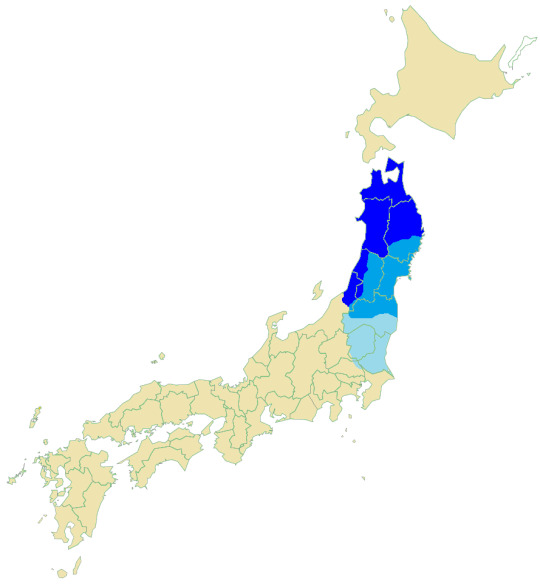
(Map of Touhoku dialects regionally)
I have not been able to find any information re: if Sweden speaks any particular type of Touhoku dialect (or if it is more broad), but I will talk a bit about how his speech was transliterated in early scanlations before moving on to the other two. Because of how slurred/more truncated/less intelligible Touhoku accents generally are (and remember, Den/Nor/Ice did not make their appearance until well after Swe/Fin did!), likely early translators decided to chop off letters/make Sweden's speech seem less intelligible in order to convey that to readers. Unlike Norway and Denmark, Sweden also often speaks in shorter sentences/phrases in Japanese, and given that Finland canonically says "it's just hard to communicate with him" (see Running Away with Mr. Sve) that is also likely why early Hetalia scanlators before official translations of the comics were available (note: god this is making me feel old as hell) made the decision to give him the speech patterns that they did, and that ended up spreading through the fandom. When the other Nordics with their regional dialects dropped, given how Sweden’s vocal trait got translated into English and then fandom ran with it to varying degrees of intelligibility, I think the decision was made to not translate Norway the same way to cause less trouble in fanworks, while the Ibaraki dialect did influence how Denmark was translated (more on that below.

Norway speaks in a very particular Touhoku-family dialect within the series that is generally not well-reflected outside of the source material at all. The Tsugaru dialect is spoken in the northwest part of the country, specifically in the western part of Aomori Prefecture — Tsugaru dialect is a particularly unusual dialect, even by Japanese dialect standards, by being one of the most difficult dialects in Japan to understand (source). Even within Japan itself, people speaking this dialect often have to be subtitled on television for other Japanese audiences to understand, and there have been occasions where the dialect has been displayed on television to marvel at how strange and unintelligible it sounds to other Japanese speakers. Sometimes speakers of this dialect have been characterized (or mischaracterized for comedic effect) as French in Japanese because the odd sound and unintelligability of the dialect (source). Kumagi (2011) also states that "[...] within the Tohoku [alternate transliteration of Touhoku] dialects, Aomori [prefecture in which Tsugaru is spoken] dialect is at the bottom [of the hierarchy]," meaning that even among the already disrespected Touhoku dialects, Tsugaru belongs to the worst of the bunch in terms of reputability and respectability in Japanese perceptions. The Tsugaru dialect is a source of fascination, comedy, and disrepute/low standing all at the same time.
While we don’t know why Hima selected Norway to have this dialect, I have a few proposals. First, this gives him a similar flavor to the other members of the Viking Trio while keeping him distinct — while Ibaraki is a more southern dialect geographically (for the region), Tsugaru is spoken both more north and more west than it. So if you map their dialects out on a map, their geographical location to each other also somewhat resembles their actual locations as nations to each other in the Nordics! Which is neat!
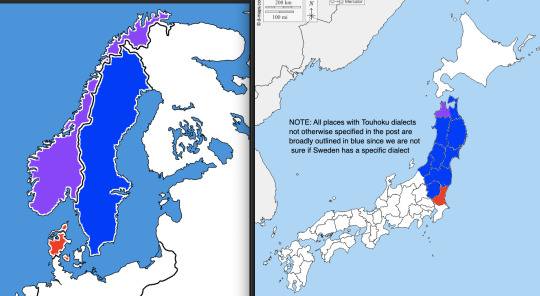
Second, Hima characterizes Norway has being slightly otherworldly and unusual largely due to his fairy-friends and such. But I also think that he likely chose Tsugaru for him not only because that makes him seem like he’s out of this world, but also because Japan is kind of fascinated by that dialect in particular despite not holding it in high regards by it too — sure, it is a hick accent, but it is an interesting hick accent. I think the fact that Japanese speakers sometimes liken the dialect to French is interesting specifically because of how Japanese people often view the French — French culture something that is often romanticized and idealized, and given how Tsugaru dialect can sound French-ish to Japanese speakers, that may be why Norway is kind of designed as the “pretty boy” of the trio by the fandom? In the same way that “Paris Syndrome” is a thing, where Japanese who go to France are often shocked at how their idealized version of France does not live up to the realities of the country (trust me it's real there is a wikipedia page lol), I think you can argue that in-universe Norway can be seen in a lot of different ways depending on the preconceived notions of how you view the dialect. If you view it as French-like and think it sounds interesting, you may find it alluring/beautiful. If you think it is crass, you'll look at it with disdain and disgust. If you think it just sounds silly and stupid, it is. If you think it is nostalgic (as Kumagi states that this is the only positive association this dialect has) and has a close association with nature/pastoral life because of that, it is. I think Norway in canon is characterized on all four of those axioms at the same time (if you really wanna pull canon receipts I will at another time) which makes this make a lot of sense to me as to why that dialect was chosen for him.
Third, I think that given Norway was largely the worst off of the three kingdoms for most of history, it makes sense to give him the worst accent in terms of reputation/status out of all of them, too.
Note: specifically, re: how Norway uses "brother" in Japanese is also interesting when referring to Denmark. What he is saying is "anko" (あんこ), which literally means "young man/eldest son" directly translated and is specifically only used to mean that in northern Japanese dialects. A good way to put it is it is like people in the U.S. use "bro" as a catch-all term for a similar-aged guy you are trying to get the attention of kind of informally, in the same way you can say "nii-san" to both mean "older brother" and also "guy who seems older than me I am addressing informally" I guess?? Funnily enough, which I didn't know until researching shit, it apparently also means bottom (homosexual) in prison slang??? Which may or may not be intentional I guess on Hima's part, and could also influence your characterization of Norway as a result.
Finally we move on to Denmark. The Ibaraki dialect is characterized by number of things, but for our purposes I think that the two most important traits are the general lack of polite speech and the slightly faster rate of speech (unfortunately, my only written sources I can point to are wikipedia and TV tropes again, but I have heard this orally from someone a long time ago - I looked for more credible sources but couldn't find any easily). Because of it being debated as to whether or not is a true Touhoku dialect or if it is actually a Kantou (more southern/eastern) dialect, I think you can also argue that makes sense given Denmark is kind of the "gateway" into the heart of Europe geographically. People have generally translated this as him being excitable and more casual in the way he communicates to other people. I have been able to find less resources on this particular dialect and how it is perceived culturally, so I will sadly have to leave it at that, but from my understanding he is generally translated appropriately in the manga from what I have seen, with the -in' instead of -ing and ya instead of you to have it seem more relaxed/familiar/casual.
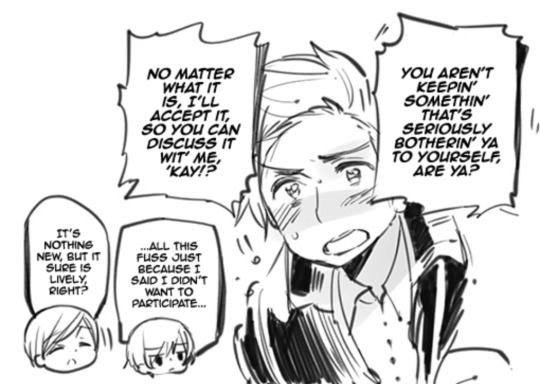
Final notes on Finland and Iceland:
I cannot confirm this personally, but from what I can hear from Finland, it sounds like he speaks pretty standard Japanese to me, but take that with a grain of salt since I am not the expert here. Which, dialect-wise, places him as the odd person out (which fits with Finnish being the linguistic outgroup of the five) and also puts him as the relatable “stand in” for Japanese people learning about the Nordics — reminder he is the one who introduces them all in that one comic (see The Nordic 5+a) and even earlier comics (see Running Away with Mr. Sve), and we’re viewing the Nordics from largely his perspective). Since Finland in this series is largely characterized (and often deemed a poor stereotype by Finns) because of the Japanese perspective on Finland/Finns, it makes a lot of sense Hima used him kind of as a self-insert for Japanese readers/viewers to understand the Nordics from, as of the Nordic nations, Japanese folks are likely going to have the strongest familiarity/connection to Finland because of the Moomins.
Please take the following information about Iceland with heaping grains of salt, but from a memory, I believe he also speaks the Tsugaru dialect, at least some of the time???? This makes sense he shares the Tsugaru dialect with Norway, as he’s Norway’s in-canon sibling, but I have a vague memory of a meta post I cannot 100% confirm or deny exists re: him only speaking the dialect/the dialect coming out more when he’s alone?? This following is speculation since I cannot confirm/deny that right now with my current abilities, but if it is true, would also be an interesting level to his character and make sense — it puts further distance between him and Norway if he purpsefully doesn’t speak the same way as his brother when his brother is present, and it also is reminiscent of my own experience living with people with discriminated accents who then mask their “less desirable” dialects in their teens/20s so they don’t get discriminated against as they move up in the world. Kumagi (2011) states that "Therefore, young female native speakers of Tohoku [alternate transliteration] dialects feel ashamed of their dialects and hesitate to speak them in big cities such as Tokyo. They are made to feel inferiority complex about their dialects, which are stigmatized as unfeminine".
Since Iceland is very much characterized as a teen in canon, I think that this makes sense to do in the broader context of Hima’s choices. The specific reason as to why I state that I believe he speaks Tsugaru some of the time but not always is because there are some panels he speaks without it and some where he does seem to have an accent (HWS Chapter 112, relevant screencap below, this is the only time he speaks like this from what I can find in scanlations/translations, but it has to be a deliberate choice). Would love more info on this from someone who knows more about Japanese than I can do.
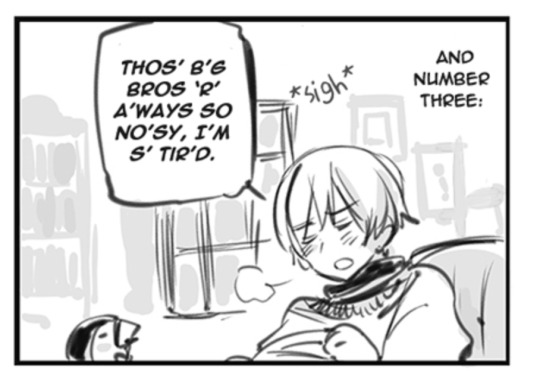
Again, please check the original post and/or notes for any future additions that I will add/edit accordingly (with notes as to where/when that happened) if any other relevant information surfaces, but I hope that was at least a little informative and interesting to read.
I consulted a bunch of other resources too (read a bunch of papers I could find online), but a lot of those I read several months ago and no longer can find :x otherwise I would list them here.
Let me know if there are any typos/things are unclear, b/c holy shit this took a lot more effort and time for me to write up than I thought it was going to, and I am too tired to proofread it after spending several days on it. X_X
#hws norway#hws denmark#hws sweden#hws nordics#aph nordics#hws iceland#hws finland#pyrrhocorax meta#just so it is easier to find again :/a#anyway i hope this is interesting at least. idk how this fandom tags stuff anymore
102 notes
·
View notes
Text
Thought I ought to bring this over here for the Tumblr crew since it’s making a little buzz in the other place and I want to gather all my thoughts in one place.
So, back in 2022 I was in my feelings about Izuku (when am I not?) and wrote the following little sad headcanon on twt:
Made myself sad thinking about how the original Japanese word for Quirk is ‘kosei’, which means ‘individuality’ or the unique part of a personality. It’s no wonder Deku thought he was plain and useless. Everyone has literally been telling him since he was 4. 😓 Like, there’s no way at that age he could separate people talking about his lack of meta-ability from his own unique value as a person when they’re using the same damn word. That’s the kind of stuff that’s going to stick with you. 🥺
Sad to imagine, eh?
Fast forward to 2024 and chapter 412, and as always, I was browsing the jp fandom tweets for reactions after the official release. They often pick up on things we miss like Katsuki’s childlike language, the NTR implications of the kudoichi plot etc.
As I scrolled, I realised there was a HUGE disconnect between what we in “The West” were experiencing (mostly rage at yet another translation ‘choice’) and the existential questioning that was occurring among Japanese readers.
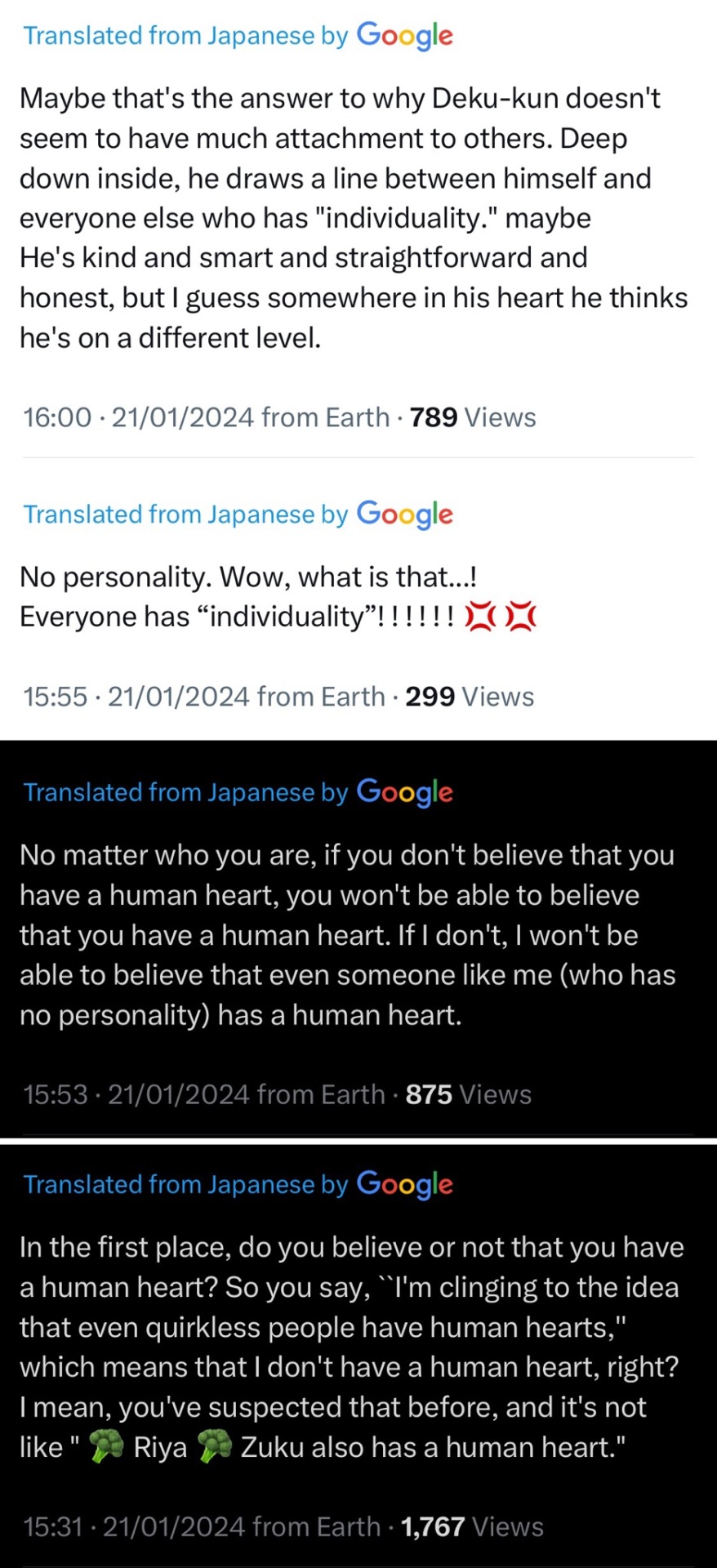
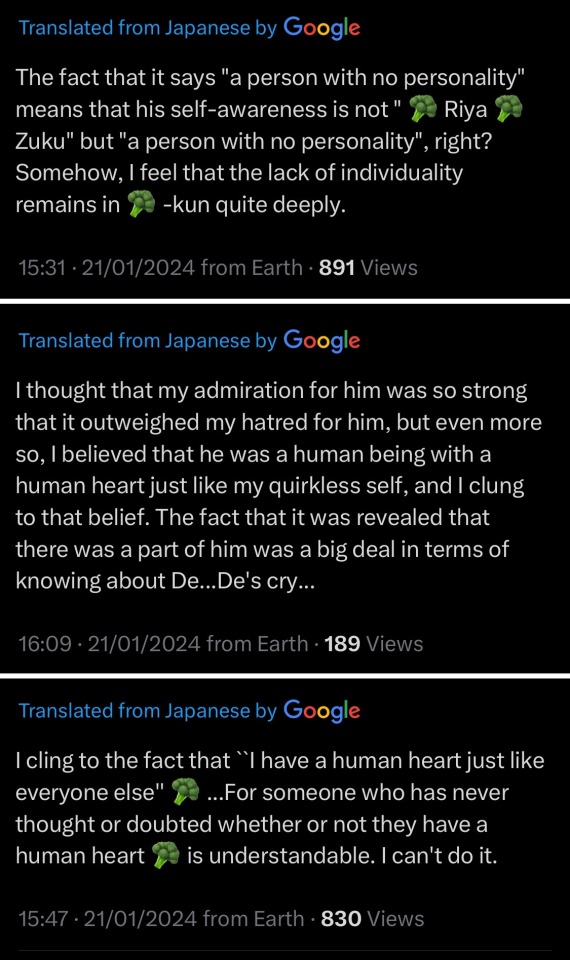
This is just a tiny glimpse, but you should know that every single one I saw was doing the tweet equivalent of staring into the middle distance with a haunted look.
It’s all about the panel below, which was mentioned by the incomparable Pikahlua, as it is unusual in writing ‘mukosei’ without the speechmarks that signify ‘quirkless’ (to use the English term) rather than ‘lacking individuality’.
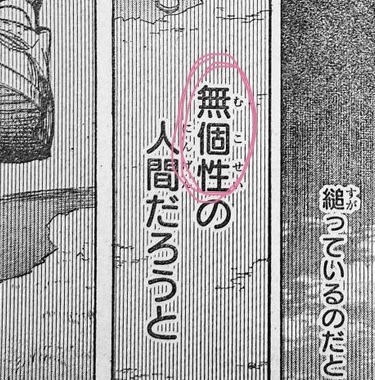
Horikoshi always uses speechmarks around “Kosei” when talking about quirks, so the implication here is that Izuku never believed he had actual individuality/personality.
Using this interpretation, Kudou observed that Izuku held the hope that even people who were detestable (Katsuki) and those who had no individuality (Izuku) still had human hearts.
Read that again. Izuku hoped that both he and Kacchan, despite their shortcomings, had human hearts. He thinks his only worth is as a vessel, a holder of OFA, and without that he’s barely human.
Ever noticed how some parts of the fandom complain that Deku is a boring MC, that he’s just ‘nice’, and we never get his opinions on things? Yeah.
Remember how hard he cried when All Might said he could be a hero? That was the first time in his life that someone acknowledged him as someone with potential, with worth. (In ch2 he also says “I have no reason to refuse!!” when offered OFA, which always struck me as slightly anticlimactic but makes way more sense now).
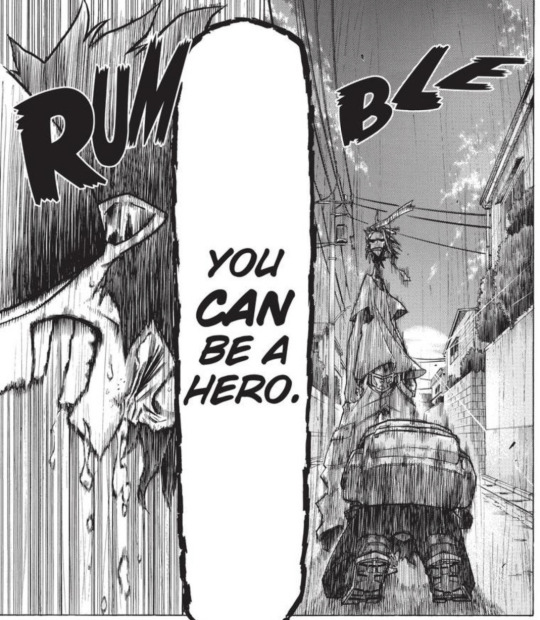
And remember how he cried in a similar way when Ochako told the world that he wasn’t special but that he had a special power? She couldn’t have known she was reinforcing his deepest held insecurity, and for a moment his mask slipped. Or maybe he was touched by her assertion that he was just a ‘regular high school kid’? We don’t know, but it’s worth taking a look at these moments in this new light.
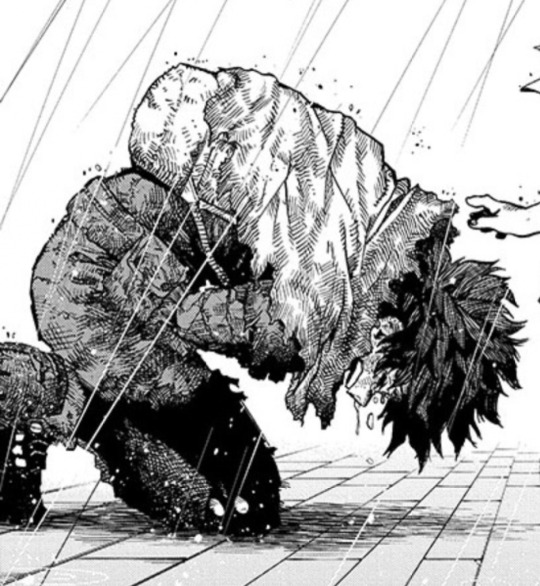
You staring into the middle distance with a haunted look too yet? I know I am.
If you’re interested in the bright side (I needed this, I hope it helps):
Narratively speaking, this is the angst section that will lead to Midoriya Izuku: Rising and the happy ending they all deserve.
And the person most likely to disavow him of this sense of inherent worthlessness is the one person who added to it the most in their childhoods.
✨KACCHAN!!✨
No one else can reassure Izuku that he is special, that he’s worthwhile and—crucially—that he always has been, because he’s the only one who knew that all along.

If you need more reassurance, remember that their Origin and Rising chapters so far have all involved each other and have mirrored the emotional journey they’re both on.
Bakugou Katsuki: Origin: Katsuki struggles to accept Izuku and work as a team to battle All Might. Eventually does the bare minimum to cooperate by lending him his gauntlet.

Bakugou Katsuki: Rising: Katsuki coordinates the pro heroes and sacrifices himself to save Izuku. His body ‘moved on its own.’
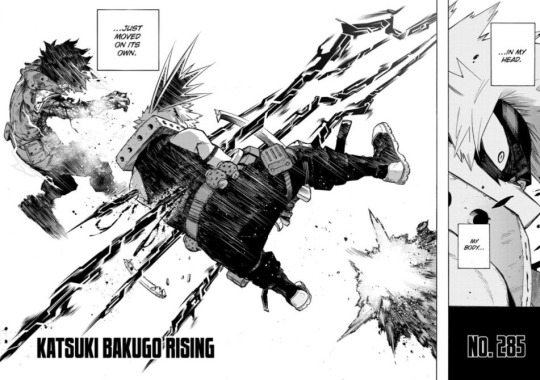
Midoriya Izuku: Origin: Izuku is bullied by Katsuki, tries to save Katsuki from a villain—his body ‘moved on its own’, and is consequently told he can be a hero by All Might.

It isn’t a reach at all to pretty safely assume that Izuku’s Rising chapter will also be intrinsically linked to Katsuki, and it is his cooperation, faith and love (however you interpret it) that will finally save Izuku from his own sense of worthlessness. Closing the circle.
So yeah, this bit could be rough for the next few chapters, but I have faith that Horikoshi will wrap it up in a way that will be so rewarding and satisfying.
I’m gonna stop now because I’m ill and I need to rest my head, thanks for reading! 😮💨
#mha 412#deku#please someone hug this boy asap#midoriya izuku#bakugou#mha#bnha#bkdk#bakudeku#bkdk canon#Pyj obsesses#my head hurts
124 notes
·
View notes
Text
What My Father Wanted was to Kill God: Reflecting on the cycle of Rebuild of Evangelion

It's been two years now, since Evangelion 3.0+1.0 hit Japanese cinemas for the first time.
I think many of us chose to say goodbye to Eva on that day, too, leaving satisfied. I can't fault anyone for this. But there's a part of me that stings knowing that 3.0+1.0 has been left relatively un-combed-through in comparison to the other films, and I don't feel right leaving it this way.
Today, I want to dissect "loop theory" - what it was before 3.0+1.0 came out, in what ways we missed the mark back then, and finally, what the resolution of 3.0+1.0 meant for the story.
I want to understand what it meant to kill God.
This article was heavily inspired by "What was loop theory? Investigating the truth after Evangelion 3.0+1.0", by Japanese fan-channel Eva Fan.
If you want to understand the meta angle of Rebuild better (i.e. "why does Rebuild even exist in the first place?"), please watch the NHK Professional documentary on Anno and the production of 3.0+1.0 (not "The Final Challenge of Evangelion" version on Amazon, although you should watch this one too because they're both great.) The meta of Rebuild is outside the scope of this article.
SECTION 1: WHAT WAS LOOP THEORY?
If you're already familiar with the basis of loop theory, you can probably skip this section and head to section 2. This is gonna be a lot of recap.
I, for one, have never been a huge fan of the idea of "loop theory". This isn't to say that I've ever disagreed with the conclusion that Rebuild's world is stuck in a loop, more that I felt like painting it as a "theory" is seeding more ground to bad faith actors in the fandom than necessary.
However, I'm using the term here to refer generally to different theories about the loops, namely those regarding Kaworu and potential connections with End of Eva.
Now that all of the disclaimers are out of the way...
ESTABLISHING OUR BASES, PART 1: THE MESSENGER
From the moment he's introduced, Kaworu's entire purpose in the first two films seems to be establishing the loop to the audience.
His familiarity with previous versions of Shinji is front and centre in the very first line he speaks.
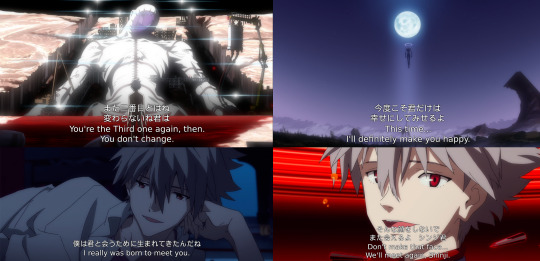
Some relevant lines from Kaworu in 1.0, 2.0 and 3.0. Full sized image here.
While at this stage, we lack information on how much Kaworu knows, we are at least aware of his knowledge of previous iterations of the Eva world in that first line there: "The Third one again".
This is compounded at the very end of 2.0, in which he declares that "this time" (as opposed to previous times, presumably failed attempts), he will make Shinji happy.
In 3.0, there's a moment in which he seems to confirm to himself his musing in NGE of having been "born to meet" Shinji (notice the lack of のかもしれな��� "probably"), and following some more ambiguous lines we'll skip over, at the end of a long speech about parts of ourselves remaining in the world even after we're gone, he suggests he and Shinji will see each other again just before he dies.
These lines lead some fans to believe that the loops were in some way or another, under Kaworu's control. This iteration of loop theory suggested that the loops exist so that Kaworu, who remembers the events of NGE, can achieve his goal of "making Shinji happy".
ESTABLISHING OUR BASES, PART 2: THE RED SEA
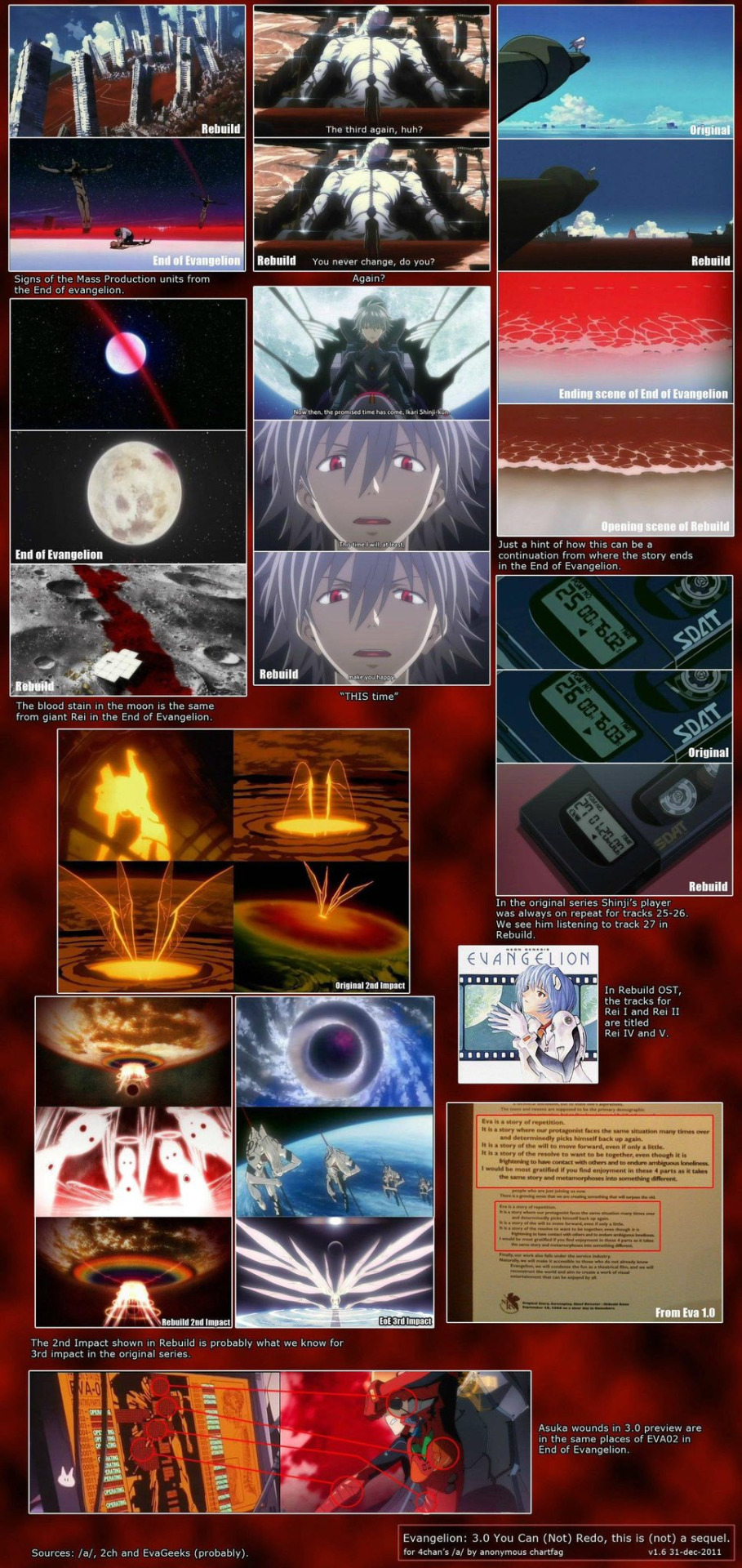
Non-exhaustive chart of potential connections between Rebuild and NGE/EOE, compiled by users on /a/ board in 2011. Full sized image here.
There are several environmental aspects of Rebuild's world that seemed to suggest a connection to The End of Evangelion, most obvious amongst these being the red sea.
As Kaji explains in 2.0, the seas were blue prior to Second Impact. Flashbacks to this event reveal that it bore slightly more in common with EOE's Third Impact than NGE's Second; note the presence of the Black Moon in the comparison above.
Early on in 1.0, there's a shot that shows cross-shaped white outlines in the red sea, that appear to be remnants of EOE's crucified mass production units.
The moon in Rebuild also has a large, red streak on its surface, that could be the bloodstain that was left there by Lilith in EOE.
Additionally, Shinji's SDAT in NGE always looped the same two songs, shown under the track numbers 25 and 26. In Rebuild, Shinji's SDAT's track number begins at 27, and goes up from there (it seems to represent the relationships he forms with other people).
Some iterations of loop theory suggested that Rebuild was set directly after End of Eva, and that the events of Second Impact as remembered by the cast were actually EOE's Third Impact.
Additionally, though its relevance to any canonical NGE content is tenuous (tenuous, but not irrelevant when it comes to Rebuild; see the bonus chapter), Sadamoto's NGE manga also ends with a kind of timeloop.
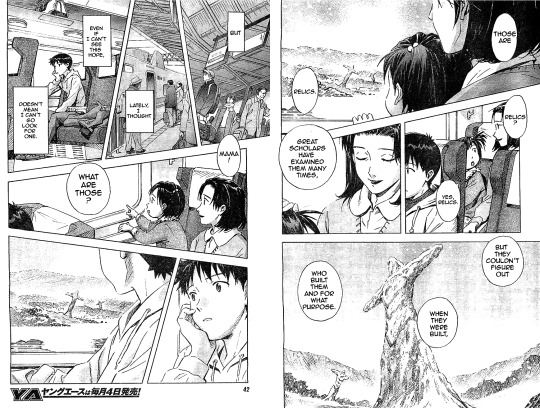
From the epilogue chapter of Yoshiyuki Sadamoto's Neon Genesis Evangelion manga. Full sized image here.
After Instrumentality, the epilogue flashes forward to a long time in the future, where the crucified Evas are seen as some kind of relic from an unknown time.
We see Shinji, Asuka and Kensuke reincarnated, and Shinji and Asuka meet for the first time, with some sense that they've seen each other before.
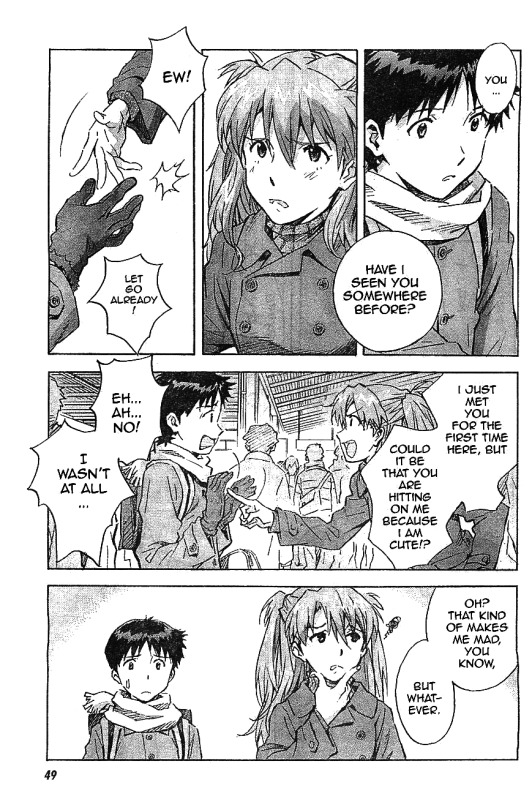
Full sized image here.
This ending could be seen as an explanation of sorts of what's going on in Rebuild; the characters have been reincarnated a long time after the fact, while elements of the old world remain as part of the environment.
ESTABLISHING OUR BASES, PART 3: DOUBT
It should go without saying that, even at the time, these particular conclusions had holes in them. (This is to say nothing of the hundreds of other iterations of loop theory; if we went through every whacky headcanon explanation people posted on Reddit under the guise of it being any kind of genuine theorization, we'd be here all day)
Sequel Theory, especially past 3.0, required you to ignore contradictory information being presented in the same scenes the evidence being drawn on was. The comparison image I included earlier (it pre-dates 3.0's release, but was certainly spread around long after the fact) suggests that the Four Adams as they appear in 2.0's flashback could have been the Mass Production Evas (of which there are 8, not 4!). Two of the lines from Kaworu it included also don't support this line of reasoning; both "This time..." and "You don't change" imply multiple previous loops, not a singular. And while we haven't mentioned them so far, the coffin he emerges from in 1.0 being one of several was also something people were aware of back then.
Speaking of Kaworu - Shinji's Happiness Theory doesn't seem to line up with the way he goes out in NGE, either. He asks Shinji to kill him with the goal of achieving true freedom; it doesn't seem like he's looking for a next time, but rather an ending, away from his destiny as an angel. It doesn't really follow that Rebuild's loops would be a journey he'd set himself on willingly, rather a circumstance he's put into by some other force.
SECTION 2: PAYOFF
3.0+1.0 responds to the foreshadowing of previous entries in a way that's kind of inconclusive, on its face. I'm going to save the potential answers for the next section; for now, let's just go over the information we did get, including some things you may have missed.
PAYOFF, PART 1: OUT IN THE OPEN
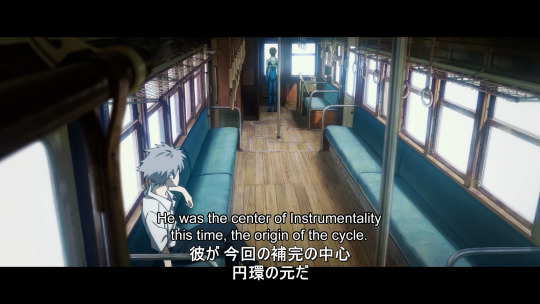
Kaworu describes Gendo as being the origin of the cycle. Full sized image here.
Our first piece of confirmation, and first in-universe mention of the loops (or "cycle"/"circle"), is this line. "Gendo was the center of Instrumentality this time", the "this time" implying there have been other Instrumentalities with other person/s at the center. "Origin of the cycle" may indicate that Gendo is in control of the loops as a whole, or it may instead indicate that different people start them, perhaps through Instrumentality.

Asuka wakes up on the beach. Full sized image here.
After coming to terms with her feelings, Asuka "wakes up" in the same spot she was lying at the end of EOE, wondering if she was asleep. This is still in the anti-universe, but as was established by Gendo earlier on in the film, the Evangelion Imaginary and the anti-universe as a whole manifest as parts of one's memory. Asuka is our POV character for this section with her, so she must recall having been here. Maybe you could interpret "was I asleep?" as Soryu, specifically, having woken up.

Selections from Kaworu's Instrumentality. Full sized image here.
Anything that focused on Kaworu here was always going to be the juiciest in relation to the loops, but it's surprisingly upfront even then: There have been multiple previous loops, and Kaworu is not in control of them, he just continues to exist without agency over them like all of the other key players do. (That's both of our aforementioned Theories disproven in one scene!)

Kaworu introduces the "Book of Life", Kaji clarifies the details. Full sized image here.
We're also introduced to a new concept here, the "Book of Life". There's very limited information on what this does, but at least Kaji is here to fill in some details Kaworu conveniently leaves out, as he likes to do (that, if nothing else, Shinji and him meeting over and over again is something Kaworu has power over.)
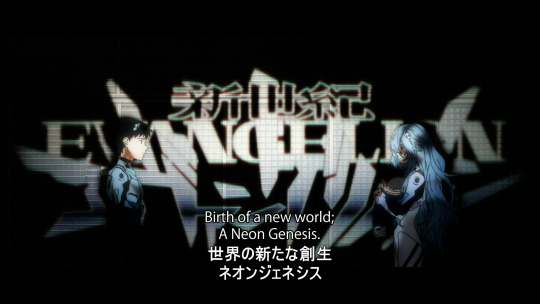
Rei and Shinji discuss the birth of a new world. Full sized image here.
Most of Rei's instrumentality scene exists to wrap up the other aspect of Rebuild's narrative we're not talking about here, so I'll skip past all of that to this: with Unit-01 and the Spear of Gaius, Shinji is capable of creating a new world, through a power known as Neon Genesis. It may be worth noting that Shinji has to clarify that he isn't going to rewind time or revert the world, just create a new one on top of the existing. This may establish a precedent for characters in control of Instrumentality being able to do both of those things.
PAYOFF, PART 2: A CLOSER LOOK
NGE has a LOT of references to the years its set in. Even beyond the on-screen text, there's plenty of instances of plaques and other signs with the 2015 date on them. Rebuild, however...

Yui's grave as it appears in 2.0. Full sized image here.
The only time we ever see a date in the first three films is here, on Yui's gravestone in 2.0. It's partially obscured by flowers, and may appear at first to read the same as her NGE grave did. On closer inspection, though, you can clearly see there's a 0 in front of 2004.
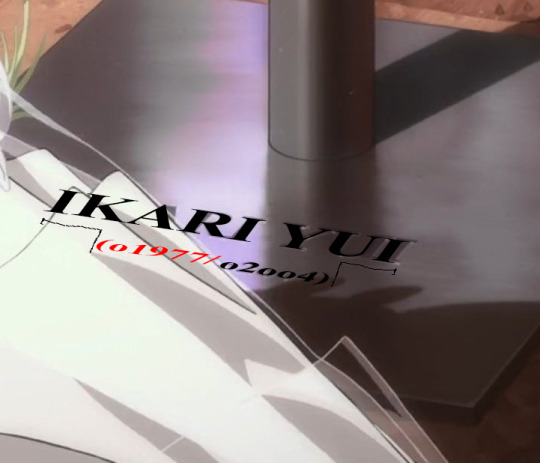
This could be what the gravestone has written on it. Full sized image here.
One time could mean anything, but it becomes a pattern when we see more dates in 3.0+1.0...
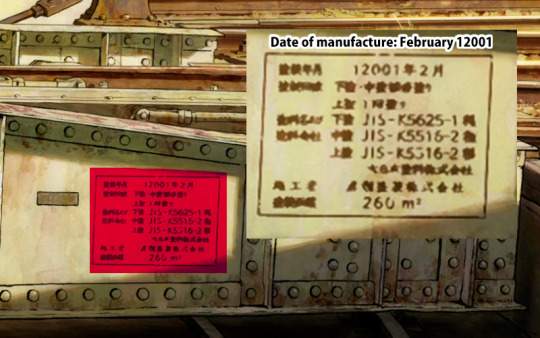
The manufacture information on the railway track turntable in Village-3. Full sized image here.

The plaque on the AAA Wunder. Full sized image here.
Looking at that date given on the railway turntable, the earliest date 3.0+1.0 could take place is the year 12001.
This, combined with the physical evidence present in the first two films, seems to imply that Rebuild follows the same rules established in the Sadamoto manga, that the loop isn't necessarily a reset of the world, but rather a continuous stream of time in which the characters are reincarnated. It makes sense Sadamoto would use this as the basis for his ending, too - he worked on the first two films, and the Mari bonus chapter clearly demonstrates that certain aspects of Rebuild were solidified during their production.
Furthermore, the scene in which Shinji asks Gendo what he wishes for has more visual references to EOE than you might think...

Gendo grasps his right arm, as if he remembers the time he lost it. Full sized image here.
The arm thing is obvious, and the line he says there could be about EOE, but you might notice something else in that image on the left there. There's a picture of Shinji in the background.
That image comes from one of the flashing sequences in EOE's Third Impact, in fact, the entire sequence is overlaid on top of that shot of Gendo.
This shot in 3.0+1.0 versus the same sequence in EOE. The encode of 3+1 I was using was dropping frames here, so I had to cut some of it out. Video mirror here.
By the way, adult Asuka's official name, as used in every piece of merchandising she's been in so far, is just "Asuka Langley", not "Asuka Langley Shikinami" or "Asuka Langley Soryu".

Good Smile Company's "1/7 Scale Figure: Asuka Langley". She has a fair few figures, all of them with this name. Other merchandise never calls regular Asuka this. Full sized image here.

Rei holds a doll of Tsubame. Full sized image here.
The same thing ends up happening with Rei in-universe. The version of her with long hair is clearly Rei from 2.0, who has been inside the entry plug this whole time, but when we see her on the stage, she's holding a baby doll. It has Tsubame (Hikari and Toji's daughter)'s name written on it.
It seems to follow that different versions of the same character end up re-joining into one during instrumentality, be that cross-loop like Soryu and Shikinami, or in-loop, like Rei and Sokkuri (Lookalike). This would appear to go beyond just regaining memories of previous loops, as Rei and Sokkuri existed in the same loop independently of one another.
SECTION 3: A PROPOSAL
And now, to get into the real meat of the issue.
...Whose doing was this, exactly?
Here's the thing: Kaworu, we can already rule out. We know it wasn't him.
The next most likely candidate you might think of is Gendo, but... is he, really? Because Gendo died in EOE (perhaps not physically, but regardless), killed by Yui, but ultimately of his own volition. He had come to terms with himself when he died. He doesn't seem like someone who would have still had unfinished business.
Then, what of Shinji? Well, I think it's the same deal with him, too. Shinji might not have found his place in life at the end of EOE, but he also doesn't seem like he was clamoring to start over, after all of that.
In their video, "What was loop theory? Investigating the truth after Evangelion 3.0+1.0", Japanese Eva fan, Eva Fan (lol), of Minna no Eva Fan fame, gives us a different answer:
It was Yui.

Yui entered the Eva experiment for Shinji's sake. Full sized image here.
Yui's motives in NGE may have been left mostly up to the audiences' interpretation, but I don't think there's any doubt she loved her son more than anything.
As Unit-01, she becomes God at the end of EOE, accepting the burden of being the eternal proof of mankind's existence.
She leaves Shinji behind, knowing that he still hasn't found his place in life.
A PROPOSAL, PART 1: YOU WERE WAITING FOR THIS MOMENT

Yui leaves Shinji as he comes into his own. Full sized image here.
The end point of the loops and emergence into the new world:
Shinji makes the decision to create a world that doesn't need the Eva.
Shinji and Yui, previously one being, separate.
Shinji breaks the curse of the Eva, becoming an adult, and now away from his mother, emerges into the real world.
As explained by Gendo, the anti-universe, the end point of Rebuild's story, is also the beginning, and somewhere Yui, at one point, resided.

The beginning and the end are one in the same. Full sized image here.
The anti-universe is "the one and only place fate may be bent to one's will". Shinji, in his parting words to Yui in EOE, tells her he thinks he'll keep making the same mistakes over and over.
To quote Hideaki Anno: Eva is a story that repeats.
In the aforementioned Eva Fan video, they suggest that the anti-universe may in fact be the world of NGE (perhaps, the world inside of Unit-01). Yui creates a new world through Neon Genesis, one which resembles the old, to tell the story of Shinji anew. To give him another chance to grow.
For as long as Eva is Shinji's story, it is Yui's; her goal was to bring Shinji a bright future, after all.
The act of piloting the Eva sees the child return to the place they resided before birth; back into the comfort of their mother's womb.
In Rebuild, the “mother” seems to become all but irrelevant - Yui Ayanami may reside inside Unit-01 but this is never touched on in the same way; Asuka’s mother doesn’t seem to even exist, and her original seems to reside inside Unit-13. The existence or non-existence of a mother’s soul inside of an Eva dictates nothing about who can synchronize with it (see: Unit-02, Unit-08, Unit-13, etc). However, taking a step back, it’s almost as if the reason why the presence of the “mother” is missing from the material world of Rebuild is because the entire series takes place within the world the mother created.
If Shinji entering the cockpit of an Eva unit in NGE is returning to the womb, then what is Shinji doing by existing in the world of Rebuild?
In deciding to create a world that doesn't need the Eva, Shinji is accepting life without his mother. The parting of mother and son represents the break in the loop.
He emerges into the new world, reborn as an adult.
INTERJECTION: WHAT’S IN A NAME?: YUI IKARI/YUI AYANAMI
Rebuild’s Yui’s name isn’t Yui Ikari (at least, her maiden name isn’t) - It’s Yui Ayanami.
In NGE, Gendo took her surname when they married. In Rebuild, Gendo already had the surname Ikari, and Yui Ayanami took his.
I think fans have been generally puzzled by the purpose of this change, but this interpretation - that Yui Ikari from NGE is the heart of the loop, the God that created the world and the God that Gendo would kill at the end of 3.0+1.0 - would seem to explain why this is the case. She’s Yui Ayanami because she’s a copy - like Rei is - of the original Yui. A Yui created by Yui Ikari.
This also may explain why the date on Yui's grave says "02004" - after all, it's the grave of Yui Ikari, not the grave of Yui Ayanami.
Rei of NGE is more than just a clone of Yui, she also holds a piece of Yui’s soul (in the form of emotional memory), while Yui herself resides in Unit-01. Therefore, it stands to reason that Yui Ayanami is not really an individual, but rather someone who holds a piece of Yui Ikari’s soul - I think even more so than Rei (who undeniably is an individual). Yui Ayanami may function as a kind of messenger for Yui Ikari, who holds the knowledge she has and steers the story in the direction it needs to go. There are many players in Rebuild who are more like symbols than characters, and I think this is a huge part of why Yui Ayanami is not a character like Yui Ikari was.
For the sake of brevity, I’m going to use “Yui Ikari” to refer to Original Yui, and “Yui Ayanami” to refer to Rebuild Yui, unless stated otherwise, for the remainder of this post.
A PROPOSAL, PART 2: ...WERE YOU THERE THE WHOLE TIME?
Kaworu himself wasn't brought into Instrumentality in EOE directly. Rather, the fetus of Adam was, through Rei intaking Gendo's hand. If souls like Rei and Sokkuri are capable of rejoining into one in Instrumentality, I wonder if the presence of Kaworu in Instrumentality can be explained by his soul rejoining with that of the Adam fetus. He definitely appears as Adam there, the same way Rei is Lilith.
Which brings us to this:

Shinji and Gendo upon seeing familiar souls: "Were you there the whole time?". Full sized image here.
Gendo offers Shinji the apology he never got to hear in EOE, and then realizes: Yui's soul was residing in Shinji.
Instrumentality likely reconciled the souls of Yui Ayanami (the individual who became Unit-01 in this timeline) and Yui Ikari (the soul who lived on as God, and in her son), the same way it may have reconciled Kaworu and Adam's.
For as long as Yui's soul resided in Unit-01, and in Shinji, her story was not over. For as long as Shinji was stuck in his loop of making the same mistakes over and over, Eva's story was not over. For as long as the Eva exists, Yui will, and End of Eva leaves Yui there, in space, as the eternal proof mankind existed at all.
If 3.0+1.0 says "goodbye to all of Evangelion", it must be the end of Yui Ikari's story, too.
INTERJECTION: WHAT’S IN A NAME?: “SHIN EVANGELION”
The Japanese title of Evangelion 3.0+1.0: Thrice Upon A Time is シン・エヴァンゲリオン劇場版𝄇, (Romaji: Shin Evangerion Gekijouban𝄇, English: Shin* Evangelion Theatrical Edition𝄇”).
There are three points of interest in this title:
Shin - The use of “Shin” here falls in line with the titles of Hideaki Anno’s other recent films: Shin Godzilla, Shin Ultraman, and the upcoming Shin Kamen Rider. While I’m not really the best person to explain this as I’m not really familiar with the source material, the other Shin films are based pretty heavily on earlier works in their respective franchises (I believe both Shin Godzilla and Shin Ultraman have sequences that are recreations of scenes from the original movie/series). Shin Eva also, obviously, does the same thing with NGE and EOE scenes.
*According to an interview with producer Akihiro Yamauchi on Shin Godzilla, the title of “Shin” was chosen for the film due to the variety of meanings it conveys. In all four titles, it is written ambiguously, and could be read as “new”, “true”, or “God”, amongst other things.
Evangelion - NGE’s title and Rebuild’s title are actually spelled differently. エヴァンゲリオン is the spelling of Evangelion used in NGE, ヱヴァンゲリヲン is the spelling used in Rebuild’s title (not the in-universe machines, for the record). They’re pronounced the same way, but Rebuild’s spelling uses characters that are a little archaic (if you want to get technical, it could be romanized as “Wevangeriwon”; note the use of “wo” instead of “o” just like in Kaworu’s name, and you probably get it.)
Shin Evangelion uses the NGE spelling, not the Rebuild spelling, which makes it sound like “Shin Neon Genesis Evangelion Movies”, not “Fourth Entry in the Rebuild Franchise” (in fact, “Evangelion Gekijouban” comes from Death and Rebirth/End of Eva’s Japanese names). Earlier posters for this film in English gave it the NGE font rather than a Rebuild style logo, which pretty accurately represents how this looks.
The symbol at the end - The symbol at the end of the title, is a symbol that’s used in sheet music. This could be read two ways - “Shin Evangelion Gekijouban: End”, or “Shin Evangelion Gekijouban Repeat”; If you assume 𝄇 is one symbol, then it’s a “repeat” sign (tells the player to repeat a section of the sheet music). If you assume it’s a colon and then a subtitle, then it’s an “end” sign (𝄂, signifies the end of the piece.)
A PROPOSAL, FINAL PART: TO KILL GOD
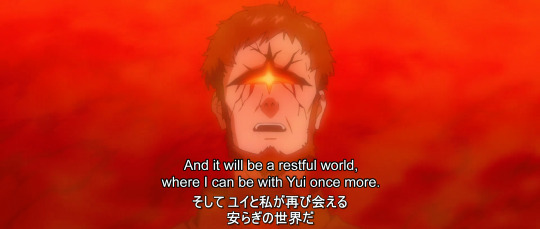
Full sized image here.
Gendo's goal in NGE and Rebuild is the same: To be reunited with Yui.
In Rebuild, he will become God through the use of the Key of Nebuchadnezzar and trigger the Additional Impact with himself at the center, so he can see her again in Instrumentality.
But there's a second aspect to this plan... Killing God.

Gendo lays out his intentions. Full sized image here.
I think it would be naïve of me to suggest that Gendo had any intention of ending things when he said this. These lines obviously pertain to something else (I think all of this is covered in the process of beginning the Additional Impact anyway), and it's made clear that he goes into Instrumentality as stubbornly as he always is.
He fully intended to destroy all of the spears, so nobody would have any way of manipulating or ending Instrumentality, so he could live peacefully with Yui for the rest of time.
Whatever it might have meant there... "Killing God" takes on a completely different meaning by the end of the film.
Yui Ikari is an existence that will live on indefinitely; someone who will never die, even long after humanity is gone. In becoming Unit-01, she alone will wait in the universe forever.
She once resided in the anti-universe; the Promised Land, the one and only place fate may be bent to one's will; she created the world of Rebuild of Evangelion, the beginning of everything.
Yui did all of this to give her son a better life. To let him try over and over again until he broke the curse of the Eva, and emerged into a brighter future.
She, Unit-01, Evangelion as a whole, could not rest until Shinji grew into his own.
Gendo comes to the conclusion during Instrumentality, after bleeding his heart out to his son, that he isn't any closer to reuniting with her.
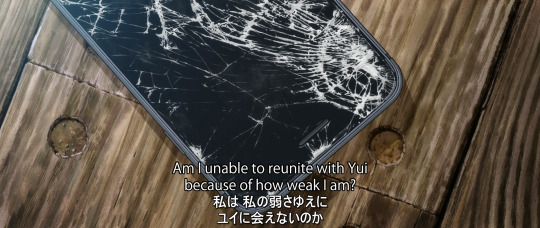
Full sized image here.
But after acknowledging Shinji's adulthood, accepting his own fragility, and resolving their story...

Full sized image here.

Full sized image here.
...He realizes she was right in front of him this whole time.
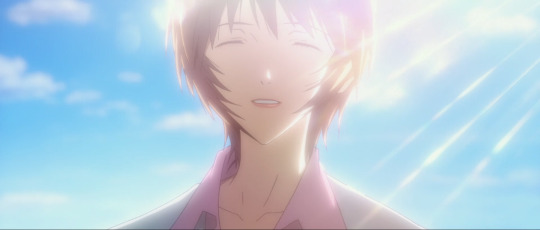
Full sized image here.
With this, Gendo exits the train - the same train his story began, the train station he abandoned Shinji at all of those years ago - his story is over. He no longer seeks eternal life with Yui.
As Shinji breaks his own curse of Eva and is reborn out of the comfort of his mother's world, and into a world of his own creation, he says goodbye to all Evangelion.

Full sized image here.
Gendo, in peace at the end of his own long journey, is willing to let Yui sleep.
And so, he kills God.
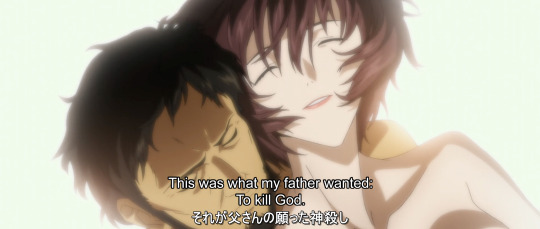
Full sized image here.
#evangelion#rebuild of evangelion#neon genesis evangelion#analysis#yui ikari#gendo ikari#shinji ikari#kaworu nagisa#yui ayanami#evangelion 3.0+1.0#shin evangelion#shin eva#nge#eva#loop theory
532 notes
·
View notes
Text
The Villains (specifically the Lov) Are Right
Especially about the civilians in Bnha
(2 Part Meta Civilians and Lov) (Warning spoilers and long Meta Post) (Permission given to re-blog)
The Lov, specifically the core League of Villains, don’t owe any consideration, atonement or apologies to the civilians in Bnha. Because since long before the Lov had even become villains, even when they were still children, the civilians decided that they don’t owe them anything at all.
Most people I’ve seen in the fandom say something like “I don’t justify or excuse the villain’s actions.”, when it comes to the destructive/murderous parts of the villain’s deeds, which is very nice and moral of them to say.
But as long as we’re talking about the average Bnha civilian, I definitely justify/excuse the Lov’s actions.
Because the “innocent” people in Bnha are awful.
Part 1 The Civilians
That’s not even an opinion really but rather a fact that’s been presented to us clearly, over and over again, in Bnha’s story.
That’s partially why I believe that, even at their worst, the Lov are still worth more than most of the civilians that we’ve been shown so far.
See Past the Labels
“Heroes”, “Villains”, “Innocent People”. All labels that are used frequently over the course of Bnha, but seeing past these, looking beyond what we’re told by the story and instead seeing what we are shown by the story, that’s where the truth is in what these characters are and the effects their actions have on each other.
In Hero stories, saving the innocent/civilians is pretty much a guarantee at any point in time, it’s a prerequisite.
Where in most of those fiction, the civilians (or any large social group of innocents) are shown to definitely be people that should be saved, that it would be a tragedy if even some of them died, no matter the numbers.
But that’s not the case here, because the civilians in bnha aren’t like what you’d normally find in a hero tale, so much so that they’re nearly incomparable to any other series’ “Innocents”.
Looking at them as a whole, they’re more like what you’d find in a horror story.
Starting with one of the largest by the numbers examples:
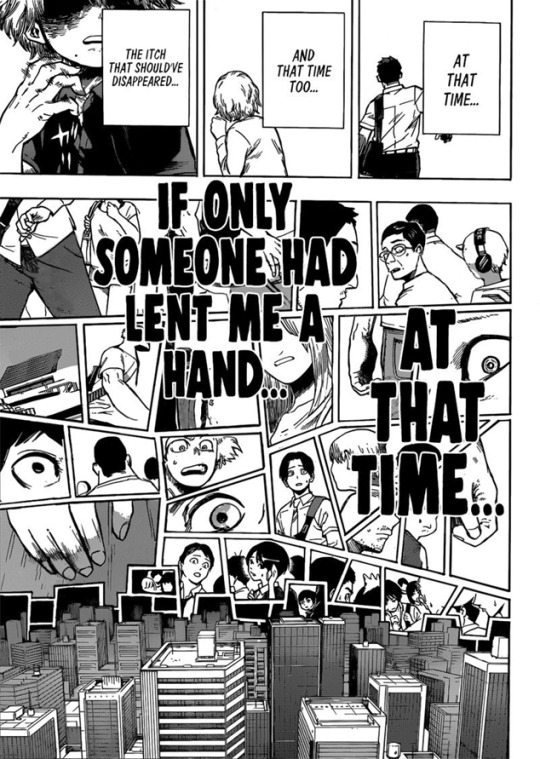
They’re personifications of the bystander effect/syndrome, taken to the highest degree.
A truth that’s sometimes overlooked is that, while All for One and the Shimura family played a part in making Tenko Shimura the Tomura Shigaraki that he is today, so did all the civilians above. If even a single one of them had tried to help the child that would become the most dangerous villain, no matter how that would have turned out, the person Shigaraki is now would be different, maybe entirely.
Even just one true attempt to aid the scary looking child, instead of leaving it to the heroes who weren’t there, would have made a lasting impact. Just like the civilians choosing not to lift a finger to help left a lasting impact on Shigaraki in the present.
They condemn people for things that aren’t their fault, even when the individual hasn’t done anything wrong:
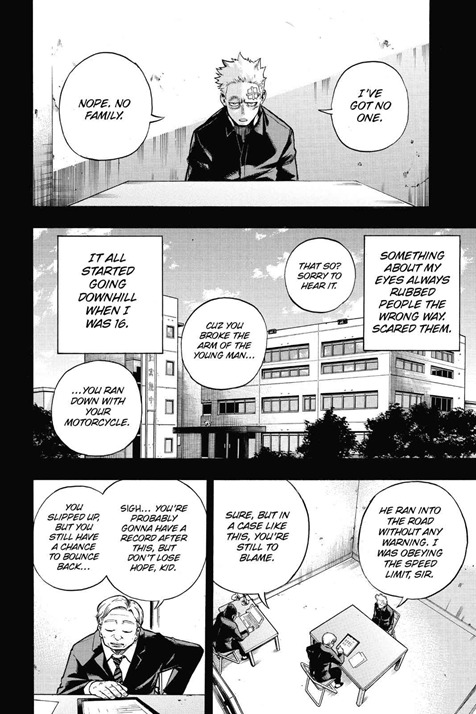
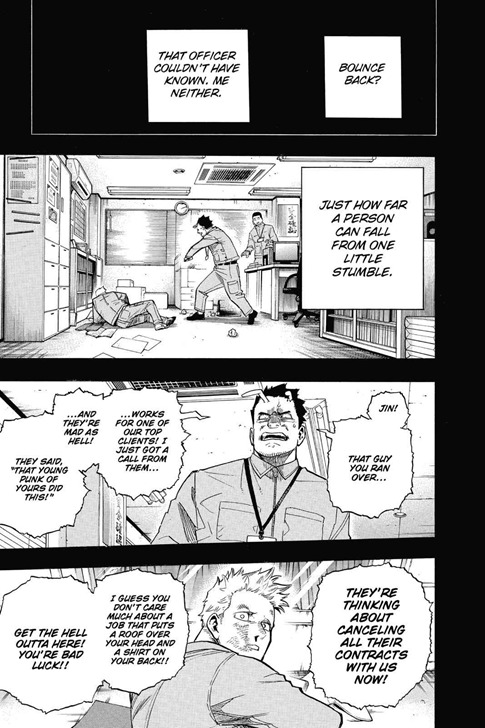
These are pretty self-explanatory in the point, but these aren’t just examples of ‘bad luck’, they showcase a callous legal system and civilians willing to throw a 16 year old kid under the bus for something that was in no way his ‘stumble’ or fault.
(First Side Point: Twice didn’t turn to a life of villainy because it was his “choice”. There’s been zero evidence of any social help for victims of hero society’s circumstances, so there’s no reason to assume that Twice had any help in supporting himself after his parents died. Twice then getting fired from his low level Job and having a glaring blemish on his record (as shown above ^) was a death sentence for a normal life right then and there, especially considering the setting in hero society (Japanese culture taken to its most socially merciless), it doesn’t really need to be spelled out any more than that why he turned to a life of crime against a society that screwed him over at every level and left him to rot. Between becoming a tragic statistic that the hero state didn’t (and still doesn’t) care about or becoming a villain for the chance at having some kind of life, it’s not really a choice at all. The saying ‘Cool motive still Murder’ comes up sometimes when taking about specific villains in Bnha and my response to that would be: ‘Then Suffer and Die Nobly.’ There is no ‘being better’ because if they were better in their current circumstances, they’d just quickly become a statistic.)
They’d rather someone, even their own children; suffer in silence than be seen as anything but their “normal”:
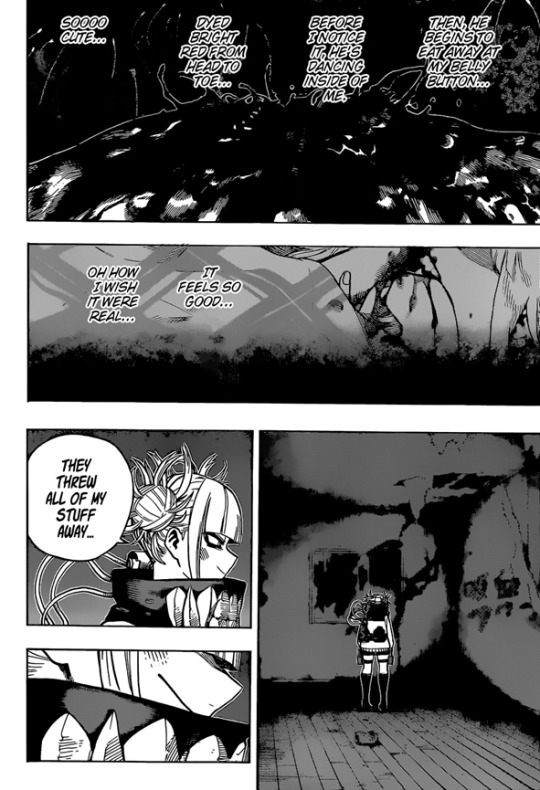
Toga’s parents might seem like a more ‘personal’ point but they’re actually a prime example of the standard bnha civilian, caring nothing about their own suffering young and only about their own lives and normalcy. Even when Toga was obviously self-harming due to her quirk, something that couldn’t logically have been hidden from them, there was no real attempts to help her with this other than rejection (as evident by the parents stopping taking her height down on the wall when her quirk presumably manifested, clearly meant to be a hint that it was the point that they stopped caring about her) and sending her to “Quirk Counseling”, taking no responsibility in helping their child and taking none after Toga was broken under the weight of what was normal after struggling to hold back for so many years.
This mentality extends past Toga’s parents to most of bnha’s civilians.
When Dabi revealed himself as Toya and exposed the Todoroki family’s past the world, nobody cared. At least not in any way that could be considered ‘caring’.
Endeavor bought and bred his wife, and it’s very debatable whether or not the later ‘child making’ could be considered consensual.
Rei told endeavor that it was “too much” and “too cruel”, all but saying that she didn’t want to have any more children, and in the anime it’s played even more clearly:
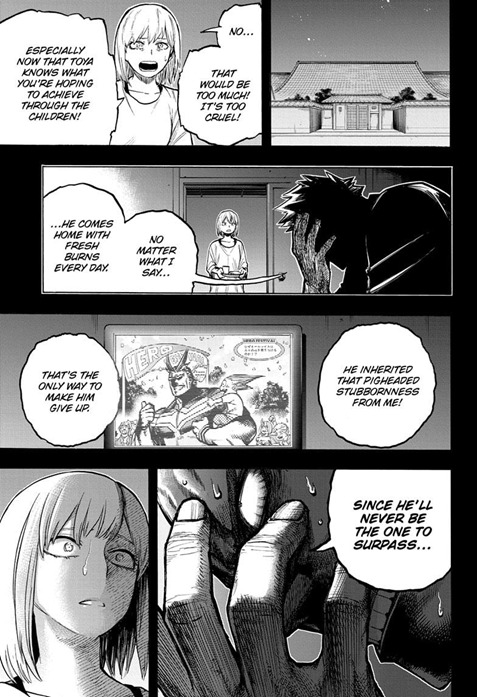

This ^ does not seem like consent.
Also letting his first born son burn himself to his apparent death because he couldn’t be bothered to care enough to prevent it.
Endeavor knew Toya was burning himself and he never got him any psychiatric help, even though Toya was already having extreme signs of mental breaks alongside the burning, he never even thought about it.
Even if this failed in stopping Toya, Endeavor just could have pulled some strings as the number 2 hero and gotten Toya Hero tech/equipment/suits, anything that might have helped.
But all Endeavor did was tell Toya to stop and do “other things” and when that failed he simply ignored him, even though he knew his child was literally burning himself.
(Endeavor could be considered an unreliable narrator, I think other great Meta writers have already called him on that, with him telling Natsuo that he never meant to neglect any of his children, which is evident (by how he treated Toya) as complete Bullshit.)
Now do the civilians know all of this down to a T?
No, but even before the Dabi reveal there was more than enough sketchy events surrounding Endeavor to raise eyebrows on anyone paying attention.
A son burning to death alone on a mountain, another son getting a burn scar on his face and a wife in a Mental Hospital, more than a little suspicious. Nobody ever looked into it.
And after the Dabi reveal, after Endeavor confirmed what Dabi said to everyone, this is the only Civilian backlash he gets:
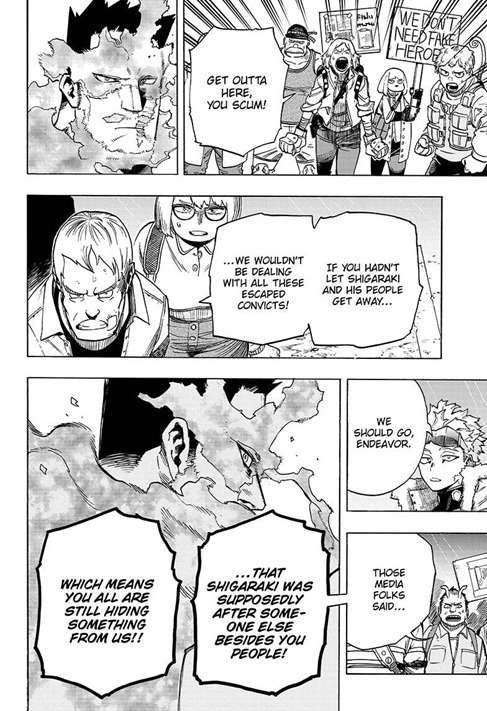
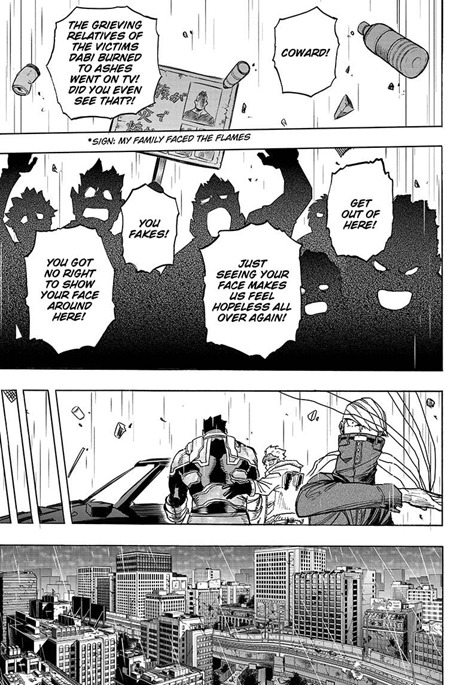
Nobody cared what happened to the Todoroki family; they only cared about how it affected them. The first half of that anger wasn’t even about the Todoroki drama.
And while the mention of Dabi’s victims and their families might seem like consideration, paired alongside everything else the bnha civilians are/do, I really doubt that the line comes from a genuine place of sympathy.
They have no loyalty to their best Heroes:

After everything Deku did for them, they wouldn’t risk a single thing for him. Most of them don’t even look anxious or afraid, just angry at their lives being disrupted.
Telling the kid who nearly worked himself to death, fighting so that they could have their lives back to piss off, while danger sense was being activated implying that they did mean him very real harm.
Another big point against the Civilians that’s brought up a lot:

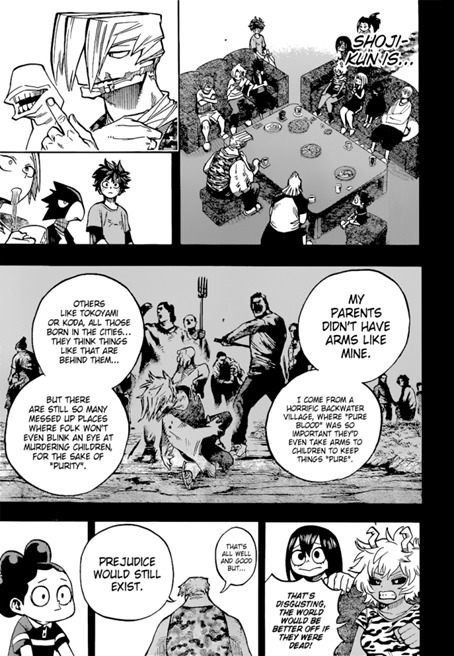
They’re violently racist. (Quirk-ist? Anti-Mutant? Basically against anyone very different in their appearance and/or their quirks.)
Mutants are an obvious Allegory for the racism/minority angle of the story, and it never casts the majority of the civilians in a positive light when it’s touched upon.
(Second Side point: Revisiting the end of ‘Side Point One’ because it pairs perfectly here, Shoji Mezo’s “Answer” to the horrible treatment the Heteromorph/mutants face is the opposite of that, and by that I mean Shoji’s answer is pretty much: Aspects of Uncle Tom’s Cabin Syndrome (an American theory/term but a Universal Theme) mixed with the acceptance of hero martyrdom.
His words to the Heteromorphs are this: “Let’s use that light to change the people who hurt us. So that they’ll feel ashamed to ever raise their fists against us again.”
Very inspiring…or at least it would be, were his words not disproven by his own backstory.
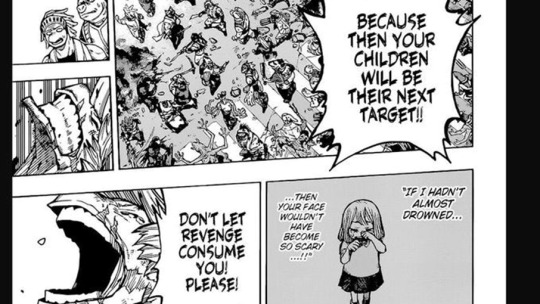
Shoji got his Scars ^ after he saved the little girl, in fact him saving her life was literally the cause of it.
There is no greater way to Shine or be heroic than doing what Shoji did, saving the life of a small child from drowning to death, and for that act the “Innocent People” gave him the Joker facial treatment.
Seriously if there’s a group of people who “don’t deserve to be saved” in Bnha; it is civilians like this.
Yet Shoji’s answer is still to “Be better than mere Avengers” and if they don’t the Heteromorph’s “Children will become the next Target!” as if they weren’t already??
None of it makes sense when looking at the whole picture and it’s clearly not a great plan, to draw another American based parallel that fits too well not to be noticed despite it being American; Shoji Mezo is basically Sturdy Harris from the Boondocks TV Series (freedom ride or die episode).
Look up the character’s wiki info or watch the episode, the fact that Shoji is willing to use violence in some extreme instances might seem a difference between them but the fact that he urges the other Heteromorphs to “be better than avengers” and “use their light to change the people who hurt us until they feel ashamed”, giving no thought as to whether or not his fellow Heteromorphs could even survive living by that standard like he can, fits the comparison to a T.)
Back to the final few points about the Bnha Civilians:
Are the Civilians in Bnha conditioned to be this way, products of influence and circumstance much like the heroes and villains are?
Kind of but not really.
While it is true that there are mountains of propaganda in hero society, there’s nothing specific enough to point to and say that this is why the Bnha civilians are this level of callous. They’re conditioned to love heroes and fear the violent villains they’re fighting, not to ignore the suffering of children (even their own) completely, and they’re definitely not compelled through propaganda to reject them or scar them, nothing in the series is evident of that.
And even worse, all of these examples of the people’s flaws/incidents (excluding the Ordinary Woman Heteromorph) happened during Allmight’s “Era of Peace”, so there’s no shifting the blame onto the villain’s current actions and even less excuse for things like these to be happening.
Why should the Bnha civilians have peace or justice if they’re like this?
If they show no more empathy or loyalty than the worst, most unsympathetic villains in the series (Like AFO) then maybe their point of view shouldn’t be considered any more than his. (And even AFO had some truth in his points: Failed social framework and the Quirk Singularity.)
To draw one final example for the Civilians with another Manga series that has pretty awful ‘ordinary people’ in it: Naruto.
But even in Naruto, the Author still showed that there were good people among the Civs. Population that weren’t like that and that did deserve to be protected and live peaceful lives, people who were outside of the Ninja system and just genuinely humane.

Before Naruto became a hero who saved the village multiple times, before he was even a ninja, they treated him like the human child he was.
These characters deserve their own Meta, other Naruto fans have probably written them already.
But suffice to say that the people who treated right the abandoned and hated child, host to a demon Fox that could casually level mountains, Teuchi Ramen (Owner and Daughter), are an excellent example of giving narrative motivation to “protect the people”.
There’s not much of anything like that in Bnha’s story, not anyone to point at and say; “They are worth saving/protecting!” and having it actually be true instead of just ‘What the hero is supposed to say’.
And if anyone disagrees with this, I’ll ask: Can one instance of goodwill be pointed to for the Bnha civilians? Any act of compassion, bravery or selflessness from someone in Bnha who wasn’t in anyway associated with heroes?
And no, the Civilians letting Deku stay at UA does not count.
It wasn’t even framed as selfless or compassionate anyway:

This ^ is a deal more than anything else.
Because the heroes (Deku) swore they’d fix things and the people practically made him swear it before they were let in.
Kota and the Ordinary Woman running to stand by Deku was a sweet and great moment but considering that he saved them first, it seemed more like a ‘returning the Favor’ sentiment. Same with the rogue Civillian group helping Shindo after he fought Muscular, more a give it back than a gift.
Part 2 The Lov
Even at their worst, the Lov still display humanity and redeeming qualities more than most of the civilians.
And I believe that this is 100% truth because Actions/Dialogue without reason for deception and inner thoughts, imply genuine Truth.
Actions:
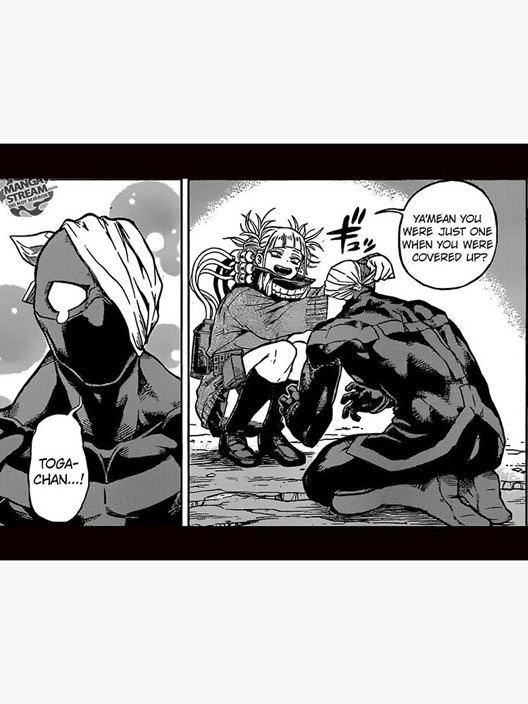
This ^ scene is referred back to a lot because it’s a good showing of Compassion/Bonds, one of the first really, in the League of Villains, in Toga saving Twice from ‘coming apart’.
Toga has no real reason to comfort Twice as much as she does in this series, in this first instance and in later ones, because aside from one time (no matter how cool and heartfelt it was) in MVA when Twice saves her and the rest of the League, Twice kind of messed things up more than a few times for the Lov.
Bringing Overhaul to meet the Lov without precaution resulting in the death of Magne (even though she herself rushed in recklessly), Twice’s personal hang-ups limiting his Quirk lessening his value to operations overall (from a purely strategic standpoint), and trusting Hawks (because he felt bad for him) so much he gave out Info that definitely shouldn’t have been given.
Yet despite having one singular success in MVA that Twice really pulled through among many other shortcomings, Toga still cared about him. Enough to try to help him hold himself together during the Overhaul business and then later go on a violent, rage filled assault toward the Heroes during the MLA raid after Twice was killed, giving little thought to her own safety.
Dialogue without reason for deception:
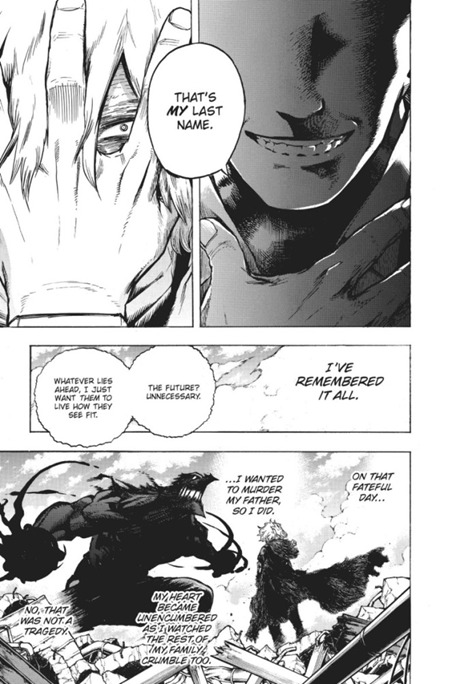
While Shigaraki is definitely an unreliable narrator, as evident by the monologue ^ in the bottom panel clearly contradicting what actually happened during the death of his family, the middle panel where he states that he only wants “Them” (definitely the Lov) to live as they see fit seems like the truth.
Because why would Shigaraki lie here? In this time or place to Redestro, someone he presently had no reason to manipulate, as they were in a life or death fight?
Shigaraki couldn’t have known Redestro would surrender, at this point he was talking to someone he fully intended to kill, further dissipating any suspect of manipulation.
Shigaraki does care about his comrades, their wishes and while he hasn’t really kept the promise he made as of current Bnha, I think that’s a result of All for One scrambling his Brain so much during the Mental Fusion stuff, the true Shigaraki barely seeming to know what’s going on half the time and only able to think about his past.
Twice and Spinner: Basically everything about them.
They might not think things through that much, but there’s no doubt that Twice and Spinner were and still are devoted to who they care about, true loyalty in all its successes and faults.
Inner Thoughts:
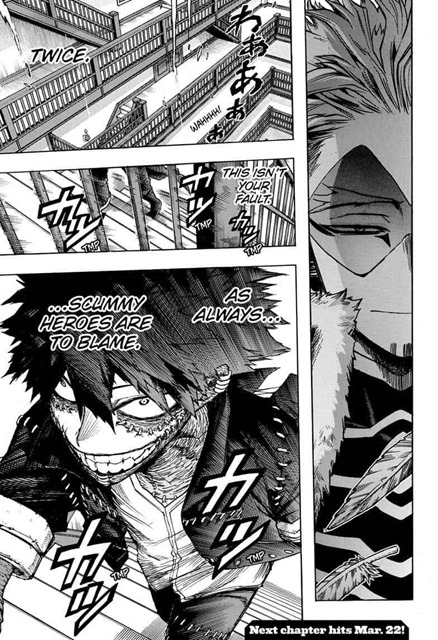
Dabi is…kind of a dick most of the time, even to the Lov, just to a much lesser extent than to everyone else.
It makes sense that he’d act that way though, given what he’s been through and the end goal of his plans, it’s understandable why he’d want to push everyone away in some form and not let them get too close.
But even underneath all of that, Dabi much like the rest of the core Lov never blamed Twice for his mistakes, and since this is an inner thought and thus having no reason for manipulation, it does imply that this is his honest truth.
Knowing that Twice would blame himself, although he never said it out loud, maybe he couldn’t with all of his own personal hang-ups, Dabi inside probably did want to reassure Twice that none of this was his fault.
The Core Lov do have empathy towards others abandoned and hurt by Hero Society like themselves, and they do care about each other, that is as much as they’re able to care about each other while being weighed on by their own individual issues.
The hero kid’s parents
Lastly for this Meta, there are parts of Hero Society that shouldn’t ever be destroyed, but they fall into small groups and come with their own faults.
The Hero Kid’s parents shouldn’t be destroyed just by virtue of being so close to the better/more heroic characters, but even they aren’t that great with possibly one exception.
Inko Midoriya has technically tried to protect Izuku but she never really helped him. She basically apologies for his existence in the childhood flashback, and until Izuku got a Quirk and became a Hero, she was never really shown to encourage him in anything, even to find happiness in other things.
Despite having doubts herself about saying the wrong thing to her son, Inko later tries to keep him from going back to UA for very good reason from a parent’s point of view.
But then she’s pretty easily convinced by a promise from Allmight, that wasn’t in anyway kept. Cut to the Dark Deku stuff later, she never calls Allmight out on this.
It’s the same story with little difference for all the student’s parents, they’ve never been shown to try to protect their children, especially at the UA confrontation with the Civilian Mob.
Inko, Bakugo’s parents, Ochako’s parents, and I’m just assuming the rest of them to cause it makes sense for them to be at the UA shelter, none of them helped.
I know Inko was being held back by Mitsuki because it was dangerous, but couldn’t she have shaken her off?
Kota did and ran to Deku to try to help him, and he was a little kid being held back Pixiebob (a Hero).
That probably wasn’t what Hori was going for or implying but that’s what happened.
Is this an illogical thought process that would be dangerous or harmful for the parents? Definitely.
But that’s the point. The parental instinct that goes beyond self-preservation and logic to protect their children hasn’t been shown for any of them.
Except one.
*Current Spoiler Warning*
Rei Todoroki in the recent chapter stands apart and above in this aspect, although this depends very much on how it’s framed going forward.
A mother fighting to stop her child from killing himself more than trying to stop a Villain from killing. Both true but one has to take front over the other for it to be meaningful, for Rei to show that she will stop Touya from burning himself this time, unlike how she wouldn’t before.
That’s character development, that’s parental instinct.
*Very current Spoilers*
Rei is there for Touya :) trying to save her son…and also Endeavor maybe?
Close enough (Double Thumbs UP!)
The children
Another group that definitely should never destroyed is the Young Children of Bnha, Kota, Eri, the work studies Kid group.
I put them into a separate category than the whole of the Civilians but it would take a lot to explain why that is and why they can be viewed as their own separate group, so I’ll put it in the next Meta and expand on how they relate to the existential parts of Bnha.
Also same for the villains/heroes and finally getting to the Quirk Singularity Theory.
To be Continued…
#bnha#bnha meta#mha meta#hero society#league of villains#lov#shigaraki tomura#toga himiko#dabi#jin bubaigawara#spinner#mha
343 notes
·
View notes
Note
hiii i know you're just a person and not a library but if you happen to have them on hand, i'd greatly thank you for some resources on how social justice topics first entered fandom pre-tumblr-2010s, especially in the 90s or earlier is the period i'm interested in, if fans were very eager on being "politically correct" and went out of their way to find related academic texts or if they sort of had to be "kicked in the butt" to do research by people who were already involved in social justice irl, and also if there was pushback against social justice entering fandom & what the arguments were (i know the japanese had the yaoi ronso, i wonder if there is some clearly traceable event like that for the western fandom, or just some insight into the decades-long process it was and how the arguments have changed overtime, eg. yesterday i stumbled across a forum discussion about how a certain character using misogynistic language is "just how working class people talk", & it's so interesting bc that's a kind of argument which seems to have fallen out of circulation completely, so that got me wondering on what other shifts there could have been👀)
--
I mean... "fans" is pretty broad. But if you want to know about m/m fans in Western fandom, that's a lot more answerable.
Ye olde slash fandom did have plenty of discussion around queerness. There's a certain style that's much more common in older fic where one of them is really struggling with homophobia and doesn't like the idea of being into men and so does something or other awful to create drama in the fic, and even then, some fans would be like "Then he's an undatable jerk!"
The further back you go in that kind of fandom, the more everyone is a mega-nerd and quite possibly an academic. There are certainly things that are openly talked about today that people were clueless about then (trans issues, for example), but you have to do a lot more kicking now to get someone to read an academic article on average.
I really cannot express how much more default-intellectual this hobby was in the 90s and before.
Here's an example of the sort of thing people were coming up with:
Here's a bunch of early 00s meta:
Here's a fanlore article with a smattering of the many long discussions about Why Slash:
Here's a starting point on some rapey stuff in Pros fandom that people had meta thoughts about:
And a common practice of writing fic to debunk/respond to other people's fic that used to be so overt there was a term for it:
You could also just go through the history of Escapade, the oldest slash con that's still running in 2023, and see what the panel topics were:
--
I'm not sure "social justice" is quite the way to look at this. If you're curious about m/m shippers and misogynist language or treatment of internalized homophobia in fic, that will be covered quite well by things like the above. Plenty of individual fanfic people were involved in AIDS activism because that was everywhere back then. But race stuff? Other kinds of social justice? I don't remember those coming up much.
And of course fans were not eager to be "politically correct". Being involved in slash fandom in the 80s was seen as being a pervert and a purveyor of underground pornography. These were rebels, not pearl-clutching line-toers.
They might have been eager to be pro-gay, but they sure as fuck didn't express it in those namby-pamby terms.
104 notes
·
View notes
Text
Hi, I'm your friendly fanfiction writer from the neighbourhood
Since I'm mostly known on this site for reblogging fanart and figure skating things, let it be known that I also write Yuri!!! On Ice fanfiction.

You might probably wonder what you need yet another fanfiction writer for when the YOI fandom has already all the fanfictions a reader's heart might desire.
In this case, let me tell you this:
Every fanfiction writer has their own reasons to write, their goals what they want to achieve with their writing, and their own vision of the story they want to tell. It makes their stories unique.
I write pre-, during and post-canon fanfiction. My goal is to expand the story of Yuri!!! On Ice and to preserve its spirit in my works and to continue the characters' stories—and that's especially true for Yuuri and Viktor because they're everything to me.
As a canon writer my writing is defined by my Prime Directive (yes, like in Star Trek):
I do not distort canon. I do not make up stuff that does not match the characters' personalities in any way. I do not project myself into the characters beyond the traits that I share with them. Because if I did that, I would betray what YOI is to me and the stories I want to tell in that universe. Of course, developing a character beyond their canon self is inevitable in the long run because people change and whenever I do that I'm careful to make that addition plausible.
If that sounds like your cup of tea, I invite you to check out my ongoing works:
Can You Hear My Heartbeat is my 350k YOI novelisation and the first part of my A Dream Too Large To Bear Alone series. I often call it my love letter to YOI for quite a number of good reasons: It's a character and relationship study of Yuuri and Viktor that takes a deep dive into Japanese culture and the summer of mutual pining. If you love figure skating, kinky!Eros Yuuri and sweet, steamy, and smutty viktuuri moments and if you want to explore what the boys are up to between the episodes that we all love so dearly, this story is for you. There are only a couple of chapters left to post. If you start reading now, you can read the whole story in one go and then move on to the sequel, which I'm going to post right afterwards. And to give you an idea what the continuation will be about: Yuuri and Viktor will finally move in together and get ready for going from husbands to rivals on the ice.
Beneath the Shine of a Thousand Spotlights is a pre-canon story that explores Viktor's life before he became Yuuri's coach. It's a prequel to my series for all lovers of Vitya that want to get to know him and his struggles as an athlete nearing the end of his career on a more intimate level.
Thanks for reading! If you want to get a more detailed impression of how deeply I dive into canon, please also have a look at my meta analyses!
Reblogs are deeply appreciated 💙💜
#yuri on ice#yoi#yuri!!! on ice#katsuki yuuri#viktor nikiforov#viktuuri#fanfiction#yoi fanfiction#can you hear my heartbeat#thousand spotlights#ADTLTBAverse#yoi novelisation
20 notes
·
View notes
Text
Post Index: Meta & Translations
Hello! I write about cultural and linguistic nuances in MHA, focusing predominantly on the character growth and relationship between Bakugou Katsuki and Midoriya Izuku.
I'm also part of a fan-translation subtitling project for the DVD releases of the Japanese musical stage adaption, My Hero Academia: The Ultra Stage, organized by dekusheroacademia. You can find more information about it on their blog!
My posts are tagged with chapter numbers like so: mha 1, mha 57, mha 322, etc.. Please feel free to search my blog this way and see if I have discussed a chapter you are curious about.
Posts are indexed chronologically by date with new posts at the bottom.
Linguistics & Cultural Meta
Katsuki as the unlikable ikemen
The lyrics of "SKETCH" and how they interplay with Bakugou Katsuki: Rising
The special status of "childhood friends"
"Motto mo naka ga ii": The Language of Bonds in Japanese
Bullying in Japan and how Izuku sees Katsuki's behavior
Izuku and Katsuki talk about the bullying differently
"His weaknesses" or "My own weaknesses": Layers of meaning in Chapter 284's furigana
Katsuki's Danger Sense
Dynamy's name & elongated vowels in written Japanese
"Deku is fine, Kacchan": Izuku is sincere and Katsuki is hilarious
Frame Narratives in Manga & Chapter 348
Cultural perceptions of curse words and rude language in Japanese
Omae: Complexity of Self-Expression and Intimacy with the Japanese “You”
"I know" or "We get it"? Katsuki's Intentions in Chapter 322
"We'll handle the things you can't" Plural, Singular, & Proximal Demonstrative Pronouns
Chapter 348’s “Shitty Nerd” Narrator Isn’t Omniscient (And It’s Not Bakugou Katsuki) (Follow-up to Frame Narratives in Manga)
Omae Part 2 Electric Boogaloo (aka "An Exhaustive Analysis of Bakugou Katsuki's Second-Person Pronoun Usage")
Monoma Neito: Douchebag Extraordinaire
Does Izuku Think His Feelings For Katsuki Are Gross? (or, DvK2's Endless Emporium of Nuance)
Bkdk in Japanese fandom
Who Wants To Talk About Japanese Orthography In Manga???
424: Katsuki's confession and Izuku's tenderness
Regarding the accuracy of the official translation
Implied romance in shounen manga
Stories are driven by what the characters need ("why didn't Izuku and Katsuki talk about [blank]?")
"Control your heart": A Misunderstood Narrative
Translations
New Year's Bunny Izuku
"Go Beyond" (Deku's "heart" theme) [Ultra Stage]
Musical 4 Promotional Poster [Ultra Stage]
"I'm gonna be on top!" [Ultra Stage]
Volume 37's cover announcement and title
"Impatient Heart" (Deku's Kacchan song) [Ultra Stage]
U.A. High School Field Trip Around Japan: Day 1, Day 2, Day 3, Day 4, Day 5, Day 6, Day 7
"Notes On Heroes" [Ultra Stage]
"Evil is Infectious" [Ultra Stage]
My Hero Academia: Connect to the Day (You're Next movie tie-in special manga chapter, just the Kacchan bits)
Things I Made
Less Than Zero (bkdk amv)
"So it's true what they say about you..." (bkdk fanvid)
Koi Daro (Ultra Stage fanvid)
the two of us (bkdk amv)
bakuhatsu art tag
122 notes
·
View notes
Text
Turtles Catches Up With Old GMMTV: The Bad Buddy Rewatch Edition, Part 3a -- BBS and Asian Cultural Touchpoints
[What’s going on here? After joining Tumblr and discovering Thai BLs through KinnPorsche in 2022, I began watching GMMTV’s new offerings -- and realized that I had a lot of history to catch up on, to appreciate the more recent works that I was delving into. From tropes to BL frameworks, what we’re watching now hails from somewhere, and I’m learning about Thai BL's history through what I’m calling the Old GMMTV Challenge (OGMMTVC). Starting with recommendations from @absolutebl on their post regarding how GMMTV is correcting for its mistakes with its shows today, I’ve made an expansive list to get me through a condensed history of essential/classic/significant Thai BLs produced by GMMTV and many other BL studios. My watchlist, pasted below, lists what I’ve watched and what’s upcoming, along with the reviews I’ve written so far. Today, I offer the first half of the third (ha!) of five posts on Bad Buddy. I'll look today at themes that myself and fellow Asian fans of Bad Buddy have caught and related to in this wonderful show.]
Links to the BBS OGMMTVC Meta Series are here: part 1, part 2, part 3a, part 3b, and part 4
As a lifelong viewer of Asian dramas, and as an Asian-American myself, I know why I'm drawn to Asian dramas. We all have our reasons for belonging to this widespread fandom, whether you're watching queer or het Asian dramas, consuming Asian music, all of it.
What are my reasons? The first and foremost one is relatability. Especially in Asian dramas, I relate to the spoken and unspoken communication of the dramatic characters as they navigate life's highs and lows. I relate to the way Asian dramatic characters engage with their families, their partners, their children, their colleagues, the world and societies around them. I relate to the ways in which societies are drawn and constructed, to the economic and emotional pressures that characters face. As an American -- I don't fully relate to the majority of experiences that white American characters face dramatically, because I'm not a part of the majority. As an Asian? I get almost all of what Asians are going through in dramatic art (save for, say, Korean or Japanese historicals, ha — but I do indeed get Asian patriarchy and sexism).
I'm not queer -- I am a cishet Asian woman -- but what I appreciate about queer Asian media is, very often, the media's tendency to not be shy about the various and intricate ways that discrimination, sexism, trauma (intergenerational, emotional, etc.), and many more social and emotional phenomena interplay in an individual's life.
When I first watched Bad Buddy, I had the strong sense that what I was watching was incredibly relatable to much of my upbringing and life as a young adult, working out issues vis à vis my family and my eventual partner. Bad Buddy, thematically, captured a tremendous amount of the realities of everyday Asian life for young people.
Bad Buddy exists in the GMMTV bubble of No Homophobia (cc @bengiyo and @lurkingshan, as we have spoken about the GMMTV bubble). However, what Bad Buddy didn't shy away from were explorations of many other social/emotional/cultural themes and frameworks of everyday life, from sexism, to youth bias, to boundaries and enmeshment, and many, many more.
I wrote in my first-ever Bad Buddy thesis that the framework of intergenerational trauma was the main theme I identified -- and identified with -- in the show. But, as I was contemplating writing this series of Bad Buddy meta posts, I wanted to know: what did my fellow Asians pick up in this show that they saw, and that they related to? In other words: what makes Bad Buddy particularly special to Asian fans of the show?
So, I did a thing. I gathered together a few BBS Asian stans, like myself, for a lengthy (and still ongoing!) discussion about what we related to in Bad Buddy. I want to thank, from the bottom of my heart, @telomeke, @grapejuicegay, @recentadultburnout, @neuroticbookworm, and @lurkingshan (who's not Asian, but has Asian relatives, and gets us!) for being up for creating a spontaneous mini-village together to talk Bad Buddy and its inherent Asianness.
It sounds redundant to identify Bad Buddy, a show made by Thais and set in Thailand, as an "Asian" or "Thai" show. It's definitely not a show that steps back to take a look at itself and say, "oh hey, this is really 'Thai,' what we're doing here." When I asked @recentadultburnout directly about what they might have identified as uniquely Thai about Bad Buddy, RAB thought about it and said -- maybe Pat's ranak ek (Thai xylophone). Other shows of Aof Noppharnach's, including He's Coming To Me, Moonlight Chicken, and even the start of Last Twilight, highlight many facets of Thai life, from the spiritual to the everyday-cultural (even Gay OK Bangkok does this a bit, too). But Bad Buddy doesn't really go there by way of overt symbolism and/or specifically Thai spiritual/cultural practice.
The Asianness of Bad Buddy is far more inherent. It is rooted and coded in the way people interact with each other.
An overt example occurs in episode 10, when Dissaya confronts Ming in the Jindapat home, and announces that she will reveal Ming's secret, dropping the effort she has made her entire life to "save face" -- her reputation AND Ming's reputation.
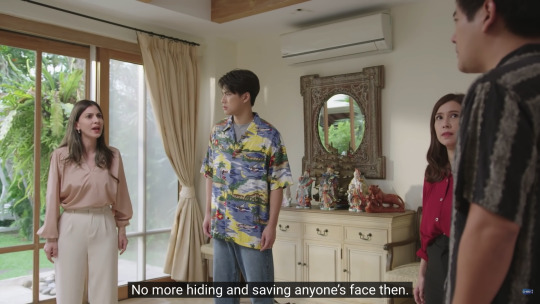
During my first Bad Buddy rewatch, I was so moved in fury by this scene that I had to blog about it as if I had never seen it before. There's so much encapsulated in this moment: the pressure that Dissaya has put on herself to keep the embarrassing secret that she lost a scholarship; the effort she made to keep Ming's theft of the scholarship a secret, to save his face, and the secrets she kept from Pran to save her face, and to keep up the façade of rivalry between the Jindapats and the Siridechawats. She was letting a whole hell of a lot loose in this moment, because the eternal pressure of saving face in Asian societies is, frankly, never-ending.
"Saving face" is an incredibly important notion in many Asian collectivist cultures. Saving face is about an individual or a family projecting an image of calm, cool collectedness and success, in order to not make waves within a collectivist society for any reason. If you are not working to seem like you are going with the flow of life, if you're not keeping up with the Joneses, the Kardashians, whoever -- you are not saving face. If you are in poverty, and are projecting an image of poverty, instead of pretending to be more wealthy than you are -- you are not saving your face or your family's face. If you allow yourself to get publicly defeated -- you are not saving face. Dissaya gave up a lot of her hard-earned reputation in the moment she confessed the truth in front of Pat and Pat's mother.
My Asian friends and I can click wordlessly into understanding the pressure of saving face; say that I didn't get good grades in school? I wouldn't be saving my parents' face. This kind of pressure to keep up with particular social dynamics within and external to family, within Asian societies, is a neverending drumbeat of pressure.
Besides saving face, there are many other Asian cultural touchpoints that were contained within Bad Buddy that my fellow Asian BBS stans and I noted. They include:
1) intergenerational/inherited trauma,
2) the unique nature of secret-keeping in Asian cultures/societies,
3) enmeshed family boundaries,
4) setting up children to compete against each other for the sake of familial pride,
5) patriarchy, sexism, and the reversal of sexism among next generations,
6) the inset/assumed roles of family members based on patriarchy and elder respect,
7) Assumed community within and external to one's family, usually based on where you live and where you go to school,
8) How one's identity is defined based on patriarchy and individualist vs. collectivist cultures,
9) How various cultures within an Asian nation live peacefully (or not) together (for example, what makes Pat and Pran different by way of Pat's Thai-Chinese heritage vs. Pran's ethnic Thai heritage),
and many, many more.
It'll be impossible, even over two posts, to analyze all of these cultural touchpoints, but a few of them engendered quite a bit of conversation among the BBS mini-village that I want to highlight. In this post, I'll focus on the continuation of my first BBS thesis on intergenerational/inherited trauma, the nature of secret-keeping in Asian societies, and will return briefly to the touchpoint of saving face.
One of the most devastating scenes for me in Bad Buddy is in my favorite episode, episode 10, when Pat (after he's learned, throughout the episode, of the extent of the lies that his and Pran's family have shared with their children) confronts his father about his father's demands to literally control Pat's emotions, the way in which Pat related to other people -- specifically Pran. Pat sums up a lifetime's worth of control in one sentence.
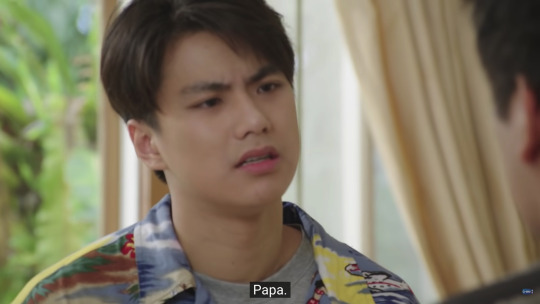
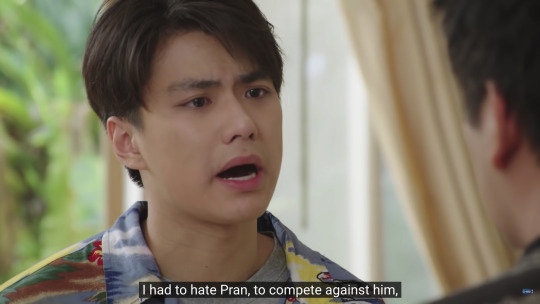
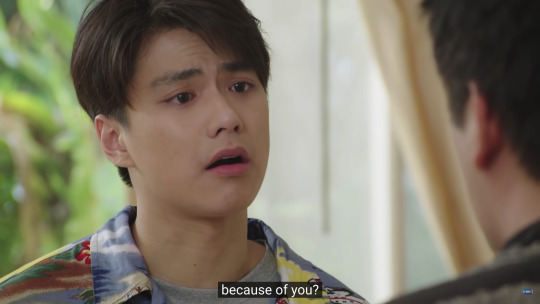
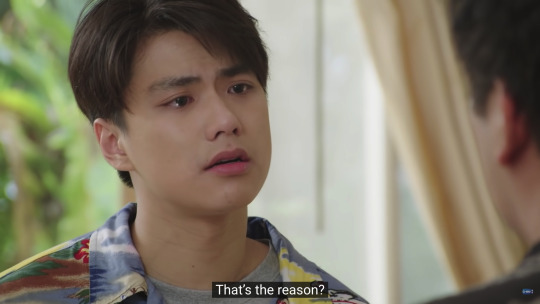
@telomeke noted in our ongoing group conversation that this notion of inherited trauma vis à vis Ming is particularly present in Asian societies, not just by way of familial expectation that we, as Asians, embody it and "take it" throughout our generations, as Pat realized up above -- but that ALL family members present are responsible for playing their roles within the framework of the inherited trauma. @telomeke noted in particular that exactly what Pat was doing to hate Pran, FOR his father? That was what Ming HAD to do for MING'S dad, when Ming schemed to get the scholarship from Dissaya. AND, Pat's mother, in consoling Pat, had to play the role of explainer -- which, as we know now, Pat ran away from to meet his beloved Pran on the rooftop before running away to the eco-village.
Pat running away from that moment? That was a huge symbol of the breaking of the inherited trauma that was given unto him by his parents both.
(@telomeke has actually written about their theory about how the Jindapats and Siridechawats ended up living next door to each other -- which seems SO STRANGE on the surface, consider Ming's and Dissaya's boiling hatred for each other -- and the theory links nicely within the framework of inherited trauma. Tel theorizes that Ming's father or grandfather may have actually gifted the house to Dissaya's family as a means of apologizing for Ming's deceit. In which case: the presence of the Siridechawats is a reminder, on an everyday basis, of Ming's folly to steal from Dissaya, which may explain why Ming in particular went so hard on Pat to triumph daily over Pran.)
We as a group unwound quite a bit on the nature of secret-keeping in Asian cultures. We know Bad Buddy relies on this cultural touchpoint at the end of the series: Pran and Pat have a full-fledged and committed relationship as a transparent secret, under the noses of Pat's and Pran's parents.
Secret-keeping....oh, man. I could not have lived a fully authentic life in America if I didn't keep a million secrets from my family while I was living out my own independent choices. I actually, literally, could not have gotten married, because the rule of my household was that I wouldn't date. I would just... get engaged. So I'd get engaged through, what, magic? Match-making? No: I'd have to find my partner through my own battle of social and familial conventions, literally against my family, to get to where I wanted to be in life, which was (gasp) married.
@neuroticbookworm illuminated more on this particularly from our shared Indian lens. She wrote,
Keeping your relationship secret from parents is sooooo ridiculously common in India (and I'm sure we can extrapolate to other Asian countries like Thailand). And the justification the children give themselves is always rooted in how they have a "duty" towards their parents, and that they will reveal their relationship after they have fulfilled their duties.
God, I LOVED that NBW brought up "duty" in this conversation. Because! Assumed within the coded language from Asian parents to children, and vice versa, is a sense that children MUST follow the dictates of their parents. 100%, full-stop.
The duties that NBW clarified in this particular conversation specified life demarcations such as "[w]hen I graduate, I'll tell my parents about my partner," and "[w]hen I graduate and get a job and can financially support myself in life, I'll tell my parents about my partner."
What's coded in these statements is a fear that the children will have to reveal to their parents that they were disobedient in the rules their parents set, that no dating shall occur until the time at which the parents rule it's okay. And at least within Indian frameworks, that period of it being "okay" is, more often than not, the period in which arranged matches are examined. Because, yes, that's still the rule in the high majority of Indian culture.
The revelation of that disobedience? That's bad-news bears. It indicates... everything: a lack of loyalty to the family; a lack of understanding the meaning of a child's role to listen to the parents as the parents are elders and therefore are the moral authority of the household; a lack of self-control (which is a huge deal -- that relates to saving face on behalf of the family); a lack of understanding the morals and ethics of saving oneself, in love and sex, before marriage, etc. Even if a family seems fully progressive on the outside, as an Asian, I'm conditioned to question that progressiveness -- as parents may hold different standards of acceptance for their children vs. other young people.
@telomeke expanded on disobedience for us -- connecting it back to the very important notion of "saving face."
I think there's something quite related to secret-keeping, but it's also to do with the ability of Asians, but also human beings in general, of being able to live with duality in life... and secret-keeping is part of it. This also ties in to the East and Southeast Asian preoccupation with the concept of "saving face" [as noted above]. A lot of families are able to live with the knowledge of dirty secrets, unsavory truths, as long as it's not brought into the light and confronted. I'm constantly reminded of this whenever I rewatch BBS Ep. 12 because it's clear both Ming and Dissaya KNOW their sons are in a relationship but it's not overtly admitted. In that way they (and more Ming I suppose) get to "save face" and not have to deal with the truth that their sons are being disobedient, consorting with the enemy, and because it's not in the open -- there is no dishonor brought to the family and to the elders.
God, I love the way Tel put this. That disobedience on the part of Pran and Pat would actually bring dishonor to their families -- because their families have put SO MUCH EFFORT into building their public AND private enmity their entire lives! It affected Chai's relationship with the families as an employee of both families. EVERYONE AT PAT'S AND PRAN'S SCHOOLS knew the guys were the "legendary rivals." And, of course, by being in rival faculties at the same university, the boys could continue this public enmity as well -- keeping up with the roles that were literally assigned to them by their parents.
If the boys disobeyed, they would bring dishonor to their families. Think about that -- and connect that with the heaviness that Pran walked away with after the rooftop kiss in episode 5, AND the weight of Pran's breakdown at the end of episode 10, when Pat assured him that they would run away together.
No matter what a Western viewer (and maybe even Asian viewers, wanting to see a dismantling of these paradigms) would want Pat and Pran to have by way of full openness of their relationships with everyone in their lives (because, in individualistic cultures, that self-driven openness is a given), Pran and Pat themselves knew that that couldn't be their reality vis à vis the social worlds they belonged to. So they kept their relationship a secret, in the end.
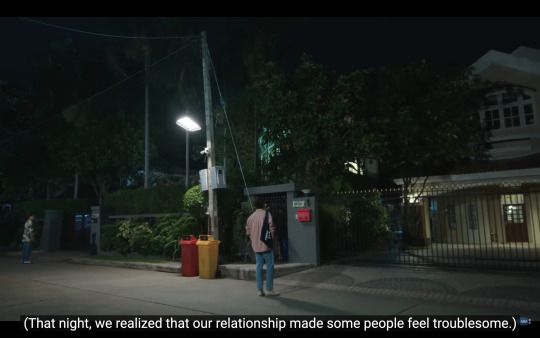
The secret that Pran and Pat keep about their relationship is strategic. It's certainly also a stress point: an older Pat asks an older Pran, at the end of episode 12, if he'll ever be able to walk through the front door of the Siridechawat house.
But this is the compromise -- within the larger-scale culture of secret-keeping in Asian societies, AND the private frameworks of the enmity that Dissaya and Ming established between themselves and their families years and years prior -- that will work best for Pat and Pran to preserve the sanctity of their relationship, which I talked about in part 2 of this meta series.
Pran and Pat do not have to publicly appear disobedient to the demands and pressures of their families. They do not have to make their families engage with each other. They do not have to make their families confront the mistakes that their parents made earlier in their lives. They can protect their families from their private and public follies. They can help their families keep and save face. And by doing all that? They can prevent their relationship from being threatened.
I feel this very deeply in my heart as an Asian-American. For the sake of my American spouse, I wanted to protect him from a lot of these pressures, and so I insisted on keeping a lot of our relationship secret from my folks. If I demanded full-blown, public acceptance from my parents? If I brought my "boyfriend" to parties, and introduced him as such with aunties and uncles -- especially if it wasn't indicated that we'd be permanent one day? Damn. No. I'd be embarrassing my folks, with the aunties and uncles saying to my folks, "dang, you can't control your daughter, huh? You let her do what she wants." That would mean my parents would lose face over their ability to control the lives of their children, and that's no bueno in our cultural terms. It would be on ME, as THEIR child, to uphold THEIR ability to save face, as much as its their own work.
Dissaya refers DIRECTLY to Pran doing this FOR HER when, in episode 10, she asks him, "did you forget to save my reputation?" It's brutal, daily work. And Pran goes BACK to keeping secrets in the end, because it would have been impossible, ultimately, for Dissaya to save face, AND for Pran to save Dissaya's reputation/face, if Pran were out with his relationship with Pat, thus proving his disobedience. It would be -- JUST -- better to keep the secret for all those involved.
As this post has gotten long, I'm going to continue talking more about these touchpoints in a second post. I'm driven to talk about this because I think much of the Western fandom might miss what us Asians are reading into shows like Bad Buddy through this coded language and engagement. I very much posit that Bad Buddy -- while it is first and foremost a queer show, made by queer Asians, about queer young men -- is so relatable to so many of us because we've faced similar struggles of survival, and we've faced threats to the sanctity of the love we have for other people by way of needed to fit into the roles set before us by previous generations.
So! With that, thank you for reading, and see you tomorrow, when I focus on competition, enmeshed family boundaries, patriarchy and sexism in Bad Buddy, and more if I can fit it in!
(Tagging @dribs-and-drabbles, @solitaryandwandering, and @wen-kexing-apologist by request! If you'd like to be tagged, please let me know!)
[Alright! Stay tuned for more, many more ruminations from the BBS Asian station tomorrow!
Here's the status of the Old GMMTV Challenge watchlist. Tumblr's web editor loves to jack with this list, so mosey on over to this link for the very latest version!
1) The Love of Siam (2007) (movie) (review here)
2) My Bromance (2014) (movie) (review here)
3) Love Sick and Love Sick 2 (2014 and 2015) (review here)
4) Gay OK Bangkok Season 1 (2016) (a non-BL queer series directed by Jojo Tichakorn and written by Aof Noppharnach) (review here)
5) Make It Right (2016) (review here)
6) SOTUS (2016-2017) (review here)
7) Gay OK Bangkok Season 2 (2017) (a non-BL queer series directed by Jojo Tichakorn and written by Aof Noppharnach) (review here)
8) Make It Right 2 (2017) (review here)
9) Together With Me (2017) (review here)
10) SOTUS S/Our Skyy x SOTUS (2017-2018) (review here)
11) Love By Chance (2018) (review here)
12) Kiss Me Again: PeteKao cuts (2018) (no review)
13) He’s Coming To Me (2019) (review here)
14) Dark Blue Kiss (2019) and Our Skyy x Kiss Me Again (2018) (review here)
15) TharnType (2019-2020) (review here)
16) Senior Secret Love: Puppy Honey (OffGun BL cuts) (2016 and 2017) (no review)
17) Theory of Love (2019) (review here)
18) 3 Will Be Free (2019) (a non-BL and an important harbinger of things to come in 2019 and beyond re: Jojo Tichakorn pushing queer content in non-BLs) (review here)
19) Dew the Movie (2019) (review here)
20) Until We Meet Again (2019-2020) (review here) (and notes on my UWMA rewatch here)
21) 2gether (2020) and Still 2gether (2020) (review here)
22) I Told Sunset About You (2020) (review here)
23) YYY (2020, out of chronological order) (review here)
24) Manner of Death (2020-2021) (not a true BL, but a MaxTul queer/gay romance set within a genre-based show that likely influenced Not Me and KinnPorsche) (review here)
25) A Tale of Thousand Stars (2021) (review here)
26) A Tale of Thousand Stars (2021) OGMMTVC Fastest Rewatch Known To Humankind For The Sake Of Rewatching Our Skyy 2 x BBS x ATOTS (re-review here)
27) Lovely Writer (2021) (review here)
28) Last Twilight in Phuket (2021) (the mini-special before IPYTM) (review here)
29) I Promised You the Moon (2021) (review here)
30) Not Me (2021-2022) (review here)
31) Bad Buddy (2021-2022) (thesis here)
32) 55:15 Never Too Late (2021-2022) (not a BL, but a GMMTV drama that features a macro BL storyline about shipper culture and the BL industry) (review here)
33) Bad Buddy (2021-2022) and Our Skyy 2 x BBS x ATOTS (2023) OGMMTVC Rewatch (The BBS OGMMTVC Meta Series is ongoing: preamble here, part 1 here, part 2 here, more reviews to come)
34) Secret Crush On You (2022) (on pause for La Pluie)
35) KinnPorsche (2022) (tag here)
36) KinnPorsche (2022) OGMMTVC Fastest Rewatch Known To Humankind For the Sake of Re-Analyzing the KP Cultural Zeitgeist
37) The Eclipse (2022) (tag here)
38) GAP (2022-2023) (Thailand’s first GL)
39) My School President (2022-2023) and Our Skyy 2 x My School President (2023)
40) Moonlight Chicken (2023) (tag here)
41) Bed Friend (2023) (tag here)
42) Be My Favorite (2023) (tag here)
43) Wedding Plan (2023)
44) Only Friends (2023) (tag here)]
#bad buddy#bad buddy meta#bad buddy the series#bad buddy the series meta#backaof noppharnach#aof noppharnach#ohmnanon#ohm pawat#nanon korapat#patpran#pat x pran#pran x pat#the bbs ogmmtvc meta series#turtles catches up with old gmmtv#the old gmmtv challenge#ogmmtvc#turtles catches up with thai BLs#turtles catches up with the essential BLs#asian intergenerational trauma#intergenerational trauma#asian themes in bad buddy#saving face in asian cultures#asian cultural touchpoints in bad buddy
64 notes
·
View notes
Text
Eijiro Kirishima: Positively Reclaiming National Identity and Making Masculinity More Inclusive (featuring surprise guest Mina Ashido!)
Link to the Bakugo presentation 2.0: Part 1 | Part 2
Link to the Bakugo presentation 1.0: Part 1 | Part 2
Link to the Kirishima presentation 1.0
Link to the Todoroki presentation
Link to the Deku presentation
Link to the Uraraka-Bakugo-Toga presentation
Link to the Shigaraki-All for One presentation
Link to the Spinner-Shigaraki-Bakugo-Deku presentation
Link to the BNHA presentations masterpost
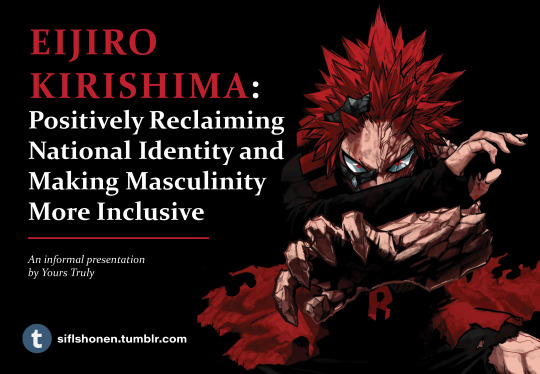
Welcome to the Kirishima presentation 2.0!
What you are about to read combines manga analysis, meta analysis, trope breakdowns, watered-down Japanese history as explained by an outsider Westerner (please take it with a grain of salt), and thematic parallels with other characters. Beware of spoilers up to manga chapter 383.
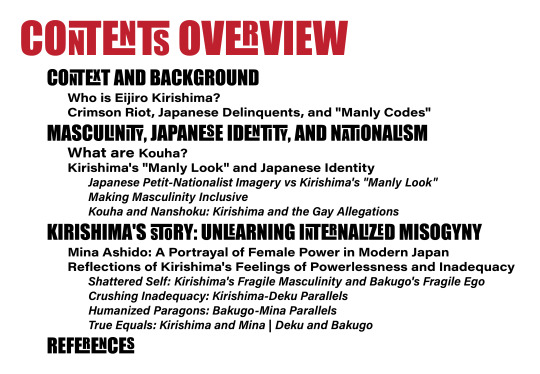
This “presentation” post discusses Eijiro Kirishima’s character and arc as well as the real-life references his character’s aesthetic and “manly” actions and credo are meant to communicate. This post includes a discussion of Japanese delinquents and bosozoku, a brief and simplified history of the relationship of Japanese hypermasculinity and military and naval power, a brief discussion of kouha and nanshoku, and a brief general analysis of how Kirishima's early-series insecurities reflect those of an “emasculated” and outdated Japan in relation to Mina’s “effeminate” Japan of today. It also compares Kirishima and Mina’s history and character growth to Deku and Katsuki. Some of the Wikipedia links are also mildly NSFW, so be careful.
If you take whatever I say about the story personally, or get upset about spoilers that’s on you. On the flip side, if you have something to say on context and history, tell me more! If I offend or misinform in the context of history, please let me know! I have only one perspective, and it is my own.
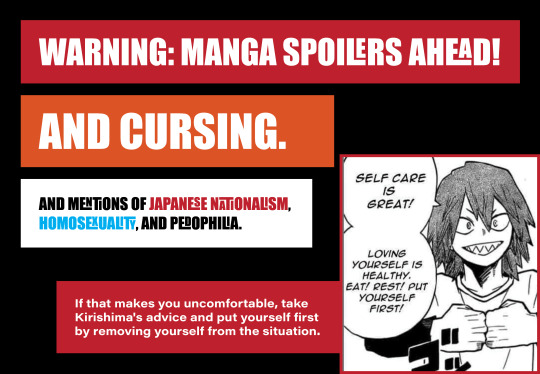
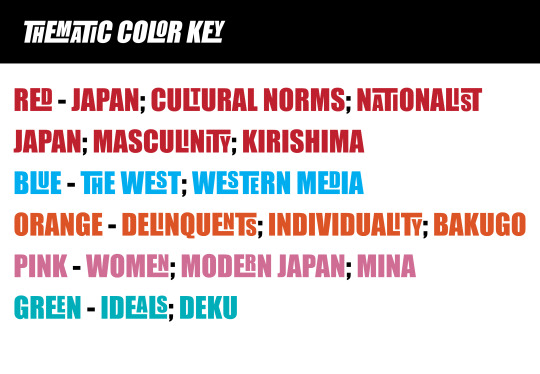
The color key will make sense in time. I promise.
Who Is Eijiro Kirishima?
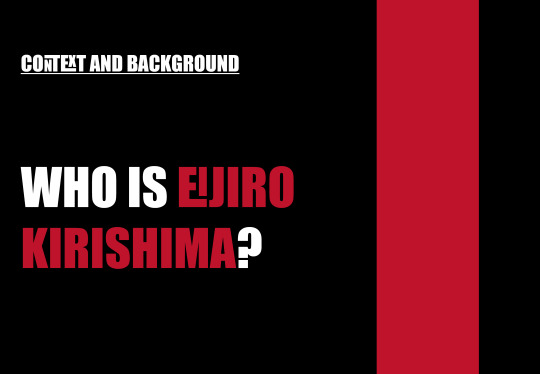
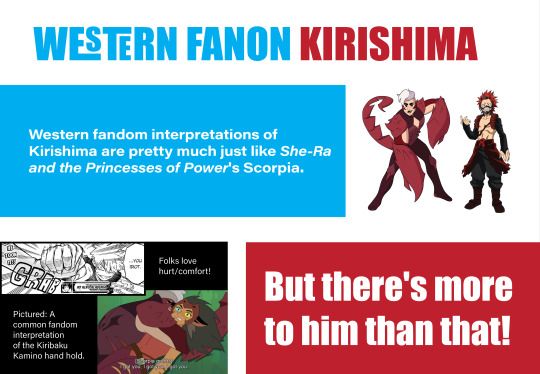
Personally, I love Scorpia. I also love Kirishima. But I do not like it when Kirishima is portrayed to be just like Scorpia in fandom works. Sure, they have similarities (some of which may or may not have been intentionally chosen for Scorpia’s part), but they do not have the same character arcs.
In particular, Kirishima’s arc is very pointedly about his pride and identity as a modern Japanese boy unlearning his internalized toxic masculinity and biases as he grows into a man.
But let’s start with the basics.
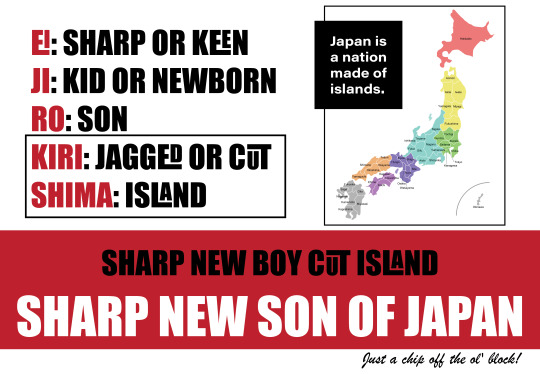
In case Kirishima’s association with his nation of origin wasn’t clear, his name is a dead giveaway.
Ei: sharp or keen
Ji: kid or newborn
Ro: son
Kiri: jagged or to cut
Shima: island
Eijiro means, as this kind person on the internet puts it, “sharp boy”. They also point out that the “Ei” is written in a way not ordinarily associated with names (which is usually “sharp” like “keen” or “intelligent”), so his name subtly “blunts” his intelligence while still pointing (ha) out that he’s a guy made of sharp rocks. And while that’s cute, it’s his last name that gives us more mileage for interpretation.
Kirishima. “Cut island”. Japan is a nation made up of multiple islands.
Kirishima is meant to be, very literally, a fresh-eyed child of his nation. He is emblematic of masculine heritage and identity. That’s a little more nuanced than saying Kirishima is Japan, but he definitely represents a significant pre-World War II slice of it. And he is on a mission to improve himself, and therefore the country, through a new and improved kind of “manliness”. Plus Ultra, bitches.
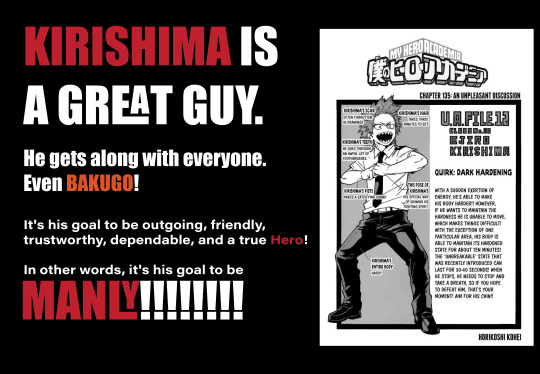
Kirishima is a truly wonderful guy and a unifying factor for the class.
One of the first people Kirishima forms a friendship with is Bakugo. I pointed out some of the similarities between Bakugo’s chosen presentation inspiration and Crimson Riot’s background in the Bakugo presentation. I’ll explore that extensively later on, but just keep in mind that it’s not exactly surprising that Kirishima is one of the first to find a common understanding with the class’ resident foul-mouthed, delinquent, western-style-military-costumed bomb.
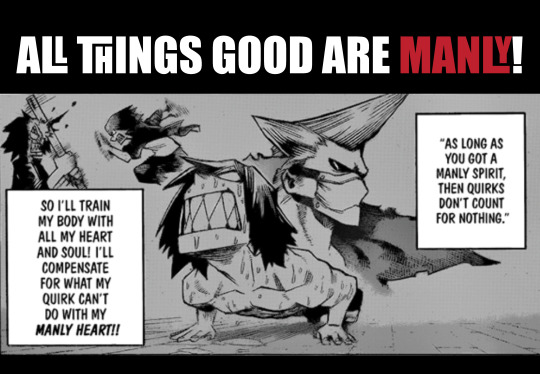
One of Kirishima’s most notable qualities is his tendency to describe anything he thinks is positive - the ability to show emotional strength as well as physical, shed tears and show sensitivity, do something competently, show consideration for others, act heroically in a general sense - as “manly”. The gender of the person performing the admirable action is irrelevant.
That last part is a big deal for his character, so I will say it again. The gender of the person performing the admirable action is irrelevant.
Crimson Riot, Japanese Delinquents, and “Manly Codes”
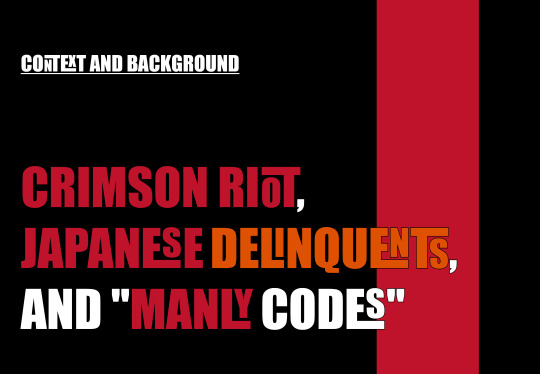
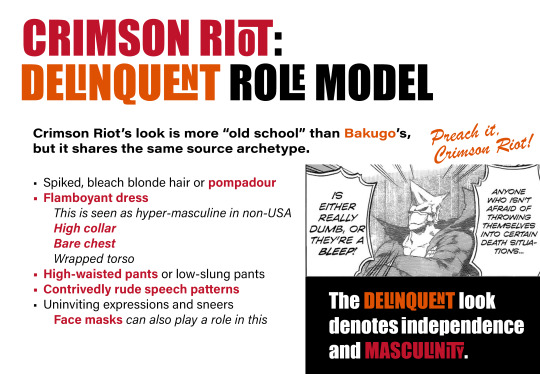
Kirishima’s penchant for calling admirable things “manly” isn’t random - it comes from someone else. His personal hero and role model, Pro Hero Crimson Riot, inspires him to use the language and associate it with positive things not limited or defined by gender. Crimson Riot’s dress, speech, and mannerisms, from which Kirishima also draws inspiration, also tell us a lot about him and his beliefs. Basically, we know he’s a Japanese delinquent/Yankee or bosozoku (which is basically a delinquent on a motorbike.)
Crimson Riot’s “manly” credo is rooted in the values and presentation of this real-world delinquent subculture.
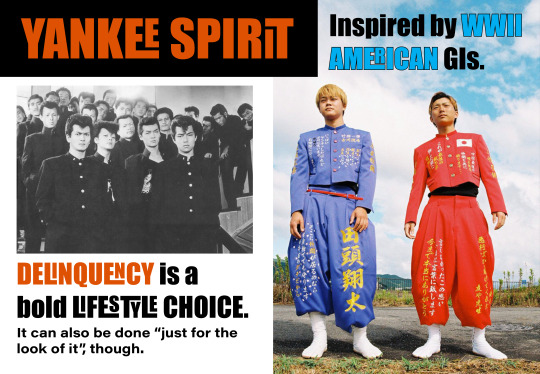
If you read the Bakugo presentation, you’ve seen this slide before.
The term “Yankee” was brought over by US soldiers (if you are from the States, you likely already know that a Yankee is someone from the northeast part of the country) and became synonymous with someone from the United States. Japanese delinquents are called “Yankees” because they walk around like a GI from the United States would - rudely, without consideration for others or the existing culture, and with a seeming need to flaunt their status as foreigners (and, more nastily, “winners” over the Japanese.) I talk more about the origins of the Japanese delinquent subculture in the Bakugo presentation, but the subculture’s origin comes down to this: dissatisfaction with the current society and a desire to express individuality born from something that can best be described as Western envy.
In appearance and attitude, Bakugo is also very obviously a Japanese delinquent boy, though he doesn’t use the same iconography of national pride. For the most part, neither do Crimson Riot or Kirishima. There’s a reason for that.
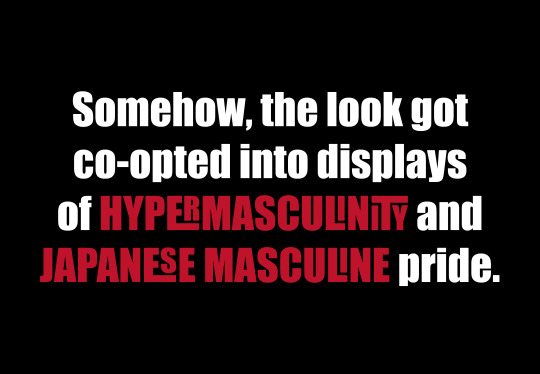
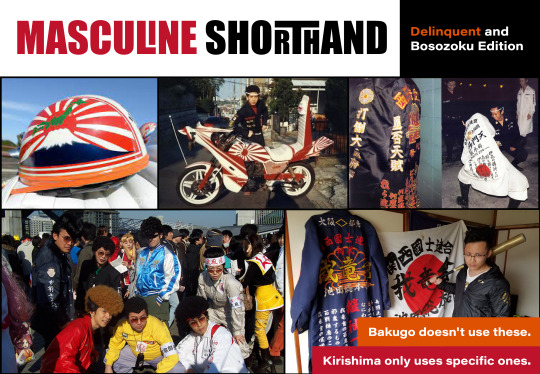
Interestingly, Bakugo lacks these visual markers of the “classic” delinquent look while Kirishima embraces some of them (the color red, the dyed hair with its wild styling, and the modern Japanese flag.) Instead, it seems Bakugo’s chosen delinquent visual identity markers are taken exclusively from the filter of shonen anime delinquents rather than the real world subculture! Their differing attempts to separate the things they like from its historic baggage is fascinating to me, personally.
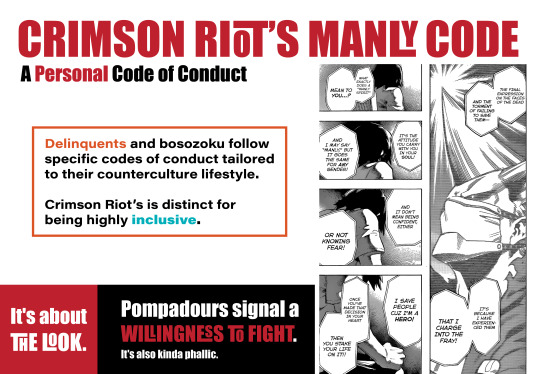
Bakugo’s outlook and personal presentation leans more towards a fictionalized version of the delinquent than Kirishima and his “manly” mentor’s, but the connection between their masculine presentations and implied personal conducts – or the fact that an underlying code of conduct is central to both identities – is still present.
If you read the article on delinquents I linked, you might notice that it emphasizes that a sense of community and closeness is a probable reason for the delinquent subculture’s enduring existence simultaneous to its rebellious and individualistic slant.
Kirishima and Bakugo are good representations of those two seemingly opposite poles, no? Kirishima focuses on creating a sense of community with himself as the unifying factor while Bakugo initially seeks to separate himself through his individuality.
The Yakuza framing of chivalry is not exactly the same as bushido, but rather the idea of “acting chivalrously” through what they refer to as ninkyodo, or the “way of humanity.” There’s still influence from and elements of bushido in this, however.
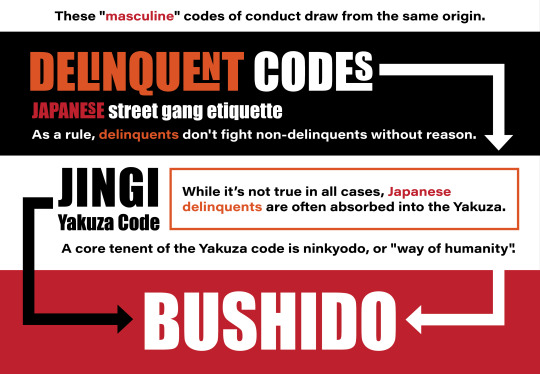
If you’re reading this, you’re probably a weeb, so you have likely heard of Way of the Househusband/Goshufukudo. The series’ tagline, “housework without honor or humanity!” is a play on the main character’s status as an ex-Yakuza because he left the Yakuza - or strayed from his ninkyodo/path of humanity - to be a househusband. It’s also a play on the Battles Without Honor or Humanity movies revolving around the same sentiment – except without the househusbandry part, of course.
(Also, the Yakuza created a recruitment website called ninkyodo. Considering the bigger discussion of social unrest and subdued envelope-pushing inherent in this manga, this wacky little blog post is worth a look since it pivots around the Japanese mob being upset with the government’s social programs.)
Delinquent codes draw from the Jingi, or Yakuza code and ninkyodo, which draws from bushido. You know what else draws from bushido? Most forms of contemporary and historic Japanese government.
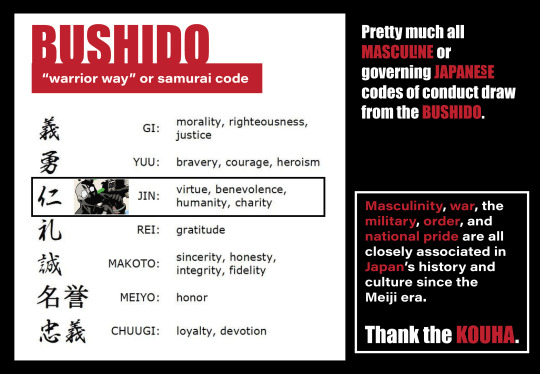
Bushido has seven core values: gi (justice), yu (courage), jin (benevolence or another word for humanity - and yes, this is the same character as the “Jin” in Twice’s given name, Jin Bubaigawara), rei (gratitude - and no, this is not the same character as Rei Todoroki’s given name but it sounds the same), makoto (sincerity), meiyo (honor), and chugi (loyalty).
Why is this important? Because there is one VERY big difference between Kirishima’s presentation and aesthetic and that of Crimson Riot and Bakugo’s, and it also involves bushido and its masculine, militaristic associations.
In addition to Crimson Riot and delinquent culture, Kirishima blatantly includes kouha as one of his inspirations. Bakugo does not, and it is unclear if Crimson Riot pays attention to them specifically.
What Are Kouha?
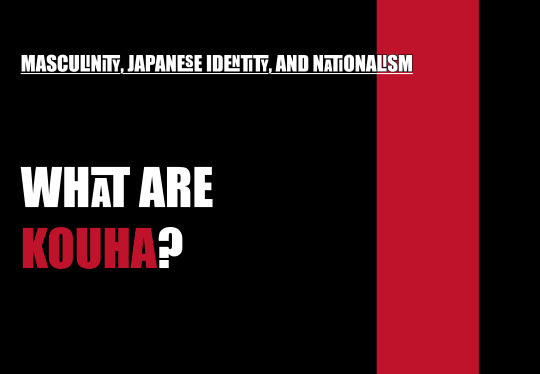
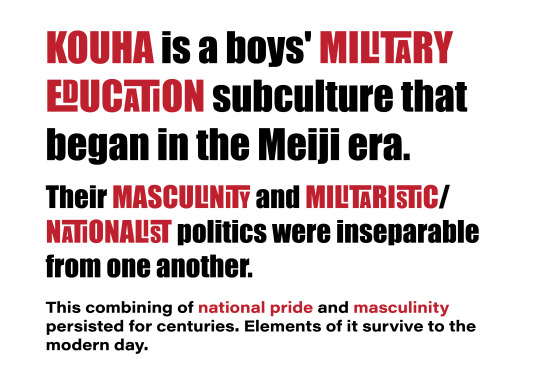
Kouha are, as Kirishima’s middle school classmates might say, “old school”. They’re even more old school than delinquents (or Crimson Riot), and they are also deeply nationalist. Kouha were a cultural phenomenon born from the student populations of Japanese military schools (the establishment of the Japanese Imperial Army is considered the first formal step of Japan’s westernization, by the way!) during the Meiji era. They held specific beliefs about male supremacy, masculinity, and national pride. To kouha, these concepts were inseparable from one another. They, and their resulting legacy as soldiers and Navy members in subsequent wars, are the main reason that quasi-nationalist or outright nationalist symbolism is so thoroughly entrenched in Japanese presentations of hypermasculinity even in the modern day.
Basically, kouha = Japanese Nationalists. This is an simplification, but you can read this entire Wikipedia article if you want a better picture of what I mean or need a starting point for your own research.
But don’t freak out! Kirishima’s admiration of kouha is, mostly, for the sake of a pun.
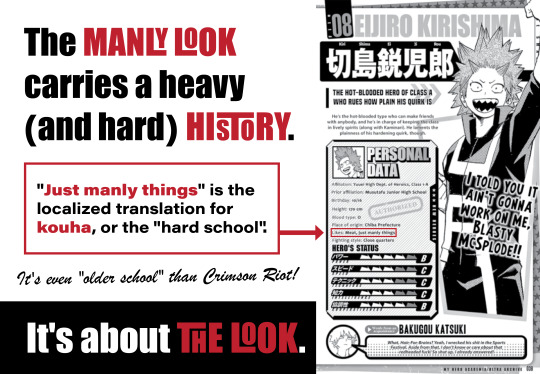
Horikoshi lists one of Kirishima’s favorite things as kouha (called “manly men” or “just manly things” in the most commonly circulated English versions), which means, more or less, “hard school”. It’s a pun on Kirishima’s hardening quirk. However, it also refers to Kirishima’s penchant for historically manly things and hypermasculine presentation.
Kirishima’s “Manly Look” and Japanese Identity
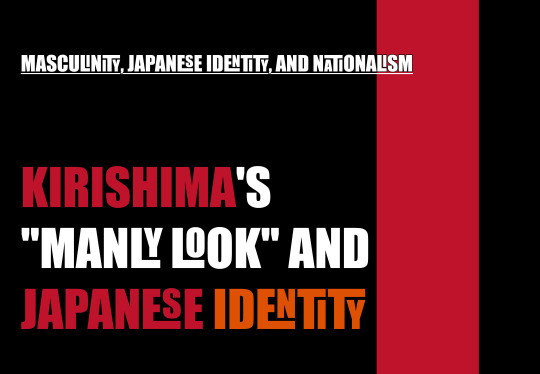
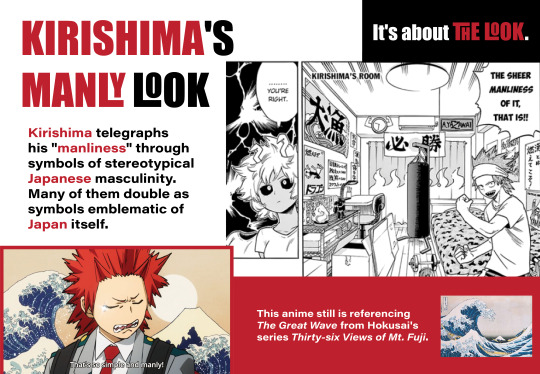
So, to review: Kirishima’s Crimson Riot-inspired philosophy and aesthetic is drawn from delinquent culture, which is a subculture that takes its cues from bushido – literally “warrior way” but sometimes called “samurai code” in English – which is in turn associated with Japanese pride and even nationalism. This association is very clear in Kirishima’s aesthetic. Look at his room. The Mount Fuji and ocean wave iconography, his hachimaki (admittedly this is relatively common among modern Japanese students, but it still carries a history), the tacky flames in representation of a “burning soul”…
But you know what he doesn’t use? Red sunbeams. This is really important.
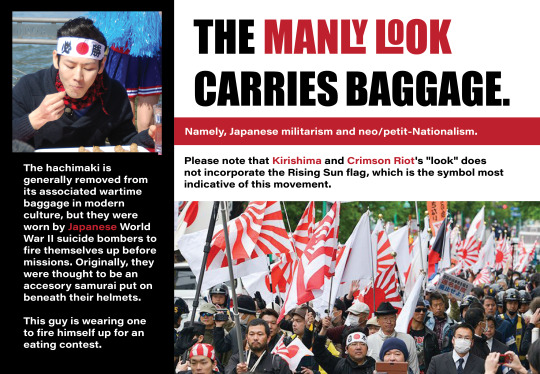
The specific “tackiness” and “kouha look” Kirishima enjoys can definitely be indicative of outright nationalism, but it is also associated with other hypermasculine subcultures that are not necessarily nationalists, including delinquent subcultures (though modern ones don’t often use the sunbeam-laden rising sun flag anymore. Modern delinquents usually stick to the modern Japanese flag as part of their uniforms or flags)
The fact that Kirishima’s “kouha look” does not include the sunbeam-laden Rising Sun flag (which, from the perspective of non-Japanese, is associated internationally with war crimes and, for related reasons, the Japanese Navy. Consider it a Japanese swastika—not to be confused with the Japanese manji, which is actually a totally different thing) or red sunbeam motif. This could be because My Hero Academia is set 200 years in the future and the rising sun imagery has fallen out of public memory. But personally, I think it is more likely that Horikoshi (and therefore Kirishima) wants to signal that Kirishima doesn’t hold the same beliefs as kouha and Japanese nationalists.
Even so, Kirishima’s “look” still suggests kouha and still associates his masculinity with his national identity.
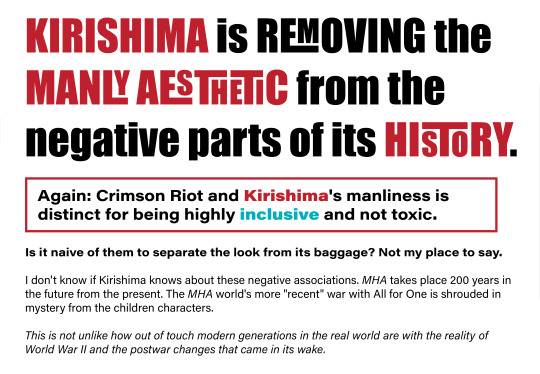
This isn’t a perfect one-to-one localization, but, for us in the West, we can sort of think of it like this: the difference between Kirishima and a neo-nationalist is not unlike the difference between guys who authentically really like Viking iconography and neo-Nazis who appropriate Nordic iconography for their beliefs. It’s just that Kirishima seems to be reclaiming these symbols in reverse. (It’s probably a really good thing Mina knows Kirishima from his time before UA, or else she might have given him a way more intense and judgemental side-eye over what’s in his room.)
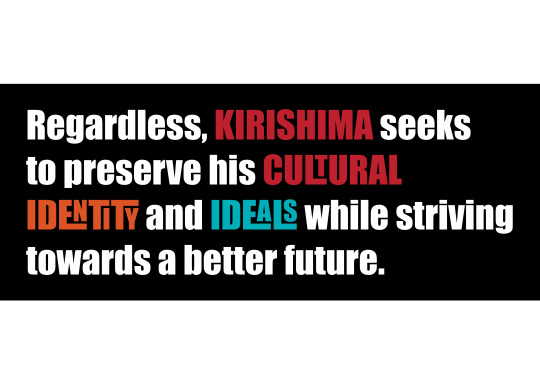
I suppose if one really wanted to, one could use everything I’ve written as an argument to say, “If you like Kirishima, you fell for the Japanese militarism and neo-nationalism apologist ploy”, but I don’t think portraying him as an apologist was the intent. I choose to see this as a shonen comic about superheroes and connecting the past with the present in pursuit of a better future because that’s all I think it is trying to be.
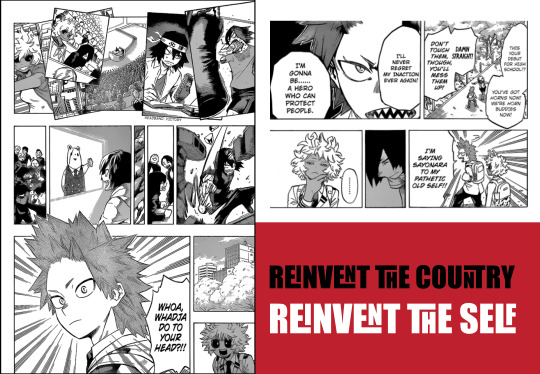
Again: Kirishima and Crimson Riot’s “manliness” philosophy departs from that of the kouha, Japanese nationalists (and neo-nationalists) because it is inclusive. The use of elements of their aesthetic preserves Kirishima’s personal pride as a Japanese guy - specifically as a “masculine” man - while his take on “manliness” is modern and geared towards celebrating the intrinsic goodness of humanity that isn’t defined by gender, sex, skin color, or even nationality, really, except as it applies as it being a thing for each individual to celebrate about themselves.
There’s other stuff kouha did and didn’t do that Kirishima doesn’t seem concerned about, either.
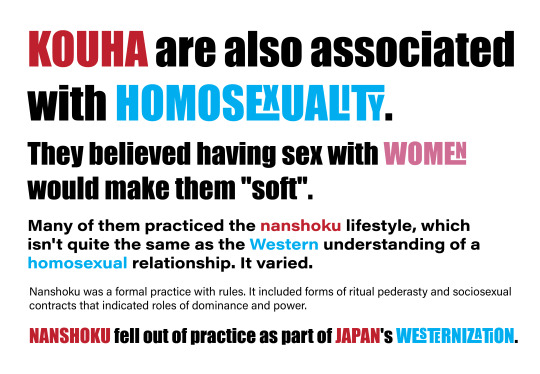
As I’ve said, modern Japanese sociopolitical (and masculine) identity is strongly associated with bushido. Bushido and kouha, particularly during the Meiji era and Russo-Japanese war (y’all ever read or watched Golden Kamuy?), is consequently associated with the Japanese Navy and nanshoku (THIS WIKIPEDIA ARTICLE IS MILDLY NSFW), or the practice of male-male relationships ranging from ritual pederasty to what one could interpret as “just plain gay” by modern western standards.
Whenever the Eastern or Western fandom discusses the possibility of Kirishima being gay-coded, this association between his kouha aesthetic and nanshoku is almost always at the heart of it. Well, that, and Kirishima’s dogged telegraphing of how much he’s into the kouha aesthetic and other “manly” things. To the modern Japanese, a high degree of overblown hypermasculine presentation and speech can come across as performative overcompensating.
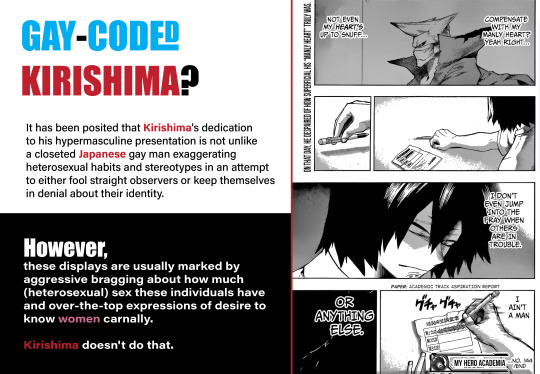
However, there’s one big detail that’s usually missing from these discussions in fandom: generally, the display of hyper-masculinity that is associated with performative overcompensating from closeted gay men includes constantly talking about how much heterosexual intercourse they have (which, according to them, is a whole lot) and how much they love women. Carnally. Sometimes they may even hit on women to an absurd and almost cartoonish degree – but usually only performatively in front of others or to try and fool (or repulse) the woman on the receiving end! The goal of a closeted gay person telegraphing heterosexual stereotypes to such an extreme degree is to either:
1. fool other people into thinking that they are not gay (which is often not very successful)
or
2. Keep themselves in denial by playing the part of an ultra-straight dude.
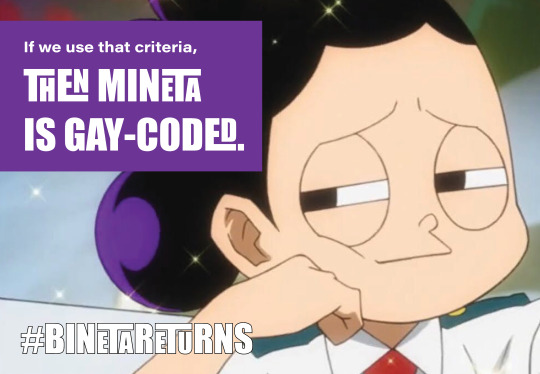
So, if I am using hypersexualized hetero behavior as the main parameter for how gay-coded a character is, I could argue that Mineta is more gay-coded than Kirishima is. He’s not, but I could make the argument.
But why would a gay person feel the need to do either of these things? Oof. Ain’t that the question. Masculine fragility has different nuances between cultures, but it isn’t exclusive to English-speaking countries. Modern Japan (read: Meiji era to post-World War II Japan that did its damnedest to Westernize as rapidly as possible) is relatively homophobic and views homosexuality as, well, “unmanly”. You can read more about that in the kouha and nanshoku Wikipedia articles I’ve linked. That’s the power of comphet!
That said, I don’t think Kirishima is gay-coded based on his affinity for manly stuff. He’s not using it to compensate for his sexuality. If anything, at his lowest, he used his “kouha-manly” presentation to compensate for his self-perceived lack of heroic and “manly” spirit. True heroism is what defines Kirishima and Crimson Riot’s perception of “manliness”, not sexuality. In fact, that’s the core of why their ideology is so progressive and why it flies in the face of its kouha-presenting packaging.
I mean, Kirishima could have any sexuality out there, but I don’t think his “kouha-manly” look is meant to be indicative of it, whatever it is.
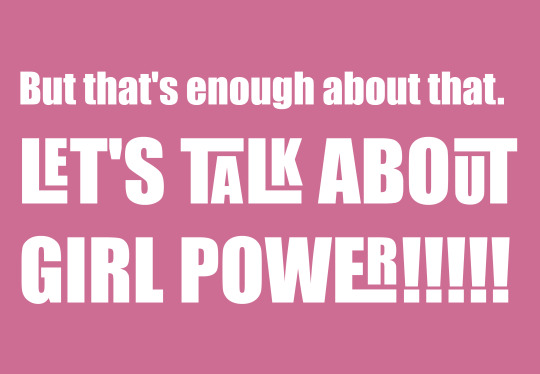
Mina Ashido: A Portrayal of Power in Modern Japan
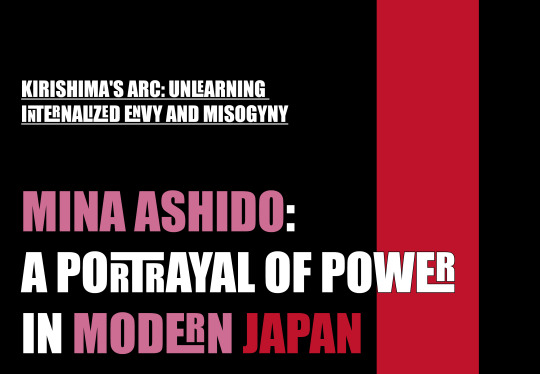
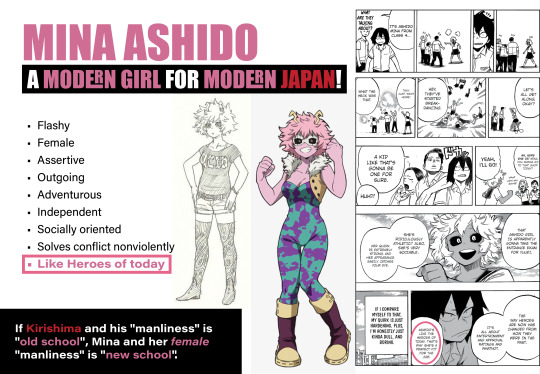
Mina is a major foil to Kirishima, so this writeup would be incomplete if I didn’t talk about her. If Kirishima is the “manly” Japan of a bygone era questioning how he can be relevant, Mina is “effeminate” modern-day, westernized Japan. Also, Kirishima’s key color is red. Hot damn, that’s flashy! It’s also the color of the sun on the Japanese flag! How fitting that Mina is represented by pink, or “light red”.
Simplifying the characters of Mina and Kirishima primarily by gender categories like that is a little more charged than I would prefer, but let me explain my logic.
During Japan’s occupation by the Allies after World War II, women gained, among other things, the right to vote. To quote Wikipedia directly: “It has been argued that the granting of rights to women played an important role in the radical shift Japan underwent from a war nation to a democratized and demilitarized country.”
They also were no longer bound exclusively to the home as wives and mothers, but could also take employment. Got it? Good. While I needed to explain this to set the stage for the stark difference in gender politics between the kouha’s heyday and womens’ standing after World War II, this is only loosely related to Mina and her portrayal.
Much like Kirishima, the biggest tells are evident in Mina’s look. In simple terms, traditional Japanese femininity isn’t flashy, isn’t westernized, and women don’t take the lead. Mina is flashy, westernized, and she does lead. In the manga, this is framed as a positive by her peers and something Kirishima admires and envies. (I have no idea how the older generation feels about it. We don’t know much about Mina’s personal life, unfortunately.)
Mina is a very modern girl. She stands out because of her natural appearance, but she also dresses ostentatiously whenever she isn’t wearing her high school uniform. Her look favors an updated spin on the gyaru subculture. In fact, while part of her natural appearance rather than intentional choice, I could argue that Mina’s startlingly black eyes and “unusual” skin is meant to indicate the yamanba (spinoff from ganguro) fashion subculture, but I’m not sure I am meant to go that far. Regardless of the specifics, everything about her appearance implies the largest commonality between most modern young Japanese women and every female-specific fashion subcultures (including lolita or kogal – Toga is a kogal): rejection of traditional gender roles and presentation.
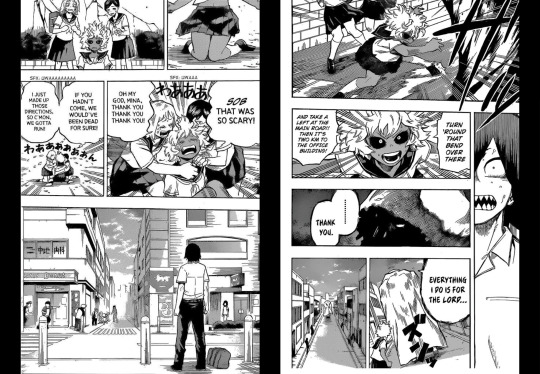
I’m gonna sum up Kirishima’s own personal plot and backstory for the sake of reference.
Kirishima is a guy with a hardening quirk. It’s not flashy or particularly suited for offense or rescue, and he’s self-conscious about how “worthy” he is to be a hero not just because of his lackluster power, but because, in the past, he’s avoided stepping in situations where, if he were a true Hero, he would have stepped in and offered support without thinking about it!
Sound familiar?
Instead, his childhood friend (that he secretly admires very much but also feels very insecure around) stepped in to be capital-H heroic while he stood and gaped uselessly! And what’s worse? She is a GIRL. A WESTERNIZED GIRL did what he couldn’t do. So, obviously, if he can’t be more heroic and “manly” than a GIRL, he isn’t manly at all. And he’s scared of that.
Sound familiar?!
In high school, Kirishima puts on an outgoing persona (complete with a new hairstyle) inspired by his childhood hero (and also, lowkey, the childhood friend with which he associates the same kind of true heroism) to cover for his insecurities!
SOUND FAMILIAR?!
But that’s enough about how Kirishima and Mina’s story parallels Bakugo and Deku’s for now. Allow me to throw the other parallel in your face - the one between Mina and Kirishima and Japan and the US’s policy changes after WWII.
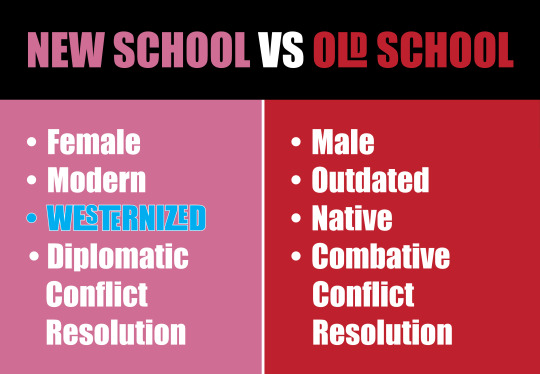
Mina, the modern, westernized Japanese girl, was first to act when “foreign power with old loyalty” Gigantomachia threatened their classmates. She solved the confrontation – and solved other confrontations with her peers – nonviolently. Meanwhile, kouha-aligned (militaristic and masculine Japan) Kirishima was not only unable to act (aka did not have any military influence), but felt completely useless and superfluous in both of these instances. (But later, when Gigantomachia re-emerges in a context that Mina cannot possibly solve on civil terms or with misdirection, Kirishima is able to defend her and do what she can’t. Even later, Mina learns the best ways to kick someone’s ass with her acid. She acts as the sword - or perhaps more precisely, the spear - to Kirishima’s shield.
If you didn’t know, the “sword and shield” analogy, or more commonly, “spear and shield” analogy is, or, at least, was, used to describe the US and Japan’s relationship after WWII. Whenever Kirishima talks about being the “ultimate shield” or “ultimate spear”, this means something.)
So, yes. This story is about the modern and traditional; the feminine and the masculine; the West and East. Just like Bakugo and Deku.
There exists a complicated relationship between national shame over losing the war, shame from Japan’s own war crimes, shame in Japan’s continued political ineffectiveness without a strong established military, and outright Japanese envy of the West for not only winning the war but epitomizing prosperity and modernity (or appearing to do so, at least.) I really don’t have the background to talk about this in-depth or respectfully. The point is that overt pride in the Japanese identity is a complicated issue, but particularly as it reflects in expressed Japanese masculinity. For Kirishima, his early relationship with Mina and the envy he feels towards her is a succinct crystallization of these feelings in allegory form.
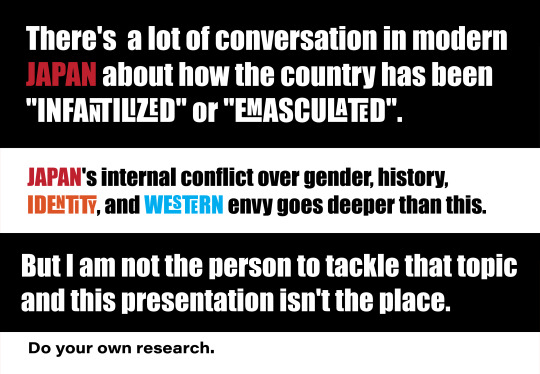
In the Bakugo presentation, I mentioned that the shonen genre was “born” after World War II and the art form still incorporates postwar baggage. This includes the aftermath of the nation reeling from its lack of military power after the war. I’ve already drawn a clear line between Japanese military might and its masculinity, so I don’t feel I need to elaborate much about why I make this next statement: a significant swath of the Japanese felt the loss of military power emasculated the country (which, as discussed through Mina, made it “effeminate”. Or, depending on the perspective, it “infantilized” the country. This introductory course examining shojo manga and identity touches on the infantilization of Japan through media exports and branding if you’d like to read another perspective using this terminology.)
I feel I should mention that Japan’s current crisis regarding declining birth rates is often associated with the lack of “properly masculine” men and the growing ability of modern Japanese women to put off or refuse marriage.The first observational piece about male subgroups discusses how masculine identity and neo-nationalism seem to be closely associated or even conflated for one another by the individuals in the neo-nationalist subgroup, but also alludes to the fact that a lack of clearly defined masculinity is being treated as a national crisis since it is seen as a prohibitive factor for Japan’s current generation to start families. To that end, Prime Minister Shinso Abe pushed for a variety of measures to encourage people to have kids.
In fact, Shinso Abe has achieved meme status in international otaku circles because whenever an anime or manga encourages or portrays sex for the purpose of procreation and raising a family as expected and singularly correct, the community wonders if it’s anime propaganda aimed at encouraging Japanese viewers to go have kids. This, combined with the fact that Shueisha/Shonen Jump upholds certain beliefs and gender/sexuality power dynamics in their company policy that is reflected in their published titles, will be important later in this series of presentations. For now, it’s just something to think about.
In shonen manga, including this one, the focus on men/growing mens’ identity (and the Japanese-specific flavor of masculinity) in a modern and changing world comes up a lot. While not directly related to Kirishima’s chosen counterculture influences, here’s a link to download an observational piece describing three notable cishet male Japanese subgroups struggling to define (or redefine) their own masculinity and identity: herbivorous men (kind of like western hipster metrosexuals), otaku (you know what these are), and Japanese petit-nationalists (basically neo-nationalists. And yes, they share elements from Kirishima’s aesthetic. If this were about Spinner and any heteromorph characters, this particular group would be much more relevant to this discussion.) Here’s another piece focused on “genderless” danshi and masculinity. Both of these pieces discuss the precarious correlation between male identity, community, presentation, and values. That, and I think they’re neat topics – though I do suggest you think critically about what you read in them.
Anyway, let’s get back to talking about this damn manga.
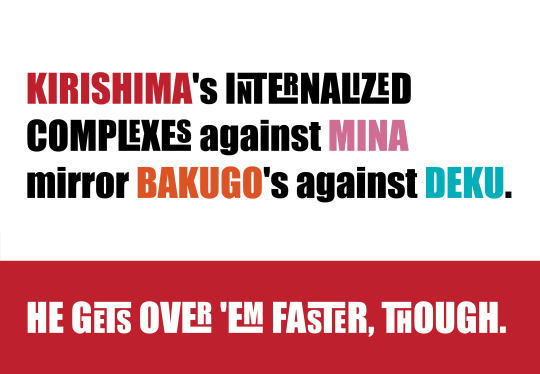
If you ever asked yourself, “How would Bakugo and Deku’s relationship differ if Deku had a quirk?” or, “How would Bakugo and Deku’s relationship differ if one of them was a girl?”, here’s your answer: it would be very similar to the relationship between Kirishima and Mina. Most of the relationships between pairs or sets of characters is meant to reflect off of the relationship between Bakugo and Deku in some way as either a compare/contrast exercise or to show how different things could be if fate had conspired to make one or two small differences in their lives.
This is thematically crucial to understand for almost every moment in the story.
Reflections of Kirishima’s Feelings of Inadequacy and Powerlessness
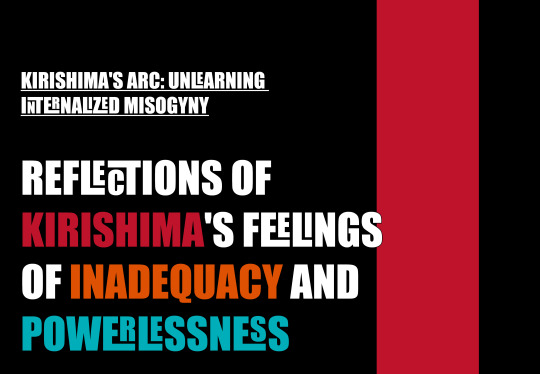
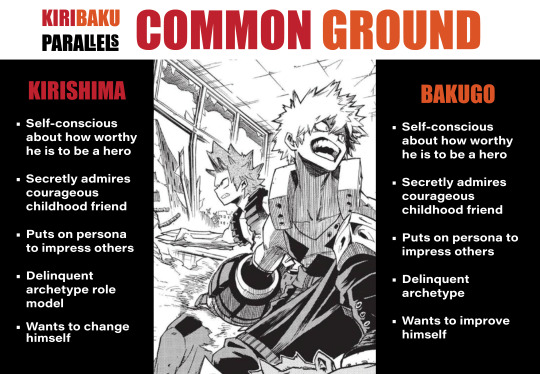
Kirishima and Bakugo have a lot in common. It’s not terribly surprising they became friends even when Bakugo was at his worst, since Kirishima could likely relate to where he was coming from and how he was feeling on some level.
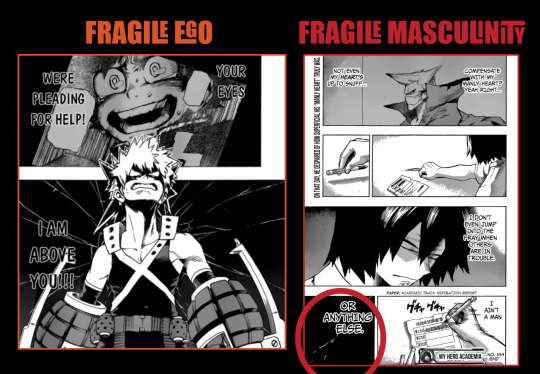
If you thought Mina being a girl was inconsequential to Kirishima’s feelings of inadequacy, think again. Luckily for everyone, Kirishima isn’t as much of a sensitive, fragile, and dramatic bitch as Bakugo about his insecurities.
Kirishima also hadn’t been explicitly stewing on them as they applied to one specific person for roughly 11 years of his life, either, so. There’s that.
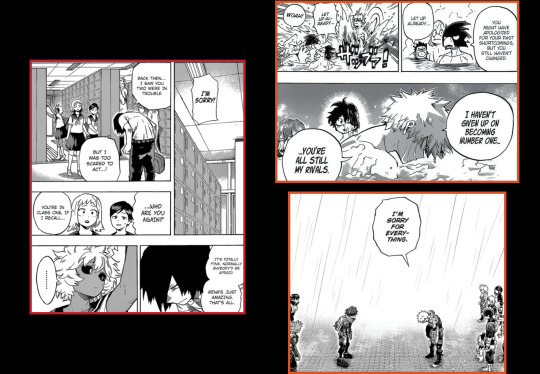
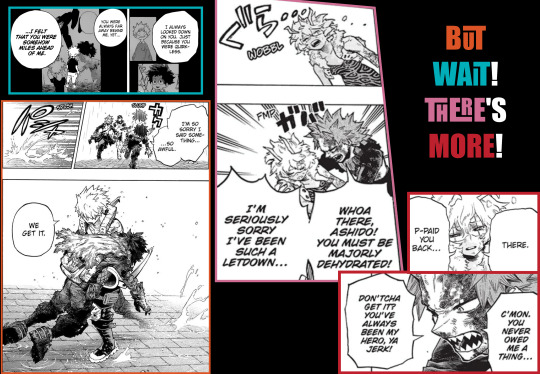
Bakugo’s relationship with Kirishima is an introductory course for him on how to have a positive relationship with Deku. For Kirishima, Bakugo is a proxy for relating to and helping the person in his life that he admires most: Mina.
But the Kirishima-Bakugo parallel isn’t the only parallel we need to draw.
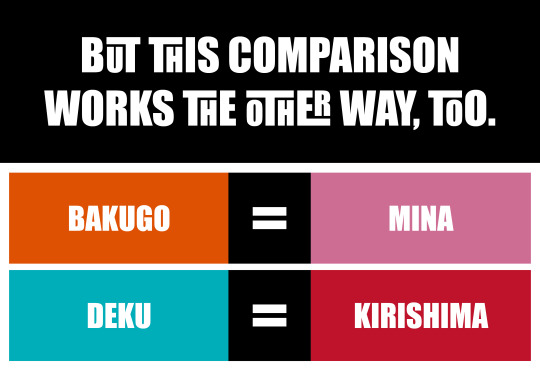
Arguably, Kirishima shares more similarities with Deku than Bakugo (but, of course, Deku and Bakugo are also very similar, too.) Kirishima is not confident in himself, mimics his idol very closely, is very concerned with upholding the status quo (through interpersonal harmony), got into UA through his effort rather than because he has a well-suited quirk, is quick to act “heroically” and put others before himself, is quick to throw himself into danger on others’ behalf (he’s got a hardening quirk, so unlike Deku he doesn’t mangle himself repeatedly with these stunts), and has an I-won’t-admit-it-for-most-of-the-series-but-I-will-broadcast-it-in-other-ways object of admiration in his childhood friend Mina.
Also, Kirishima feels woefully inadequate when compared to Mina because, in his eyes, she already has the appearance of a hero (and professional Hero.)
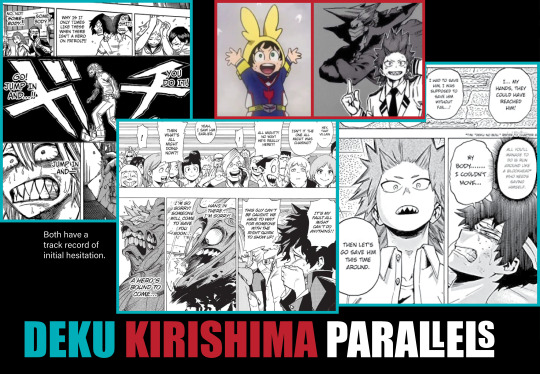
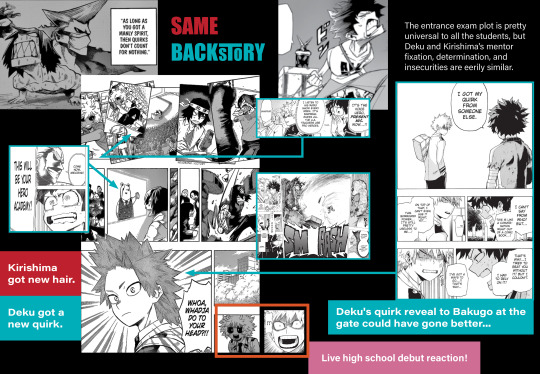
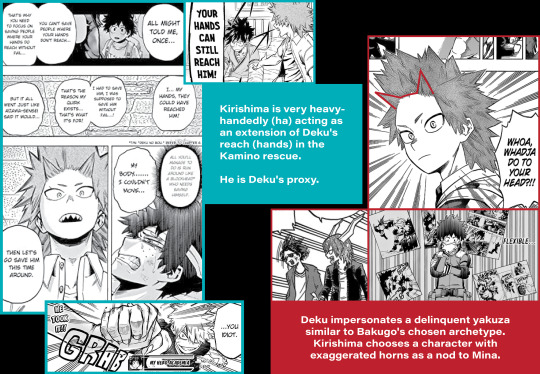
Kirishima’s outgoing attitude is a product of him pushing himself to be more like Mina in charisma and approachability. The horns of his hair are also inspired by her, too. While both of these things can be framed as parallels to Bakugo’s admiration of Deku as I did earlier, they are more on-the-nose for Deku’s penchant for intentionally talking like Bakugo when he wants to psyche himself out and copying all of Bakugo’s moves in order to best harness his quirk. And, of course, when Kirishima and Deku don disguises to go save Bakugo, they choose outfits with exaggerated horns (like Mina) and a Yakuza/delinquent persona (like Bakugo) respectively.
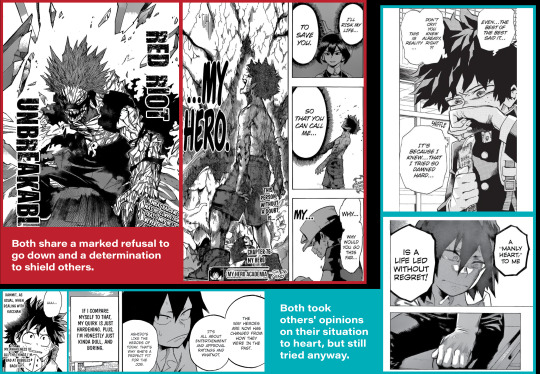
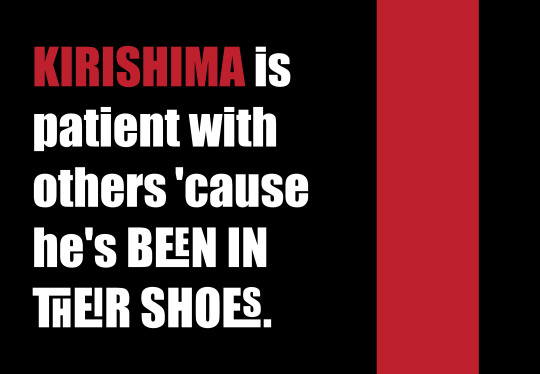
Kirishima seems to be able to “read the room” when it comes to the relationship between Deku and Bakugo - and in both directions. Personally, I am not surprised that he chooses to quietly support both of them when it comes to the other.
But perhaps the more interesting parallel is the one drawn between Bakugo and Mina.
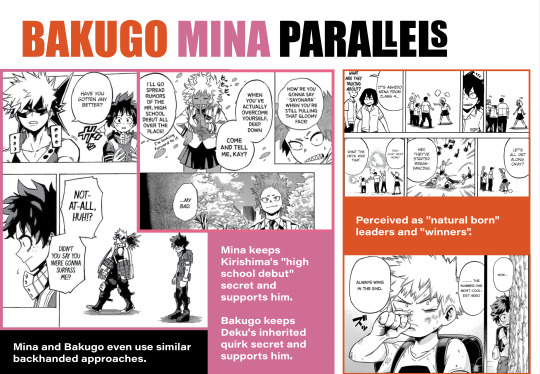
When Mina uncovers Kirishima’s “secret” (he dyed his hair and changed his outward persona to make a good impression as a friendly and outgoing guy with his “high school debut” rather than come off as a shy fanboy), it’s analogous to Deku telling (albeit vaguely) Bakugo about One for All at the beginning of the manga. Both scenes even take place at the start of the school year with cherry blossoms in the background and stuff. Later in the series, after Bakugo figures out the full secret of OfA (much like Mina figures out that Kirishima wants to be popular), he even explicitly says he’ll keep Deku’s secret.
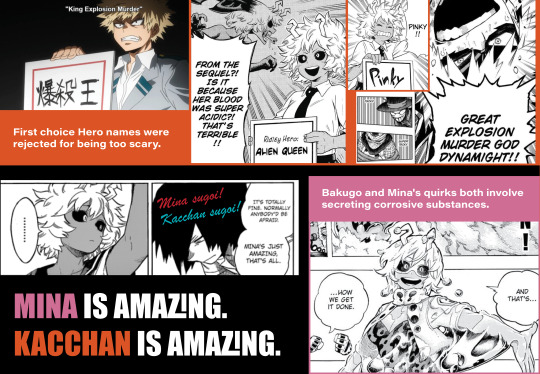
Mina and Bakugo are both described as “amazing” and both imply significant discomfort over the generalized compliment. It’s a huge expectation to carry.
Mina’s “Alien Queen” is denied as a Hero name just as Bakugo’s “King Explosion Murder”. Huh. Funny, that.
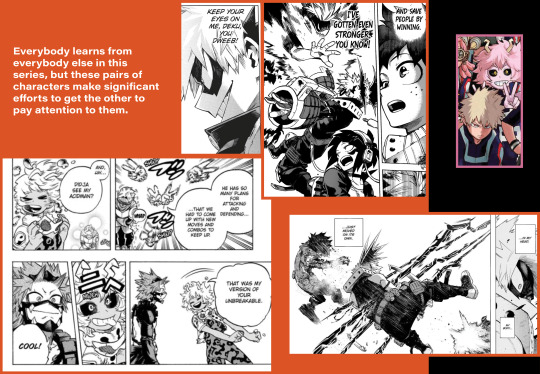
Kirishima and Mina are constantly improving using the other as inspiration, just as Deku and Bakugo do. They learn from other sources, too, of course, but these two sets of characters have an established feedback loop.
While Bakugo doesn’t struggle academically like Mina, especially during the training camp, his personal failures, many of which are social, are often broadcast on television. Both of them look like idiots in front of their respective foils.
Also, Bakugo and Mina both kicked ass at the school festival - Mina with the dancing and Bakugo on the drums. Deku and Kirishima were, you know, support. Extras.
During the festival, Mina and Bakugo were also both demanding taskmasters - Mina expected the best of her dance crew while Bakugo always had something to say about the pace and technique of his band members. Ha!
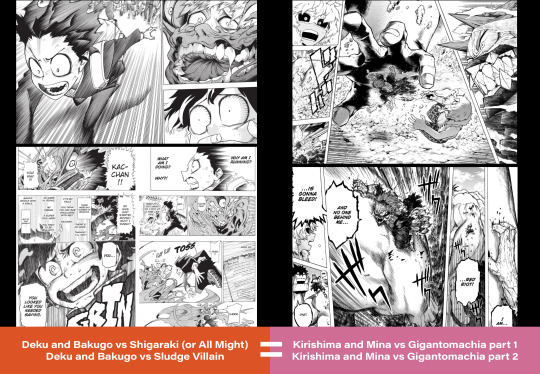
When Kirishima saves Mina in their confrontation with Gigantomachia, he does it without regard for his own safety (after initially hesitating and panicking like Deku did for the first part of the sludge villain incident!) Gigantomachia is also, interestingly, a shared past foe of Kirishima and Mina much like the sludge villain is for Bakugo and Deku.
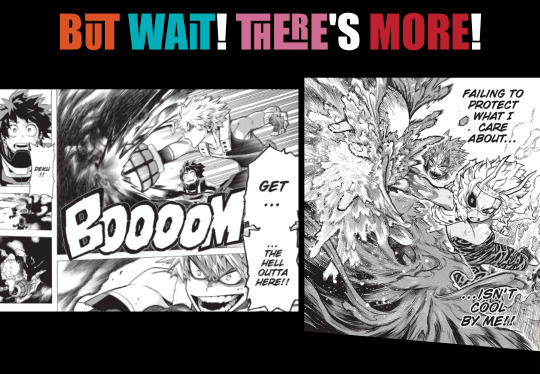
Considering how they parallel one another and how Mina’s Acidman Alma is inspired by Todoroki and Bakugo, I like to think that her win against the sludge villain was an inadvertent moment of revenge on Bakugo’s behalf, even if her character didn’t intend for it to be.
Chapter 383′s initial fan title translation of “A Small Heart” is also interesting, considering how the turn of phrase relates to the figures of speech used for Bakugo’s ego in the manga’s early chapters (inflated heart.) Viz translated it as “Meek Spirits”. A “small heart” seems to indicate cowardice or fear on Mina’s part (or the Sludge villain’s.) Despite Bakugo’s inflated ego (heart), his was also rather small in terms of facing his secret fears of inadequacy and, well, Deku.
The point is, even when Mina and Bakugo’s hearts were “small”, they saved Kirishima and Deku respectively.
Someone who knows more about Japanese could say more on this, as well as share more disambiguation between whether the English or Japanese connotations of the word “heart” are at play here. There’s some discussion about that in the Uraraka-Bakugo-Toga presentation.
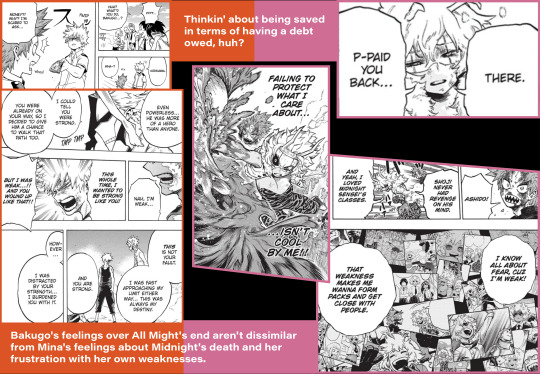
For all her confidence, Mina gets scared and nervous, too. But she doesn’t give up!
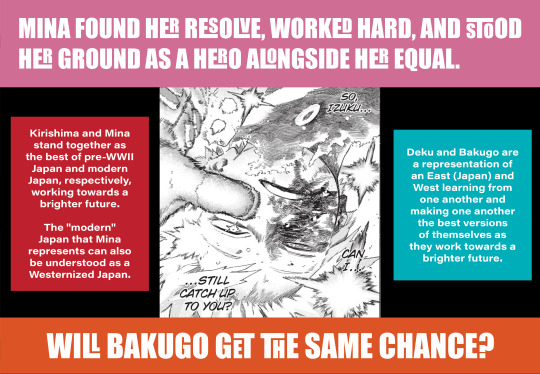
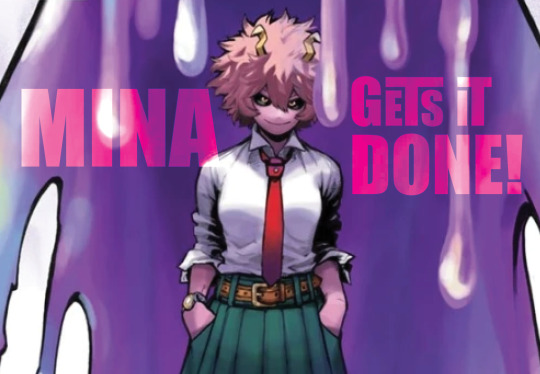
Mina gets it done!
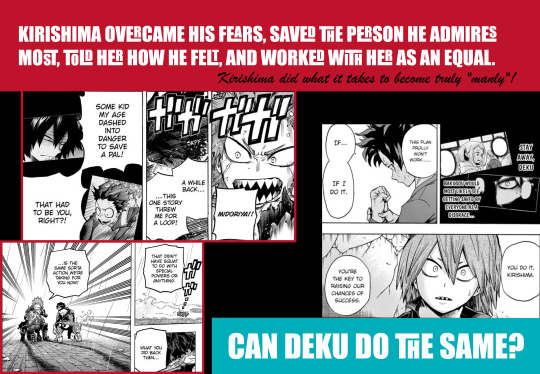
Will Bakugo and Deku accomplish what Mina and Kirishima have? I dunno. But even so,
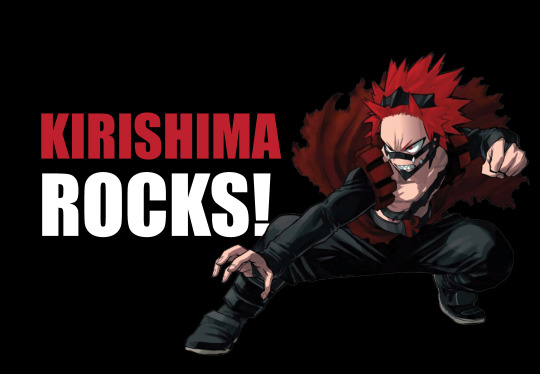
Kirishima rocks on his own and alongside Mina!
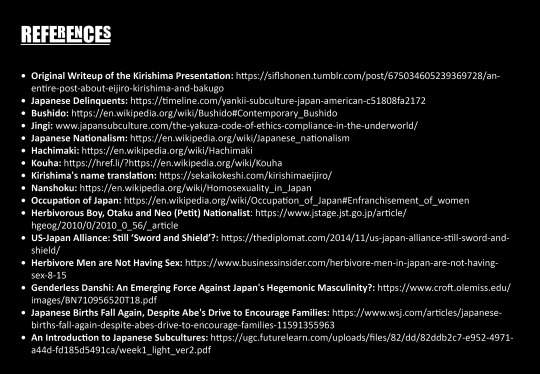
#bnha#bnha meta#bnha manga spoilers#kirishima eijiro#mina ashido#kirimina#bakugo katsuki#izuku midoriya#bakudeku#kiribaku#mha meta#mha spoilers#my hero academia#kirishima presentation
246 notes
·
View notes
Text
Zettai BL Ni Naru Sekai VS Zettai BL Ni Naritakunai Otoko 2024 - Episode 2 Eng Sub

VS SMELLS and VS AGE GAP RELATIONSHIPS
For downloading instructions and where to find the raw files please check our masterpost
Subs link
We ask that you not upload our subs to streaming sites.
Sharing with friends is fine. We’re also OK with folks sharing them in other ways as long as they aren’t public. Please use discretion when talking about the fansub outside of tumblr, but don’t hesitate to get the word out in other ways, and feel free to promote it here. Please credit ikeoji-subs whenever possible--we put a lot of time and effort into this.
Feel free to use the fansub for fandom purposes. Gif-making, meta-writing, and other fandom-related creative endeavors made using our fansub are not only welcome but encouraged.
translation notes:
about Fish Cake Man (7:28)
As we state in the subtitles, this guy’s monologue isn’t something we’re equipped to translate and if we did, it probably wouldn’t make much, if any, sense to English-speaking viewers. We learned from Snow’s Japanese friend that he's a comedian who is famous for doing this particular bit. After we had already finished most of the subtitles, I rewatched seasons 1 and 2 of the show and found that he was also in the other two seasons. In the first season, when Mob is explaining about how he's a side character and intends to keep it that way, he looks at a gardener on his university campus who is pulling weeds, illustrating that the world of BL needs to include some people who are unlikely to ever become main characters. That’s this dude. He appears again in season 2, when Mob is scouring the university for signs of Kikuchi after reading his goodbye letter. In every appearance, he's shown wearing the same sort of nondescript work clothes and cap and seems to work in some kind of maintenance or cleaning capacity at National BL University. –Towel

His name is Nou Misoo (脳みそ夫) which means brain tissue. I believe there's a pun here I'm missing but you can check our his sillyness on youtube, instagram or tiktok. –Snow
about “the gods decided to smite me” (10:24)
The first version of this line said that Mob “received divine punishment” for his Mob Move. That was already a great line! But I thought it had the potential to be a little more specific and evocative in an English-speaking context. At first, I was just trying to think of something a bit more specific to replace “received.” I thought of a few possibilities, including “I was smitten by divine punishment.” But since “smitten” is barely used anymore except to describe someone who's in love, it had the wrong connotation. Then I thought about how another tense of the same verb, “smite,” avoids those connotations and has a kind of King James Bible quality. But if I was going to say “smite,” I’d have to change the sentence from passive voice to active voice (which is generally best anyway) and give the sentence a subject who is doing the smiting.

I thought a unitary, capital-G God would make it sound a little too Biblical, possibly tipping it over into sounding overtly Christian. I knew that some religious traditions practiced in Japan, like Shintoism, included multiple gods. So I tried “the gods decided to smite me.” This seemed to balance out the Old Testament-ish aspect of “smite” a bit. The end result seemed more vivid than the earlier version, and it seemed like something Mob would say.–Towel
about “select shop” (11:30)
Observant English speakers might notice that when the guy who used the same shampoo as Mob talks about where he got it, he uses a term made up of English loan words. He says he bought it at a “serekuto shoppu" (in English, a "select shop"). While both parts of the word are borrowed from English, the term you get when you put them together isn’t commonly used in the US. I ended up replacing it with “boutique,” which gets across some of the meaning. But I’ll explain in more detail here.
It turns out that a “select shop” is a kind of smallish shop with carefully curated items that all fit a certain aesthetic. A business like this might be called a “lifestyle boutique” in America, but it’s slightly different from any business model used widely here. The big selling point of a shop like this is the fact that they’ve already vetted and coordinated these products. Their offerings are tailored for a particular niche, so that if you’re into the general idea a select shop is going for, you’re likely to be interested in a lot of what they’re selling. The items for sale will also have been hand-picked by a professional who’s able to find just the right thing in a way that a typical consumer wouldn’t be able to.
You can imagine what kind of college student would not only shop at this sort of place but declare it proudly. Even if Mob was going to fall in L with a B, this guy would be a bad fit.–Towel
about “a listless ne’er-do-well” (19:04)
The more literal translation of this part goes “a man like this, without ambitions or vitality.” It’s a nice turn of phrase, definitely, but I thought if I could localize it a bit it might evoke more of the right feeling. I thought it would be more typical in English to express this in terms of an adjective plus a noun describing the kind of person he’d appear to be, rather than saying he was without these qualities. From “without ambition” I got “ne’er-do-well” and from “without vitality” I got “listless.”–Towel

Tag list: @absolutebl @bengiyo @c1nto @come-back-serotonin @lurkingshan @my-rose-tinted-glasses @porridgefeast @sorry-bonebag @twig-tea @wen-kexing-apologist
#zettai bl#zettai bl 3#zettai bl season 3#zettai bl 2024#zettai bl ni naru sekai vs zettai bl ni naritakunai otoko#a man who defies the world of bl#translation notes
77 notes
·
View notes
Text
Disclaimer: long, extremely personal rant. Yes, it's also about mdzs and Jiang Cheng but mainly, it's about me trying to deal with my own trauma when I'm being hit in the face (metaphorically) with it by putting my feelings into words. The posting is so I don't erase it and force myself to forget about it.
You know it's funny, but as I was trying to sleep (and failing. Badly. It's 2:38 am.) I kept on finding myself thinking about why I didn't like Jiang Cheng. Because you see, it's rare for me to dislike a character that much, to the point I actually have blacklisted all his tags and avoid any fics that talk about him positively.
(Again, this is an extremely personal post about my own feelings. This is not meant as a rebuke if you love him. On the contrary. Keep doing what sparks joy. Just, you know, far away from me.)
I have a funny history with the mdzs fandom. I first started watching the donghua when it started airing back in... 2018? 2019? Can't remember for sure. Then I was left hungry for more because only the first season had aired, and it ended on a big cliffhanger. I saw it was an adaptation, so I went looking for the source material... and found the manhua (I was used to japanese animation at that point and thought that was it). The manhua was also being fan translated, and despite being extremely different (and confusing for poor past me), ALSO left me on a cliffhanger. I was desperate and saw someone pointing out there was a novel! I finally found it, read it in a few nights, and loved it. I read a bunch of fics, enjoyed myself, met and befriended people. Then I moved on after a while. I remember, distinctly, that I wasn't a big fan of Jiang Cheng but that I could at least stomach him in fics.
Last December, I felt the urge to reread some mdzs fics. I read some popular ones and, after falling into the animatics and amvs rabbit hole, decided to rewatch the donghua. Except for some reason, Jiang Cheng's character rubbed me wrong. I remembered not liking him much but he wasn't that bad in the fics so I couldn't see why he was so distasteful in the donghua. I'd been warned that the donghua wasn't that faithful (my own memory was extremely hazy), so I just shrugged it off. Maybe the people behind the donghua weren't fans of jc?
I saw there was an official translation of the novel and, by that point, DEEP into the hyper fixation, I bought all four available volumes and read them. At the same time, I was still reading fics. It was fine after all, I already knew the story.
By then, I had realized something was a little wrong with the characteristization. Some of the tropes given to Wei Wuxian rubbed me the wrong way. I looked it up a little (remade a tumblr, found amazing meta, the rest is history) and figured "Ah that must be cql fics. That's the problem."
And yes, that's true. In part.
The other problem lies with the particular way some people write Jiang Cheng. I'll be clear again: I have nothing against those people. Most of them I don't know and I'm aware this is very much a, shall we say, "me" problem. It's why I avoid the positive Jiang Cheng content. I don't care if you keep writing it so long as you keep it away from the canon jc tag.
But whenever people write Jiang Cheng and completely erase his crimes and abuse of both Wei Wuxian and Jin Ling, I feel it like a slap on the face.
Last Monday, I saw a therapist and talked about her about many things (I did warn this would be a very personal post). Part of it was my mother and her treatment of me and my brothers. And after barely a few words, she said, very simply "Oh so your mother abused you."
I already knew that. I use those words myself to describe my history with her. But the validation is always nice to hear, you know? Especially because so many people try or have tried to brush it off as "nothing." My own mother did, both about her own behaviour and when I was being abused by other people and tried to seek her help. Hell, even I still do it sometimes.
And I think that's why I hate Jiang Cheng so damn much now. His canon self is... Well, I'm not a fan, but he's a well-written antagonist. But dear gods, I've seen so many people brush off his canon characteristics to make him into a more palatable character, the loving uncle, the funny tsundere brother, the ace guy who hates mushy romance (let me tell you, as an ace person I am also real fucking tired of homophobic characters being hc as ace)... Even the ones who mention his bad parts feel the need to immediately add his achievements, as if they don't dare speak badly of their fave. "Yes, he tortured Wei Wuxian, but he also sacrificed his core to save him!" "Yes, he hit and verbally abused Jin Ling, but he also lovingly raised him!" "Yes, he tortured and killed innocent people but he also has trauma and had to lead a sect when he was so young!"
And this feels familiar, every time. This feels like the people telling me "Yes but it's not that bad" or saying "Yes your mother gave you panic attacks but she made sure you didn't fail at school" or "Yes but she made you love reading" or "Yes but she gave you so much, don't be selfish" or "Yes but she was here for you when you were depressed" or "Yes but she has it hard too" until I fell in the habit of saying "Sure, my mother insulted me and threatened me financially and there was a long, long time I was convinced she didn't love me... but."
Always that damn BUT.
So you might be able to understand why I have a hard time with Jiang Cheng when people pull the same shit all thenfucking time. I'm working on it because I'd rather not be stuck feeling anxious about a silly purple grape just because he happens to be fandom fave in my current hyperfixation but in the meantime, I have to deal with it and it's... annoying. To say the least.
(I'm going to insist here: I know that Jiang Cheng isn't my mother. That's not the point here. I am fully aware he's a fictional character and that me feeling that way is something I should be working on. I am. And I'm not telling people to stop writing positive content for him. This is just me trying to put into words my complicated feelings for a complicated character. And ranting, a little bit, about badly tagged fics I admit.)
It's easier on social media. You just block the characters tag and, if people bother you about it, you block them. Friends being friends, I just need to tell them "I don't feel comfortable talking about this character" or "let's agree to disagree on this interpretation" and because my friends are the best, they agree and we move on.
Fanfiction is where the problem lies.
I know why people erase the 'hard' parts, or at least I have a good guess. It's easier that way. Fanfiction is about having fun! It's about writing about your blorbos the way you want to! I don't want to police anyone's content. I'd just like it if people tagged their OOC and stopped trying to make me feel as if I'm the one who misread the book because I don't feel like erasing the canonical abuse this character did or because I don't like that they keep putting down my favorite character to uplift theirs.
I'm not sure how to conclude this. I should be sleeping honestly.
Let's try this: if you read this to the end, congrats I guess. I want to reiterate I don't care if you make Jiang Cheng into the most loving, best brother and uncle ever. Just be aware of what you're erasing first. And tag your goddamn fics.
#screaming into the abyss#not sure whether to tag this as the fandom or not#let's go with no#we'll see tomorrow if i feel differently#feel free to reblog so long as you stay respectful#this isn't about hating on people#this is about me working through my problems so that trauma doesn't color my view of a character#if i dislike a character i want it to be because i find them obnoxious#not because their fanbase remind me of my mother#gods I'm tired and I'm sad
57 notes
·
View notes
Note
Hi! I wasn't able to see 02TB in theaters and with it coming out on english blu-ray soon I was wondering how was the official translation? I'm nervous about it after seeing your post talking about the Kizuna translation and how messy thst was.
I've also heard the subbed version was using dubtitles is this true?
The dubtitles thing is true, unfortunately. The good news is, even with it using dubtitles, the translation doesn't seem to be nearly as bad as Kizuna's was!
In the case of Kizuna, it seems that the movie was translated to English using the messed up translation that was in the official subs, then the dub was written based on that messed up translation, making it two tiers of disaster. (A more detailed breakdown is in the post the OP mentioned.) In the case of 02TB, whatever translation was used as a base seems to have been generally accurate, and although "dubtitles" usually is an inherent recipe for disaster, it seems like the dub was written with the knowledge that the script would be made into subs later. So unlike...pretty much every other American English Digimon dub...there's no added jokes, no extra lines, everything sticks pretty closely to the Japanese script, and the furthest they went was just playing with the phrasing and making minor changes so things would lip-sync. Pretty surprising, honestly.
That doesn't mean I don't still have some quibbles with it. In particular, I'm guessing whoever did the base translation wasn't familiar with Adventure lore or what lore points are kind of die-on-a-hill level for the fandom (especially "is this epilogue-compliant or not?"), so there was some loss in nuance regarding the discussion of partnerships and such that made the issue way more confusing than it needed to be. But that's not something I can entirely blame the translator for, and besides, I'm not sure that's something that would be any different if the subs weren't dubtitles; it's a recurring problem that goes beyond just this movie, and it was a problem in tri. and Kizuna too (and I'd argue it was much worse there, since unlike them, 02TB doesn't really reference the original series that much).
To put it simply, in the case of Kizuna, the subs were messy enough to ruin much of the meaning of the plot itself, and if someone were to ask me about Kizuna having only seen it with the official subs or dub, I would probably strongly suggest that they go over it again with a properly done translation (a fansub or a translation of one of the novels or whatnot). But for 02TB, if someone's only seen the official subs (dubtitles) or dub, I wouldn't really see any reason to worry about anything, especially since the movie itself was refreshingly easy-to-understand and straightforward. I don't think the minor little quibbles I had were enough to significantly change the overall plot or anything, so while I'll probably still make a post to clarify the aforementioned lore translation issues once the Blu-ray comes out, it's not something I think would matter too much if you're not a hardcore fanfic/meta writer or whatnot.
#shiha's ask box#digimon adventure 02 the beginning#digimon adventure last evolution kizuna#fancyobservation1
23 notes
·
View notes
Note
1, 7, and 9 for the movie ask!
It occurs to me that I could just answer Goncharov (1972) for all of these…
Movie Questions Ask Bait!
->what is your favorite film of all time?
Very possibly Mad Max: Fury Road. That movie rewired my brain. That movie scraped the rust off my soul. That movie sneaked up behind me and stole my spine. And it was great.
I literally went to see it in the theater seven (7) times. Seven. If you dig back in my blog here to June 2015, you'll see that this place was full of Fury Road. Stills, gifs, music, meta, fic, shitposts, all of it. All of it.
Sidebar: I think my absolute love of Fury Road is what's keeping me from wanting to see the new Furiosa prequel: Fury Road didn't explain everything to death so we, the fandom, had a great time imagining explanations or making things up. We dissected that movie and we also left it alone. I don't want to know too much. I like that world being left a partial mystery. We, like Max, get thrown into it and we're both figuring out how it works as the story progresses. I love that.
I can't exactly explain why I love it so much. The colors, the action, the fight scenes, the music (holy shit the music), the characters, the weirdness, the story itself, the callbacks and parallels, the newness and the oldness of it (it really is a train robbery movie at its core), the sense (ultimately) of hope, the presences of women (old women even!) in action roles… Something about it, maybe everything about it, were just perfect for me at that time and in that place.
Yeah. Favorite movie ever.
->name a movie you’re emotionally attached to?
There's so many ways I could take this. Positive attachment? Negative attachment? Very Strange Time in My Life attachment?
Like, I know I can never watch L'Illusionniste, Les Triplettes de Belleville, or Grave of the Fireflies again because I cried just too fucking hard at each of them, which I think is an emotional attachment.
Or I could say the Lord of the Rings movies (all of them). They came out when I was in college and a handful of us were counting down the days to the premiere, watching this miniscule clip of video taken by a fan from a train that showed a glimpse of the Minas Tirith set endlessly, gobbling up any news or leak or rumor about production on Livejournal, engaging in the fandom of that era (which was a whole thing in and of itself), even going to midnight local premiers. So while I'm not a huge fan of the movies, they certainly were a constant presence in my undergrad days.
Or it could be the other movies that rewired my brain: Mad Max: Fury Road (see above), Princess Mononoke (baby's first Studio Ghibli film in 1999 at the local art house theater), Star Wars (only episodes 4, 5, and 6 though; I kind of deny that any others exist), Kiki's Delivery Service (which I had on VHS in college and would watch when I was stressed and depressed because I love the city), Voices of a Distant Star (the concept really got me)…
Or it could be the kids' movies from my own childhood, you know? Robin Hood (1973) is very near and dear to my heart. And Panda and the Magic Serpent is what started me down the weaboo road way back when I was 6 years old.
There's so many possible answers here. But that's a few movies I have emotional attachments to. How's that?
->guilty pleasure movie?
Do I have to? Okay, okay, okay: I like a good cheesy, gory giallo movie, red tempra paint blood and all. Spaghetti westerns are amazing with their half-understandings or misunderstandings of USAmerican history to the point that it becomes something different, something bigger and more epic (I love The Good, The Bad and the Ugly so much). Martial arts movies full of dramatic scenes and wire-fu are so much fun (and I get to practice my Mandarin or my Japanese). Gothic drama, especially from the 1990s, is great like the original IwtV, Crimson Peak, The Crow…
But I paid actual, real, hard-earned money for a (digital) copy of Bloodsport and it's so bad. It's so bad! But I love it--maybe as much for meta reasons as anything.
Like, the whole thing is based on this Canadian-American guy Frank Dux's memoirs about being trained in ninjutsu by a mysterious Senzo "Tiger" Tanaka (who probably didn't exist at all and has the same name as a character in You Only Live Twice) and then going on to compete in this international full-contact underground martial arts competition in Hong King (the "Kumite"). Oh and he was also in the military at the time, doing covert missions, so he had to go AWOL to fight in this competition of course. Which he does without being caught. And he keeps outsmarting the CID officers (one of whom is played by a young Forest Whitaker) when they chase him to Hong Kong, meanwhile picking up an April O'Neill-style beautiful American journalist ("reporter" because it's the 1980s).
The whole thing is so clearly ridiculous bullshit but it's marketed as being based on a true story because Frank Dux insisted his bullshit was true. And it was produced by Cannon Films, which is another can of worms entirely (I highly recommend the documentary Electric Boogaloo: The Wild, Untold Story of Cannon Films for more backstory on the company; it is bonkers). And did I mention that Frank Dux is played by Jean-Claude van Damme? And yes he does do the most epic of splits.
And the whole thing is simultaneously so deep in meta layers (self-proclaimed martial arts masters, which ties into Count Dante and the dojo wars, Frank Dux's amazing bullshit and stolen valor, Cannon Films) and yet so incredibly shallow at the same time.
There's minimal plot, zero depth to the characters, massively long flashback sequences, even longer training montages, a totally ridiculous amalgamation of Chinese, Japanese, and Korean cultures into just "Asian Culture," the dubbing in some scenes is practically criminal, there's minimal exploration of the location (Hong fucking Kong!!!) outside of a chase and a throwaway scene about bad restaurant food, and even the fight scenes during the tournament aren't really all that great.
But the Kowloon Walled City gets some screentime (except that it's just a set sometimes). And there are tons of locally-hired extras and bit players, along with a slew of international actors and/or actual martial artists, even if a lot of them have been cast as nationalities other than their own???--like Bernard Mariano, who is Filipino by descent but was born in Hong Kong, had no martial arts experience but got scouted while he was working out, was cast as a "Middle Eastern" fighter named Hossein, but used his pay from the movie for university classes to go on to be an English teacher in Hong Kong. Meanwhile, Jean-Claude van Damme is busy taking his shirt off and wearing super tight spandex underwear (he snaps them in one scene; you're welcome). Leah Ayres is a "reporter," which is really "journalist" and one of the few adventurous jobs acceptable for women in 1980s movies to have, who maybe lives in Hong Kong or maybe doesn't but she's super cute and deserves better than she got in the script; she's The Girl (Leah Ayres is now into pseudoscience). And Donald Gibb is playing this American bar brawler who somehow got invited to this elite fighting tournament and he looks like Kurt Russell in The Thing if he were still infected by the Thing and living out on the ice alone.
Like, I could just keep going. I love this shit. There is so little that's "good" in terms of filmmaking, scriptwriting, cinematography, anything in this movie and yet it entertains the fuck out of me.
Hence: guilty pleasure film.
14 notes
·
View notes